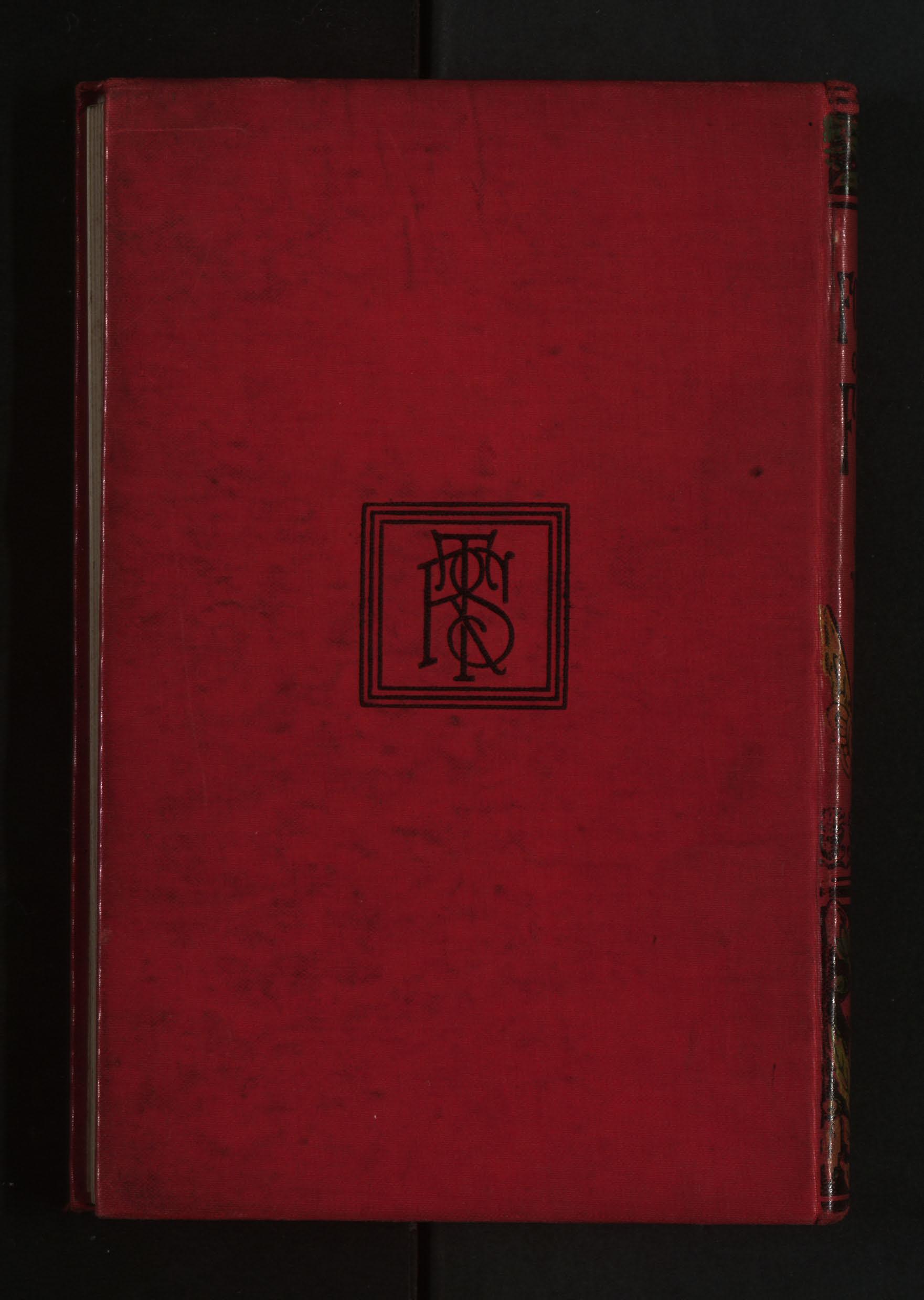
SfJep.mce Mo •• t/dy. Onc ,>c y W"ekly.


SfJep.mce Mo •• t/dy. Onc ,>c y W"ekly.
OWN PAP.ER has had a greater SUCcess than an othel bOys paper of a hIgh class published in England and ylgour of its to say of the Instructiveness of Its arUclch, are a model of what a boy's pt:! d'ca1 ought to be."-Tht FOrlllig/'IJv Rev,61.u. no
fi ';:t appeals directly to every youth, whether he Joves fiction or D e '.1 sports, and has a charm even for boys of a maturer age"- a,!y T.I'gmph.
11 A very ft!ast of good thmg!; "-ChYls tian storehouse of .tmusement and instruction.' -Saturday
As for the tales. tell of travel, sport and adventure all Whrld. Games or kinds are '(vith the careful a entlon tl ey Science and the severer pUJ'suits are by no means neg ected. -Tulll!s.
A ,,,onderful slxpennyworth ·'-Q,,,,u.
Full .of the kllld 01 in wh;ch most dehght."-- School GlI{lYlI,a". J
it !jlmply SpIClldld.h-Wtsterlt PYISS
"',lbose f,arcnts who that their son" sha1l grow U Into ant mell, certainly giv(:Pthem
e QV.s WN AI Jo.R. A most l'Yf'rythlllg to delight the hear f an"Enghsh bOY,call be fouud in itlS pal'es .. -Engl':sh tu
lItf'latl1rt.: It bv treatment of a widC' di\'('I'c.;it
o sC'cuJal':1:1 \VdJ as in a trul\'f ChrIstian 't'Y. _ hYlstUln Lead(!,- spin 111 and playful, though vcr' var'lll f,' manl), bnl\"(.·. honourahlt..·. and 10l m,. InlltatlOIl by th«: growing ;{eneration of Mall
832 'pages With 14 Coloured or Tinted Plates and upwards of 500 \<Vood Engravings /!IN. ill Ila"flIIOJlH' Clot".
PUHLISHED AT 56. PATERNOSTER ROW. LONDON .
i -= An" Sold bv fill Bookseller..
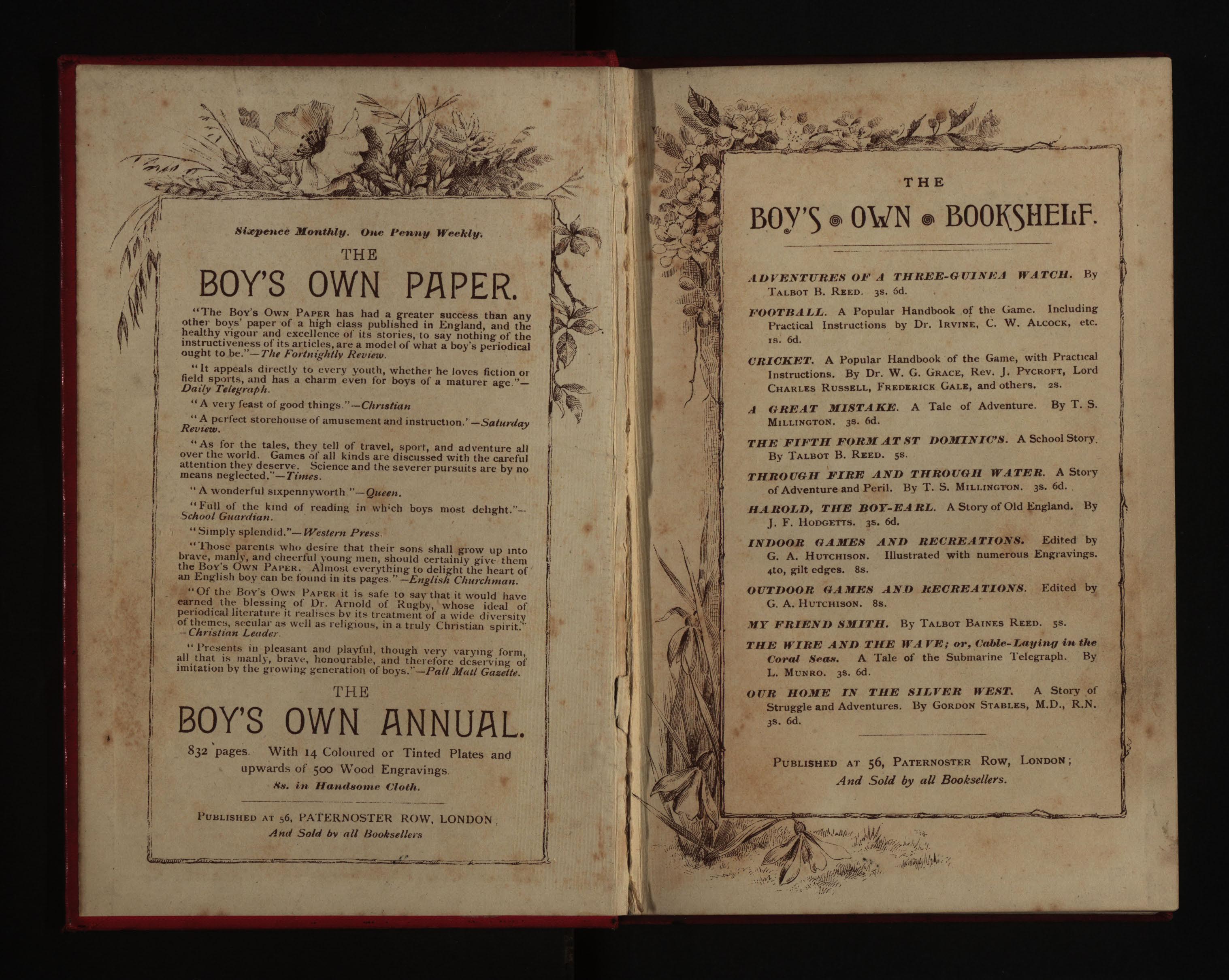
Ol!' A THREE-GtlINE.f WATCH. Ry T ALBOT B. REED. 35. Od.
"'OOTHA LL. A Popular Handbook of the Game. Including Practical Instructions by Dr. lRVINE, C. W. ALCOCK, etc IS. 6<1.
CItICKET. A Popular Handbook of the Game, with Practical Instructions. By Dr. W. G. GRACE, Rev. J. PvCROFT, Lord CHARLES RUSSELL, FREOERICK GALE, and others. 25.
A (JREAT A Tale of Adventure. By T. S. MILLlNGTON. 35. 6d
THE FIFTH AT ST J)OMINIC'S. A School Story. By TALBOT B. REED. Ss.
THROUGH FIRE AND THROUGH W tl.TER. A Story of Adventure and Peril. By T. S. MILI.INGTON. 3S. 6<1 •
HA-BOLD, THE BOY-E.4BL. A Story of Old England. By J. F. HODGETTS. 35. 6<1.
INJ)OOll GAMES AND Edited by G. A. HUTCHlS0N. Illustrated with numerous Engl'avings. 4to, gilt edges. 85.
OUTJ)OOR GAMES AND RECREATIONS. Edited by G. A. HUTCHISON. 8s.
.t1Y FBIEND S.UITH. By TALBoT BAINES REED. Ss. THE WIRE AND THE WA rE; or, ('abl,,-L(lyinU i u tlo" { 'oral Seas. A Tale of the Submarine Telegraph. By L. MUNRo. 3S. 6<1.
()I'R HO.lIE IN THE SILJ'ER WE.'1T. A Story of Struggle and Adventures. By GORDON STABLES, M.D., R.N. 3s 6d
PUBLISHED AT 56, PATERNOSTER Row, LONDON; And Sold by all Booksellers.
Ci'7lili<?:"I,'.',,J'1 . ¥:'1i'!'.'II,
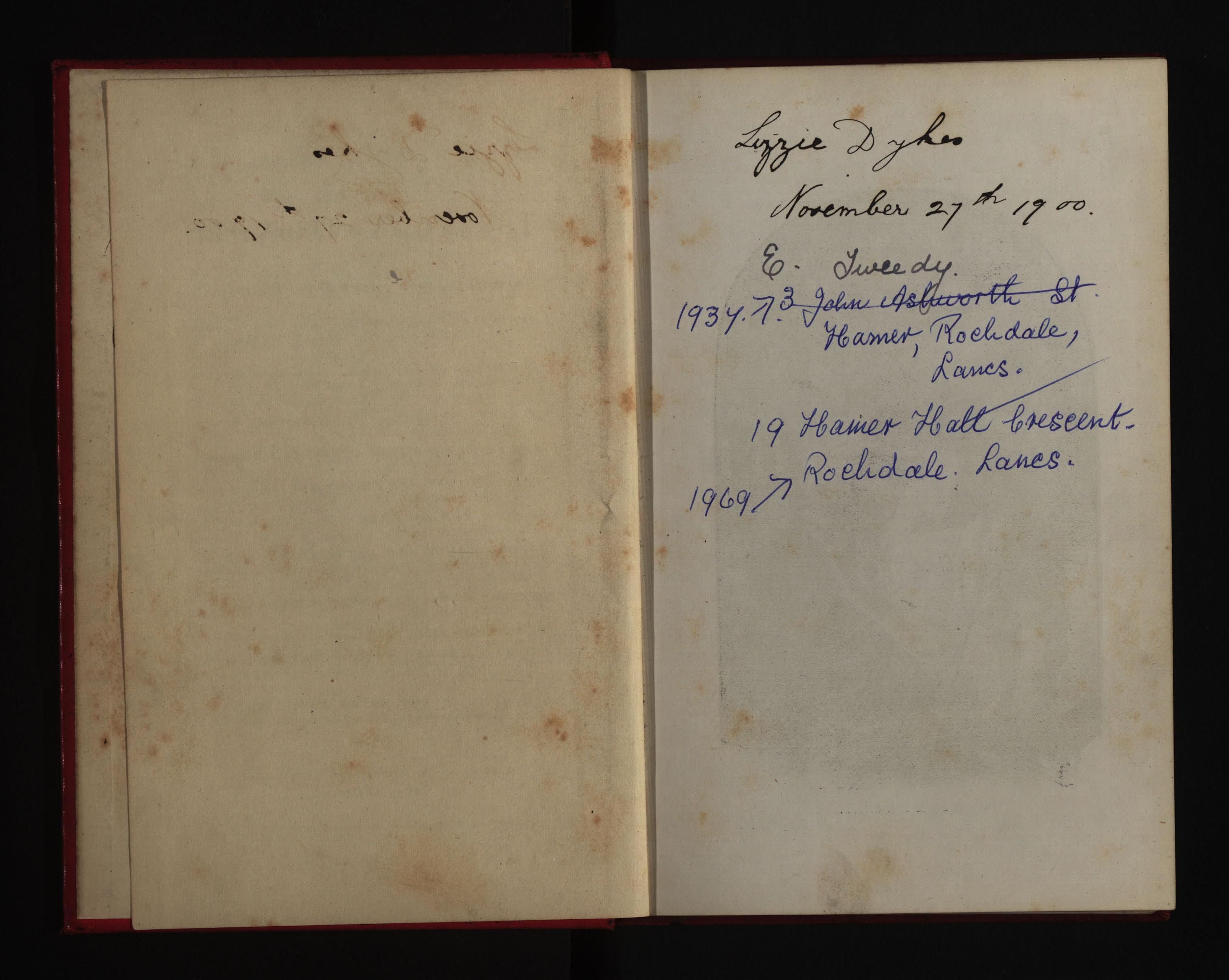
DV FRANCES BROWNE.
Al'l'J[on OF "THE EXILE'S TnUST," "THE NEAREST NEIGHBOUR," ETC.
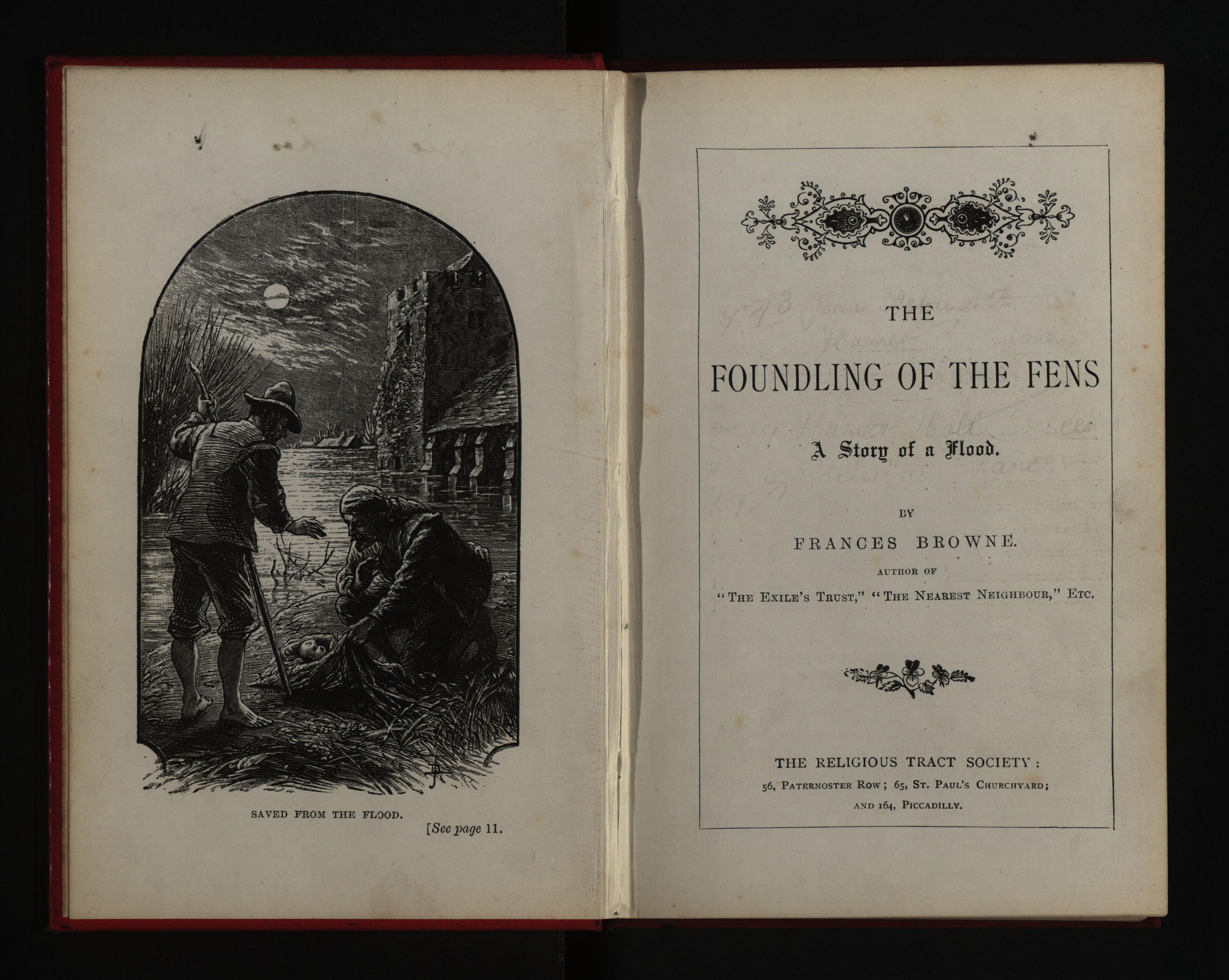
THE RELIGIOUS TRACT SOCIEn': 56, PATERNOSTER Row; 65, ST. PAUL'S CKURCHY.\RD; 16-4, PICCADILLY.
SA VED FROM THE FLOOD.
[See page n.
CONTENTS.
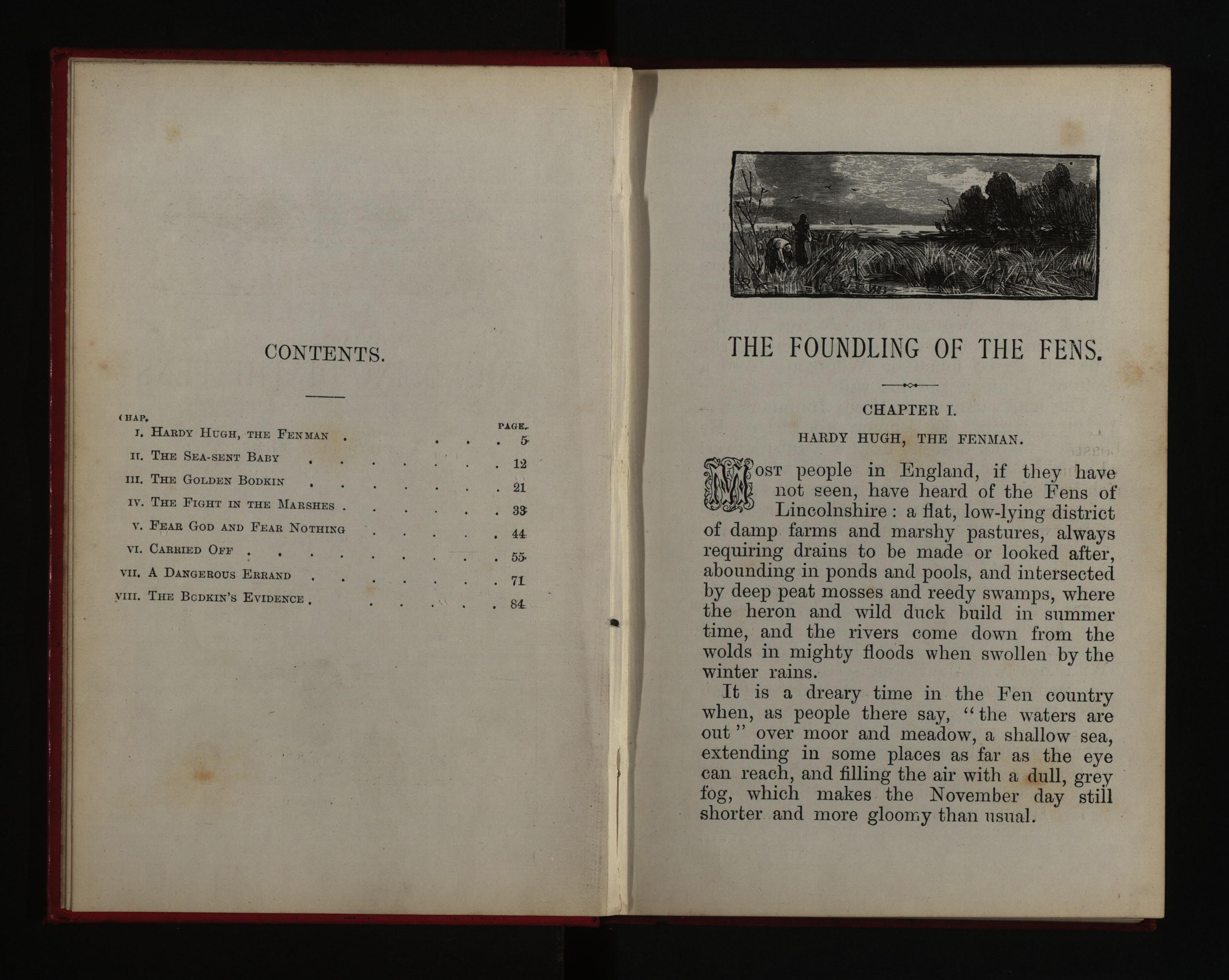
(!fAP.
r. HARDY HUGH, THE FEN MAN
U. THE SEA· SENT BABY
Ill. THE GOLDEN BODKIN
IV. THE FIGHT IN THE MARSHES •
V. FEAR GOD A..';D FEAR NOTHIIW
VI. CARlIIED OFF •
VII. A DANGEROUS ERRAND
VIII. THE BCDKIN'S EVIDENCE.
CHAPTER I.
HARDY HUGH, THE FENMAN.
ROST people in England, if they have not Eeen, have heard of the Fens of Lincolnshire: a flat, low-lying district of damp farms and marshy pastures, always requiring drains to be made or looked after, abounding in ponds an<1 pools, and intersected by deep peat mosses and l'eedy swamps, wh81'e the heron and wild duck build in summer time, and the rivers come down from the wolds in mighty floods when swollen by the winter rains.
It is a dreary time in the Fen country when, as people there say, "the waters are out" over moor and meadow, a shallow sea, extending in some places as far as the eye can reach, and filling the air with a dull, grey fog, which makes the November day still shorter and more gloomy than llsnal.
6
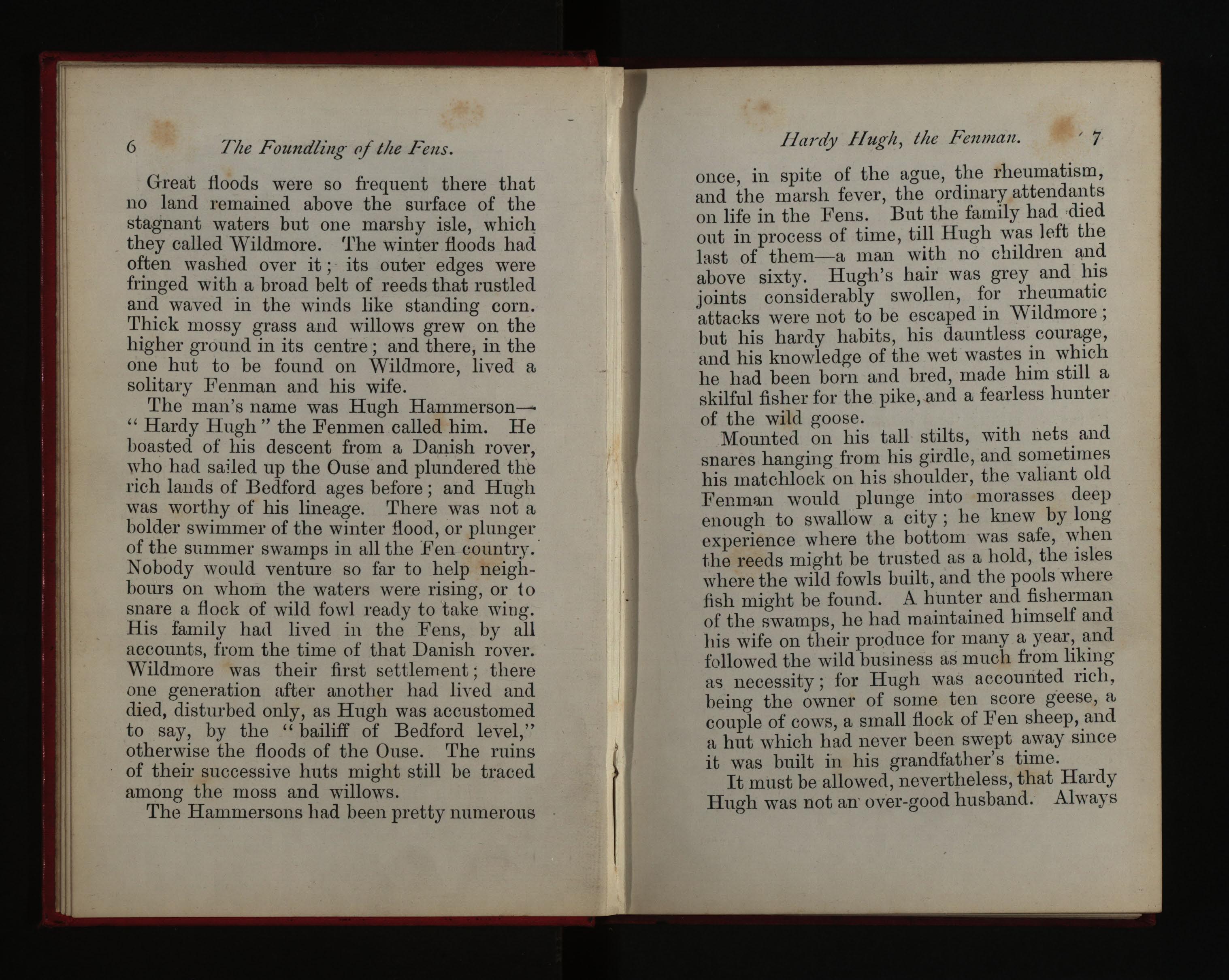
The Fouudlillg- (If the Fells.
Great were so frequent there that no land remamed above the surface of the stagnant wate.rs but marshy isle, which they called WIldmore. 1'he winter floods had often washed over it· its outer edaes were fringed with a broad of reeds rustled waved in the winds like standing corn. mossy grass and willows grew on the hIgher ground in its centre; and there, in the hut to be found on Wildmore, lived a solItary Fenman and his wife.
The man's name was Hugh Hammerson" Hardy Hugh " the Fenmen called him. He boasted of his descent from a Danish rover ':,ho had sailed up the Ouse and plundered lands of ages before; and Hugh "as of his lmeage. There was not It bolder SWImmer of the winter flood, or plunaer of the summer swamps in all the Fen Nobody would venture so far to help neighbours on whom the waters were risin a or to a of wild fowl ready to wing. HIS had li,:,ed in the Fens, by all ac?oul1ts, from the tIme of that Danish rover. WIldmore was their first settlement· there ge.neration after another had. and dIed, dIsturbed only, as Hugh was accustomed to say, by the "bailiff of Bedford level" otherwise the floods of the Ouse. The ruiI;s of their successive huts might still be traced among the moss and willows.
The Hammersons had been pretty numerous
Iiardy fluglz, the Fe1lman. , 7 once, in spite of the ague, the rheumatism, and the marsh fever, the ordinary attendants on life in the Fens. But the family had ,died out in process of time, till Hugh was left the last of them-a man with no children and above sixty. Hugh's hair was grey and his joints considerably swollen, for rheumatic attacks were not to be escaped in Wildmore; but his hardy habits, his dauntless courage, and his knowledge of the wet wastes in which he had been born and bred, made him still a skilful fisher for the pike, and a fearless hunter of the wild goose.
Mounted on his tall stilts, with nets and snares hanging from his girdle, and sometimeFl his matchlock on his shoulder, the valiant ola Fenman would plunge into morasses deep enough to swallow a city; he knew by long experience where the bottom was safe, when the reeds might be trusted as a hold, the isles where the wild fowls built, and the pools where fish might be found. A hunter and fisherman of the Flwamps, he had maintained himself and his wife on their produce for many a year, ancl followed the wild business as much from liking as necessity; for Hugh was accounted I'ieh, being the owner of some ten score geese, It couple of cows, a small flock of Fen sheep, and a hut which had never been swept away since it was built in his grandfather's time. It must be allowed, nevertheless, that Hardy Hugh was not an' over-good husband. Always
8 The Foundlz"ltg of the FeJZs. from home after the pike and the wild-fowl, he left the management of cows, sheep, and p;,eese to his solitary wife-a poor, patient, sICkly woman, whom the neighbours thought "too genteel," because she had been brought up in the town of Ely, and could read; and whom Hugh esteemed but little because though a wife and a good had no chIldren. The Hammerson line must therefore die out, and the hut wbich no flood had swept away go to strangers, At home and abroad he repined over his want of heirs as a lord might do who had broad lands and mansions to leave them. It afforded bim an ,excuse for joining the roystering companies of Fenmen at the fairs of the Lorder towns and ale-houses of the island villages, where like many a foolish man of later times, he drank reason away under, pretence of forgetting his tr?uble. Hugh rmght have had heirs by adoptIOn: tbere were poor families who could have spared some to so rich an inheritance; and the floods made many a widow and orphan in the Fens.
"But. no," said Hugh, "nobody's cbild shall for my house my gatherings, and WIsh for the old man's gomg all the while' since I haven't a true Hammel'son to leave it to, let the ruffs and reeves get it, for aught I .care, when the old woman and I are gone." Hugh was not the man to change his mind Dn that or any other subject; yet Providence
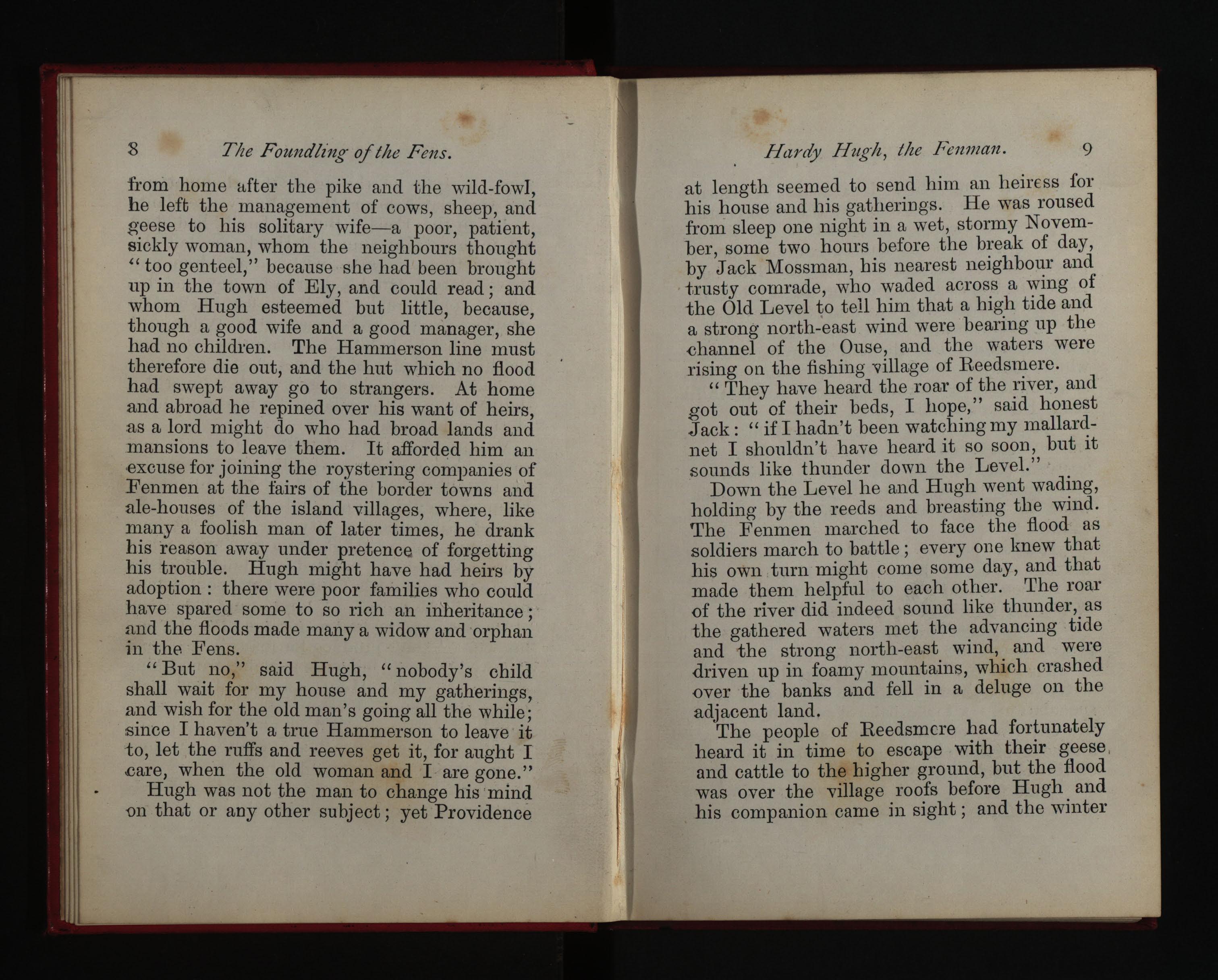
HlX1' dy Hugit, the Feuman. 9 at length seemed to send him an heirEss for his house and his gatherings. He was roused from sleep one night in a wet, stormy N ovember some two hours before the break of day, by 'Jack Mossman, bis nearest and t.rusty comrade, who waded acros,s a of the Old Level to tell him that a blgh tIde and a strong north-east wind were bearing up the -channel of the Ouse, and the waters were rising on the fishing village of Reedsmere.
" They have heard the roar !iver, and got out of their beds, I saId honest Jack: "if I hadn't been watchmg my 11et I shouldn't have heard it so soon, but It sounds like thunder down tbe Level."
Down the Level he and Hugh went wR.ding, holding by the reeds and breasting the wind. The Fenmen marched to face the flood as soldiers march to battle; everyone knew that his own turn might come some day, and that made them helpful to each other. The roar of the river did indeed sound like thunder, as the gathered waters met the ,advancing tide and the strong north-east wmd, and were driven up in foamy mount,ains, which crashed over the banks and fell m a deluge on the adjacent land.
The people of Reedsmcre heard it in time to escape WIth theIr geese :md cattle to the higher ground, but the flood was over the village roofs before Hugh. and his companion came in sight; and the wmter
The Foundling of the Fens.
moon breaking throngh a mass of stormy showed them tide was bearing III ple?eS wreck-It mIght be of fishing b?ats, It mIght be of some great ship gone to out at sea, fO!" the gale had been hIgher m the earl:r part of the night; but the were floatmg away up the Level with the nUage huts and furniture' nothing seemed to stand but the old through wInch n;tany a flood had swept since it had been bUIlt by a Norman mason in the third King Edward's time.
".Jack," said Hugh, as he and his COillpaJlIOn surveyed the desolation from the . the ridge of a mossy rock hIgh above the swamp, "Jack, what IS that, that has stuck in the east 'window ? " .
"It's a. bundle:--a bale of goods, I'll warrant-sllk or llllen n.-om Holland; om' oI.d. give something for the inside of It; but It IS too far to swim for."
"It's a queer ?undle," said Hugh, "and moyes about as If there was life in it I) as another gleam of the moon lit up the waters, sbowed him the subject of speculatIOn. A loose bale of cloth it seemed the of which were loosening away and some of them had caught on the stanchions of th6 ohurch window.
"Wait for me here, Jack-I'll see what it is! something tells me I ought," said the
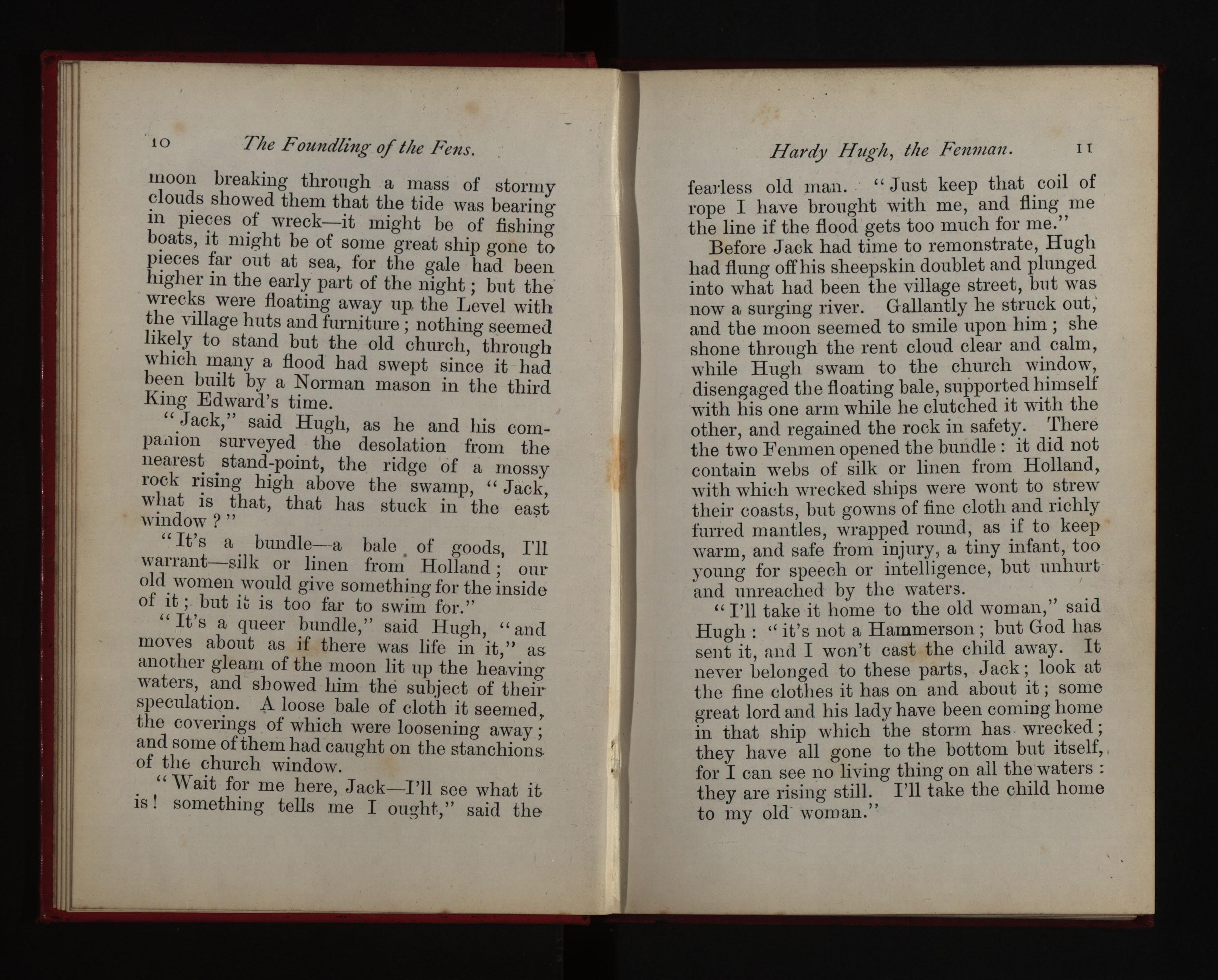
Hardy Hug'h, the Fe1t1ltan. 11
fearless old man. "Just keep that .coil of rope I have brought with me, and flmg"me the line if the flood gets too much for me.
Before Jack had time to remonstrate, H ugb had flung offhis sheepskin. doublet and plunged into what had been the VIllage street, but was now a surging river. Gallantly he out; and the moon seemed to smile upon hIm; she shone through the rent cloud clear and. calm, while Hugh swam to the church disengaged the floating bale, with his one arm while he clutched It WIth the other, and regained the rock in the two Fenmen opened the bundle: It dId not contain webs of silk or linen from Holland, with whieh wrecked ships were wont to their coasts but O"owns of fine cloth and rIchly furred mantles, round,. as to keep warm and safe from injury, a tllly mfant, too young for speech or intelligence, but unhurt and unreached by the waters. ".
" I'll take it home to the old woman, saul Hugh: "it's not a Hammerson;. but God has sent it, and. I won't cast the chIld away. It neyer uelonged to these parts, Jack;. look at the fine clothes it has on a,nd about some great lord and lady have been comlD? in that ship whICh the storm has wre?ked, they have all gone to the bottom but Itself, for I can see no living thing on all waters: they are rising still. I'll take the chIld home to myoId ' woman."
The F02t1tdlzilg 0./ the Fells.
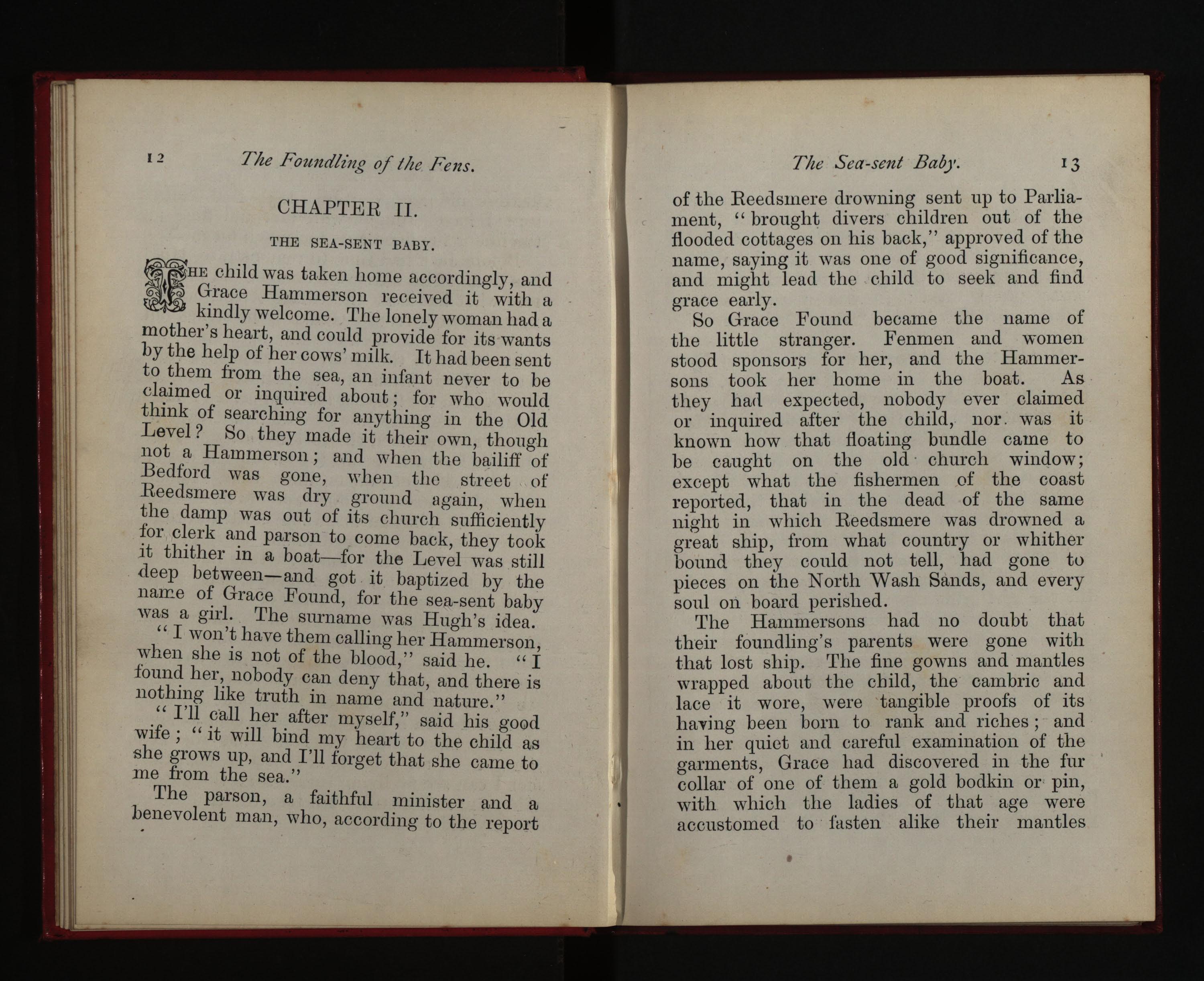
*THE SEA-SENT BABY.
DHE child was taken home accordingly, and
Grace Hammerson received it with a kindly welcome. The lonely woman had a mother's heart, and could provide for its wants by the help of her COWS' milk. It had been sent to them from the sea, an infant never to be or inquired about; for who would thmk of searching for anything in the Old Level? So they made it their own, though not a Harnmerson; and when the bailiff of Bedford was gone, when the street of Reedsmere was dry ground again when the damp was out of its church sufficiently aJ?-d parson to come back, they took lt thIther m a boat-for the Level was still deep between-and got it baptized by the na:r:c.e Grace Found, for the sea-sent baby a gIrl. The surname was Hugh's idea. I won't have them calling her Hammerson she is not of the blood," said he. " i her,. nobody can deny that, and there is llothmg lIke truth in name and nature"
." 1'1:, ?all .her .after myself," said his' good wIfe; It wIll bmd my heart to the child as she grows up, and I'll forget that she came to me from the sea."
The parson, a faithful minister and a b.enevolent man, who, according to the report
The Sea-sent Baby. 13 of the Reedsmere drowning sent up to Parliament "brought divers children out of the cottaaes on his back," approved of the name, sayingOit was one. of good significance, and might lead the chlld to seek and find grace early.
So Grace Found became the name of the little stranger. Fenmen and women stood sponsor,s for her, and the Hammersons took her home in the boat. As they hall expected, ever claime.d or inquired after the chlld, nor, was It known how that floating bundle came to be caught on the old , church window; except what the fishermen of the coast reported, that in the dead of the same niaht in which Reedsmere was drowned a ship, from what country or whither bound they could not tell, had gone to pieces on the North Wash Sands, and every soul on board perished.
The Hammersons had no doubt that their foundling's parents were gone with that lost ship. The fir:e gowns and rr;tantles wrapped about the chIld,. the cambrIC lace it wore were tangIble proofs of ItS ha"ing been horn to rank ri?hes; and in her quiet and careful. of the garments Grace had dIscovered 111 the fur collar of' one of them a gold bodkin or ' pin, with which the ladies of that age were accustomed to fasten alike their mantles •
The FOlmd!£1lg 0/ the Fens.
their. hair. head was beautifully III the form of an opening lily, sparks of topaz for the yellow seeds wIthm, and on the under side there was clearly engraved, though in so small a space, some noble crest: it was a hand and a with this motto, "Fear God and fear nothing."
better education and bringing up in Ely whICh, though an isle of the Fen country had ?een long a bishop's see and a town of Importance, Grace to understand the value of the Je,wel than an ordinary Fen She Judged It to be a family heirloom madvertently wrapped up with the child iI{ that hour of and peril, perhaps to be the proof of her hIgh descent in after time' and she that neither Hugh nor anybody but t!:w mInIster should ever see or heal' of it
Its sa.fe keeping might not be endangered the. gIrl Wew up.
It IS a WIse and honest resolution," said parson,. consulted on the subject in Ins fi.rst VISIt to Wildmore-the good man contnved to see most of his parishioners once a ,Year the help of boats and stIlts- It IS a WIse and honest resolution' that may be the instrument ProvIdence means to open the chIld's way to a fair inheritance. It was not by chance it came into that fur collar or into your hands, good Dame Hammerson;
•
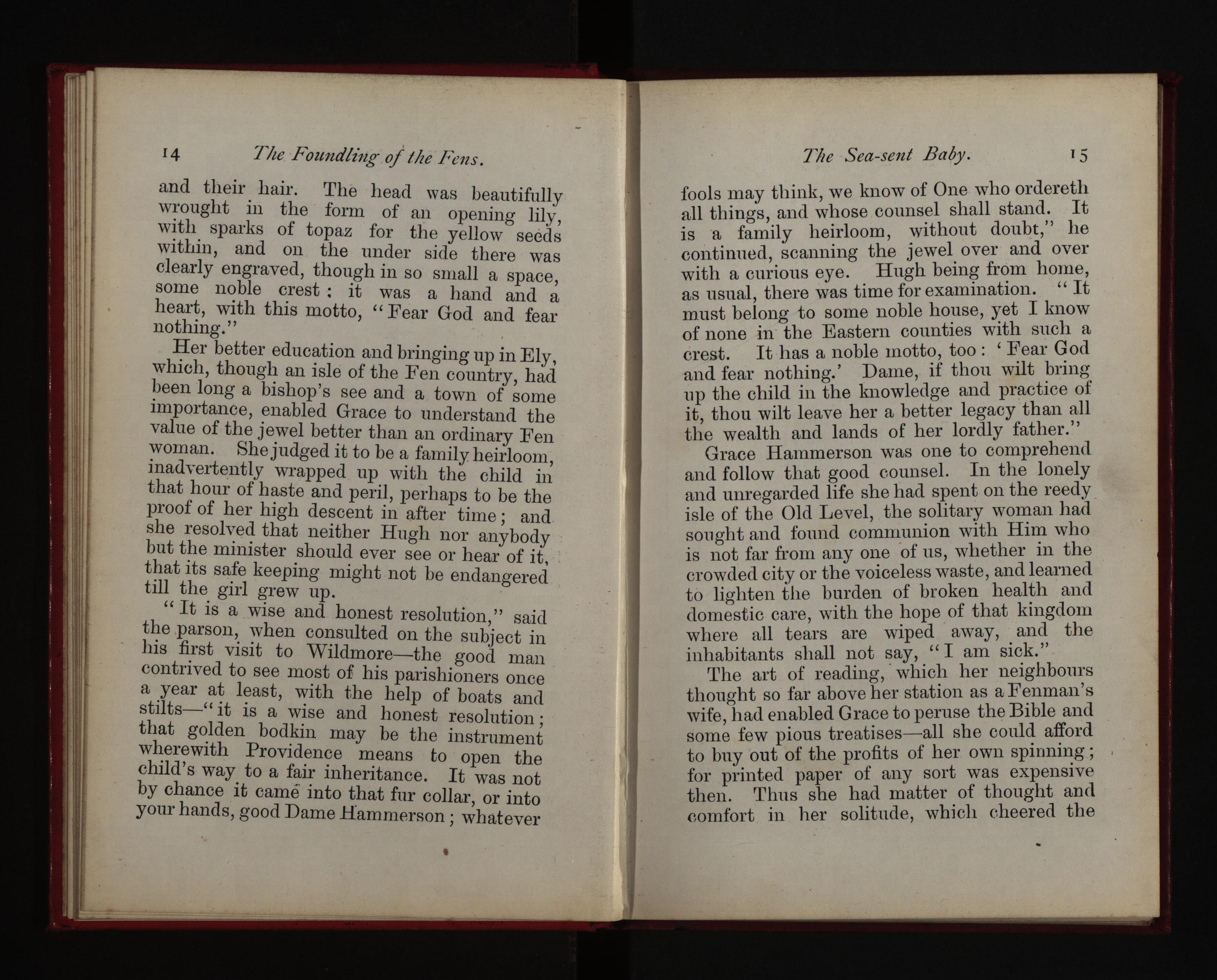
The Sea-sent Baby. T5
fools may think, we know of One who ordereth all things,. and shall stand;, It is a family heirloom, WIthout doubt, he continued scanning the jewel over and over with a cu;ious eye. Hugh being from home, as usual there was time for examination. " It must beiong to some noble ho:use, I know of none in the Eastern counties WIth such a crest. It has a noble motto, too: 'Fear God and fear nothing.' Dame, if thou wilt up the child in the knowledge and practICe of it thou wilt leave her a better legacy than all tl{e wealth and lands of her lordly father."
Grace Hammerson was one to comprehend and follow that good eounsel. In the lonely and unregarded life she had spent on the reedy isle of the Old Level, the solitary woman had sought and found commuI?-ion with who is not far from anyone of us, whethm' 111 the crowded city or the voiceless waste, and learned to liahten the burden of broken health and care, with the hope of that kingdom where all tears are wiped away, and the inhabitants shall not say, "I am sick."
The art of reading, ' which her neighbours thouaht so far above her station as a Fenman's wife,flhad enabled Grace to peruse the Bible and some few pious treatises-.all she to buy out of the profits of her own ; for printed paper of any sort was expenSIve then. Thus she had matter of thought and comfort in her solitude, which cheered the
16
The .Foundliug o.f the Pens.
dull, grey days of the Fenland summer and gave her heart strength aaainst the storms. n
. minister went home to help in the rebUlldmg of his parsonaae Th getting it np, like the other °h;uses ;1 mere, on the old ground, for such floods did not happen than once in fifty years. Hug.h went on' accustomed way-fishing frequentmg and alehouse maki,ngs, knowmg nothing of the gold bodkm, whICh llis wife had hidden awa in deepest corner of the chest she bro!ght wIth her from. Ely, containing her dowry of pewter and lmen, and of which she alone kept the key.
" If that child had been a boy" H h would say to his boon companions :, h at the net and gun I would havew;ad: hIm. But there is no such luck for a man ?owsoevel', the girl will grow to be com an . fo:' the old woman when I am out baggin: wIdgeons: If she ?ehaves well and marries to my mmd, I won t say she shan't get the house and the gatherings, too; bnt that's a look forward, you see."
The. child. grew and prospered, in spite of the mIsty an', and cold, damp climate' it is Ul?-der what adverse circumstances young life wIll flourish. The baby that had escaped the ocean stqrm and rivel' flood grew large, strong, and intelligent, among the reeds
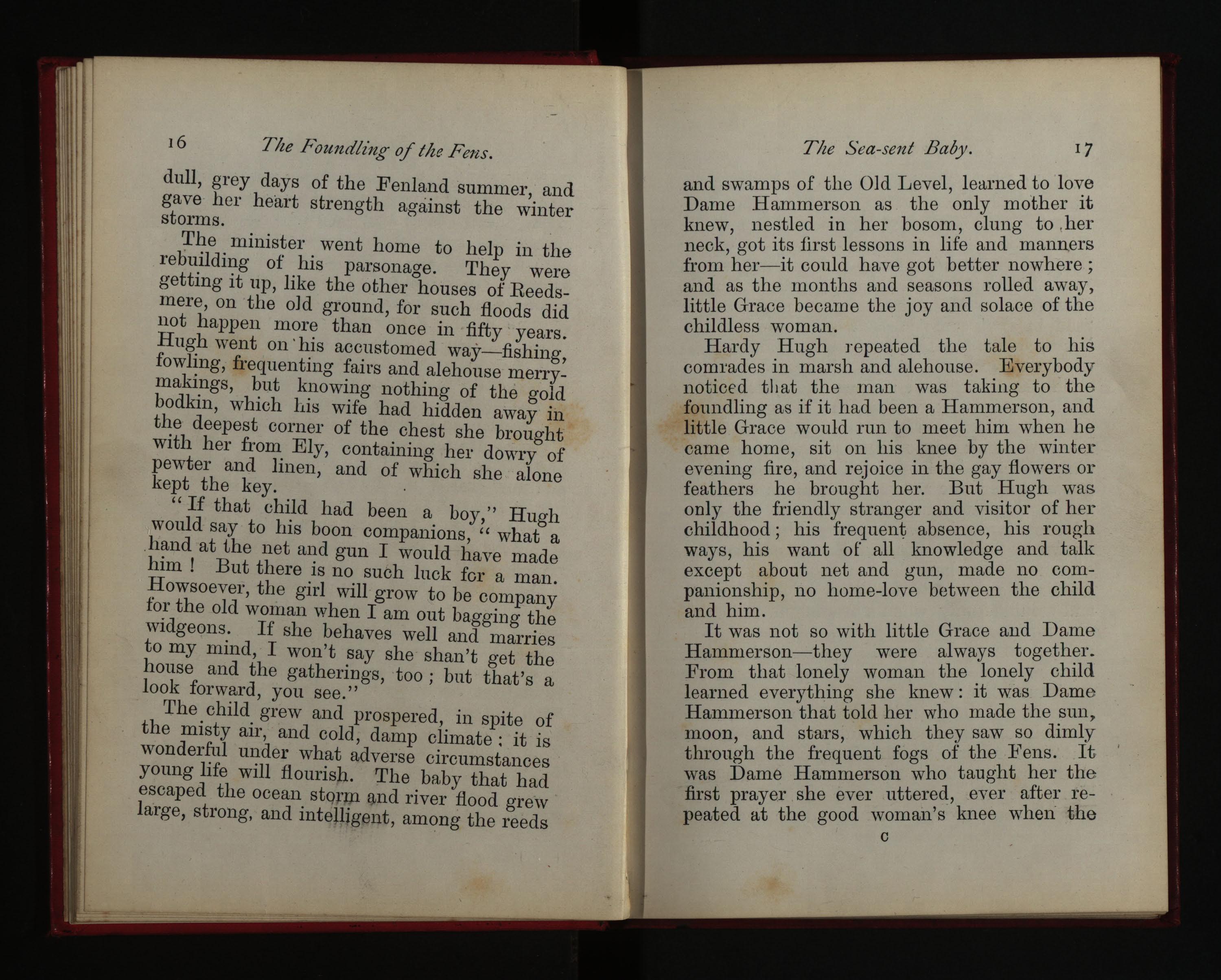
The Sea-sent Baby.
and swamps of the Old Level, learned to love Dame Hammerson as the only mother it knew, nestled in her bosom, clung to .her neck, got its first lessons in life and manners from her-it conld have got better nowhere; and as the months and seasons rolled away, little Grace became the joy anc1 solace of the childless woman.
Hardy Hugh repeated the tale to his comrades in marsh and alehouse. Everybody noticed tll at the man was taking to the foundling as if it had been a Hammerson, and little Grace would run to meet him when he came home, sit on his knee by the winter evening fire, and rejoice in the gay flowers or feathers he brought her. Bnt Hugh was only the friendly stranger and visitor of her childhood; his frequent absence, his rough ways, his want of all knowledge and talk except about net and gun, made no companionship, no home-love between the child and him.
It was not so with little Grace and Dame Hammerson-they were always together. From that lonely woman the lonely child learned everything she knew: it was Dame Hammerson that told her who made the sun, moon, and stars, which they saw so dimly through the frequent fogs of the :Fens. It was Dame Hammerson who taught her the first prayer she ever uttered, eyer after repeated at the good woman's knee when the c
The Fou1zdlz"lzg of the Fens. twiliaht fell upon them in the one cottage of that island. It was Dayle Hammerson too who first told bel' stones out of the Bible when they sat together by winter fire, and the roaring wind and ruslllng waters made the child's heart quake; and, at length, it was Dame Hammerson who taught her to read in that same blessed book, and pointed her thoughts to Him who said, c. Suffer little children to come unto
In useful work, in serious thought, and in kindly lovin a intercourse, the days and years passed' on. :) Dame Han:me.rson found hei: reward ah'eady on thIs sIde of tIme; the child she trained so well and wisely had grown to be act.i ve and zealous in all domestIC dutIes, many and labonous as they were in Wildmore. She had also grown to be her blithe and fond companion, attached to her like a true and loving daughter anxious to fulfil her slightest wish, and troubled only when she was out of health or spirits. . .
The solitary cottage III the Fen Island had become a pleasant place, though its master continued his roving ways, and could seldom be induced to go with them to Reedsmere Church on summer Sundays. When the waters were out, which often happened after summer rain, there was no going withou( him; for the passage had to be made in Hugh's boat, except Jack .Mossman, or some
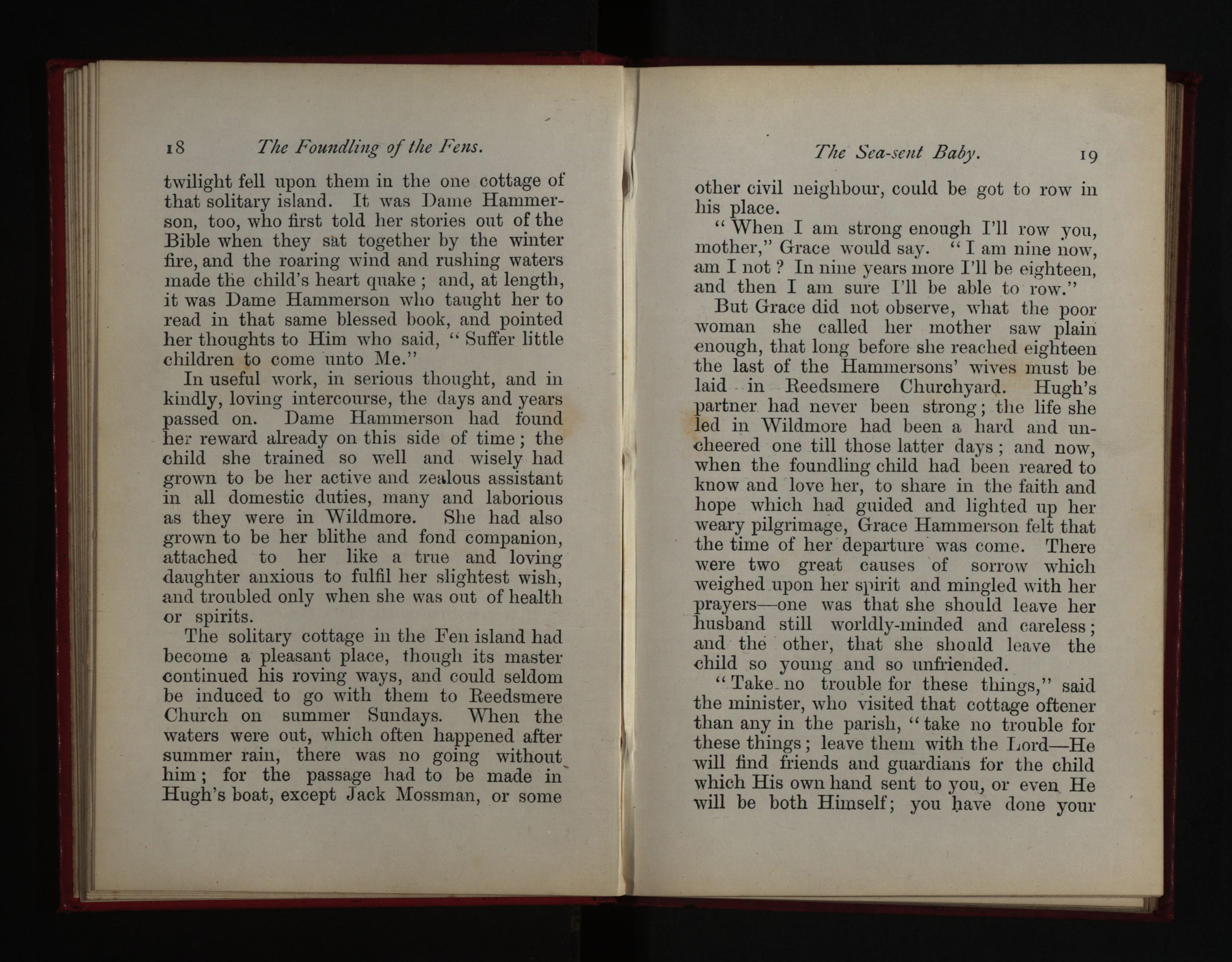
The S ea- sent Baby. 19 other civil neighbour, could be got to row in his place.
" When I am strong enough I'll row you, mother," Grace would say. " I am nine now, am I not? In nine years more I'll be eighteen, and then I am sure I'll be able to row."
But Grace did not observe, what the poor woman she called her mother saw plain enough, that long before she reached eighteen the last of the Hammersons' wives must be laid in Reedsmere Churchyard. Hugh's partner had never been strong; the life she led in \Vildmore had been a hard and uncheered one till those latter days; and now, when the foundling child had been reared to know and love her, to share in the faith and hope which had gnided and lighted up her weary pilgrimage, Grace Hammerson felt that the time of her departure was come. There were two great causes of sorrow which weighed upon her spirit and mingled with her prayers-one was that she should leave her husband still worldly-minded and careless; and the other, that she shoLlld l eave the child so young and so unfriended.
" Take _ no trouble for these things," said the minister, who visited that cottage oftener than any in the parish, "take no trouble for these things; leave them with the IJord-He will find n:iends and guardians for the child which His own hand sent to you) or even He will be both Himself; you have done your
20
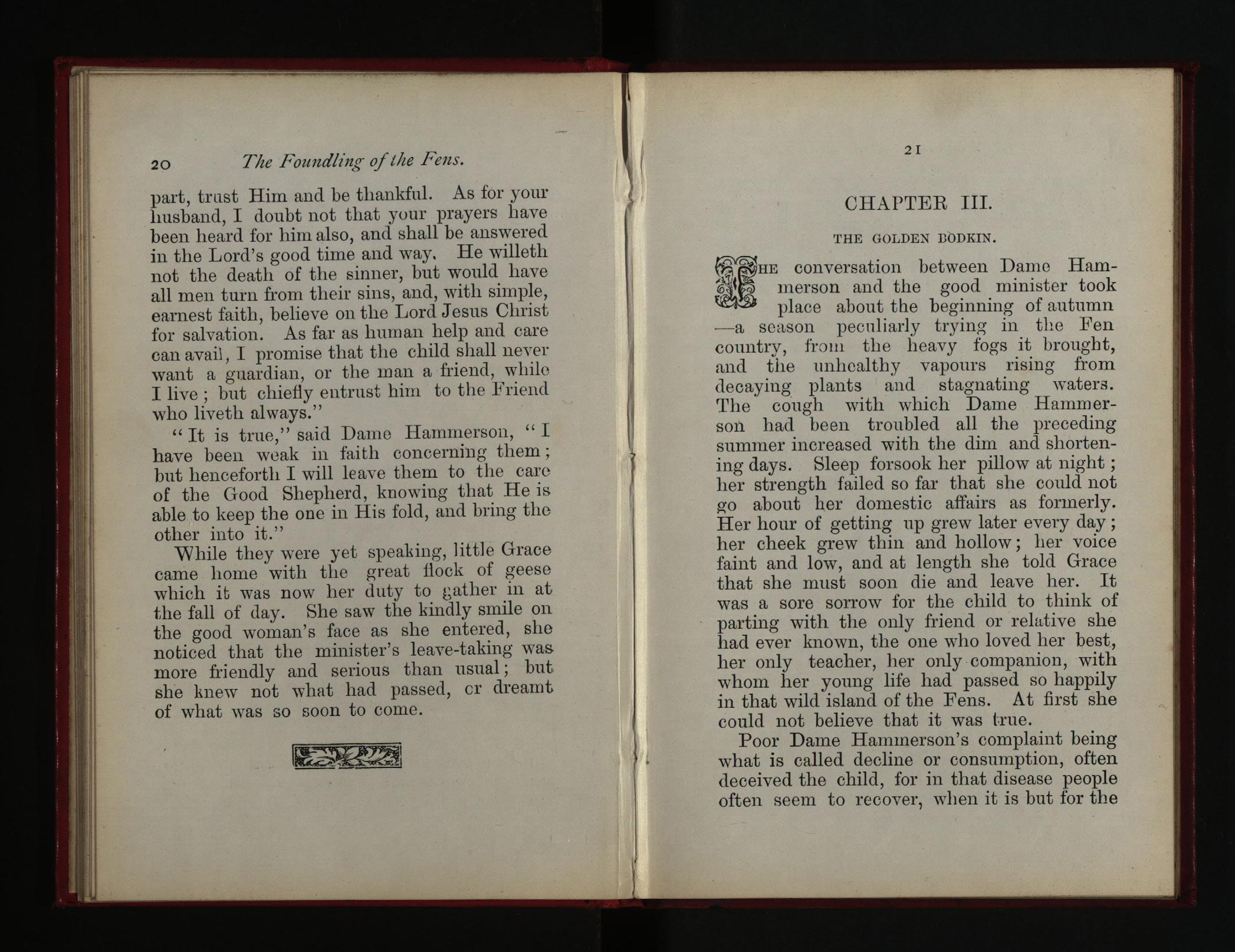
The Foundling- of the Fms.
part, trnst Him and be thankful. As for your husband, I doubt not that your prayers have been heard for him also, and shall be answered in the Lord's good time and way. He willeth not the death of the sinner, but would have all men turn from their sins, and, with simple, earnest faith, believe on the Lord Jesus Christ for salvation. As far as human help and care can avail, I promise that the child shall never want a guardian, or the man a friend, while I live; but chiefly entrust him to the Friend who liveth always."
"It is true," said Dame Hammerson, "I have been weak in faith concerning them; but henceforth I will leave them to the care of the Good Shepherd, knowing that He is able to keep the one in His fold, and bring the other into it."
While they were yet speaking, little Grace came home with the great flock of geese which it was now her duty to gather in at the fall of day. She saw the kindly smile on the good woman's face as she entered, she noticed that the minister's leave-taking was more friendly and serious than usual; but she knew not what had passed, cr dreamt of what was so soon to come. 21
THE GOLDEN DODKIN.
aHE conversation between Dame Ham• merson and the good minister took place about the beginning of autumn -a sea,son pecnliarly trying in the Fen country, frol11 the heavy fogs it brought, and the unhealthy vapours rising from decaying plants and stagnating waters. The cough with which Dame Hammerson had been troubled all the preceding summer increased with the dim and shortening days. Sleep forsook her pillow at night; her strength failed so fal' that she could not go about her domestic affairs as formerly. Her hour of getting up grew later every day; her cheek grew thin and hollow; her voice faint and low, and at length she told Grace that she must soon die and leave her. It was a sore sorrow for the child to think of parting with the only friend or rebtive she had ever known, the one who loved her best, her only teacher, her only companion, with whom her young life had passed so happily in that wild island of the Fens. At first she could not believe that it was t,rue.
Poor Dame Hamlllerson's complaint being what is called decline or consumption, often deceived the child, for in that disease people often seem to recover, when it is but for the
22
The Found!z'11l{ of the Fens. time ; and the good woman spoke so gladly and hopefully of her departure, so much like one who was only going before her to a better country, where they should soon meet again, that though Grace felt ready to break her heart when she looked on the kindly but wasted face, and thought of it being covered by the churchyard sod, the parting did not seem final; her mother was going away from her, but not for eyel..
The child a brave spirit, too, and would not disturb or sadden the sick woman with her grieving. Grace wept in corners and out of doors far more than her mother knew; but when Dame Hammerson's cough and weakness would allow, their talk was pleasant, though serious; and the care and kindness ,,,hich the woman had shown to her help. less infancy was returned by the gentle, actiye little girl in those days of last sickness. Grace was almost the only help and comfort Dame Harnmerson had. The Fen women were far had families of their own, and were but rough and careless friends at the best.
Hardy Hngh was by nature rugged and impatient; he could l'escue a family from the rising flood, or pilot a boat in the storm; but for gentle and homely offices the man had neither hand nor heart. He cared little for his wife; he had seen her so long in bad health that her sickness did not alarm him;
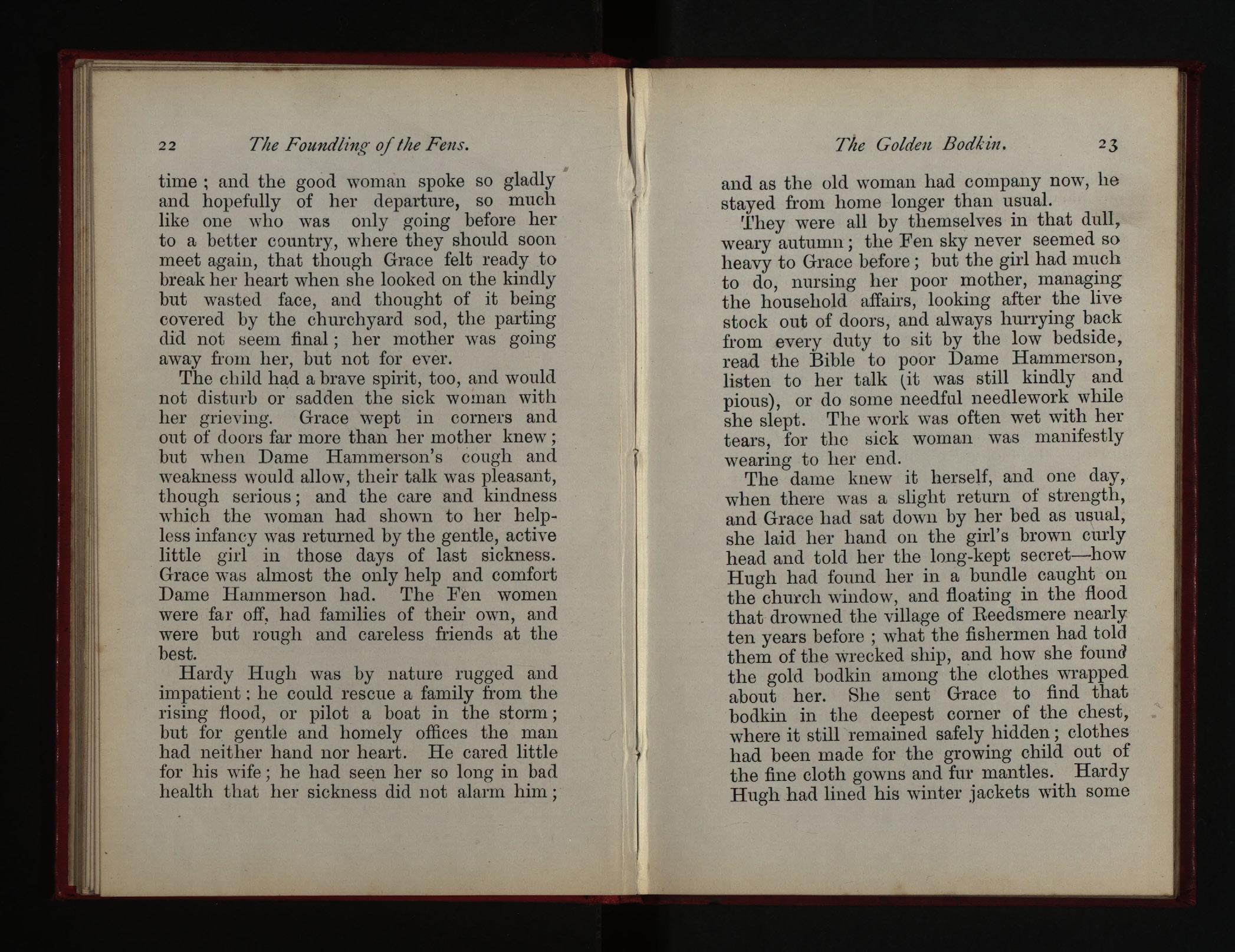
The Golden B od!.: ill.
and as the old woman had company nmv, he stayed from home longer than usual.
'rhey were all by themselves in that dull, weary autumn; the Fen sky never seemed so heavy to Grace before; but the girl had to do nursing her poor mother, managmg the affairs, looking after the live stock out of doors, and always hurrying back from every duty to sit by the low bedside, read the Bible to poor Dame Hammerson, listen to her talk \it was still kindly aJ?-d pious), or do some needful whIle she slept. The work was often wet her tears for the sick woman was mamfestly , wearing to her encl.
The dame knew it herself, and one day, when there was a slight return of strength, and Grace had sat down by her bed as usual, she laid her hand on the girl's brown curly head and told her the long-kept secret-how Hugh had found her in a caught on the church window, and floatmg m the flood that drowned the village of Reedsmere nearly ten years before; what the fishermen had told them of the wrecked ship, and how she found the gold bodkin among the clothes wrapped about her. She sent Grace to find that bodkin in the deepest corner of the chest, where it still remained safely hidden; clothes had been made for the growing child out of the fine cloth gowns and fur mantles.. Hardy Hugh had lined his winter jackets WIth some
The Foztndlz"ng of the Fens. of them. Grace remembered to have seen and marvelled at the remnants in earlier days, and guessed that she was not the Hammersons' child, for people called her Grace Found. But gossip was thinly spread, and could not be easily gathered in the Fens; so Grace had neyer heard, the tale of her own coming to Wlldmore tlll Dame Hammerson told her in days, and warned her to keep the bO,dkin stnctly and secretly, lest its value mIght tempt somebody to rob her of it, or even Hugh to sell it in some of the fairs.
" Never part with it if you can help it, Grace," she said, pointing out the crest and motto, "it belongs to the family from which you are descendec1; it may be the means of your finding friends and relatives of we'llth and rank far higher than ours; and if it is not in the ordering of Providence that you should come to be owned by such, keep it as a memorial of your wonderful preservation from the drowning waters, and let the motto inscribed on it be the guide of your life-' Fear God and fear nothing.'"
Grace promised faithfully to follow those wise counsels, never to part with the bodkin and always keep it hidden, that nobody might steal or covet it on account of the price so much gold would bring. That was their last conversation of any length.
Hardy Hngh came home the same evening after a fortnight's absence. He seemed
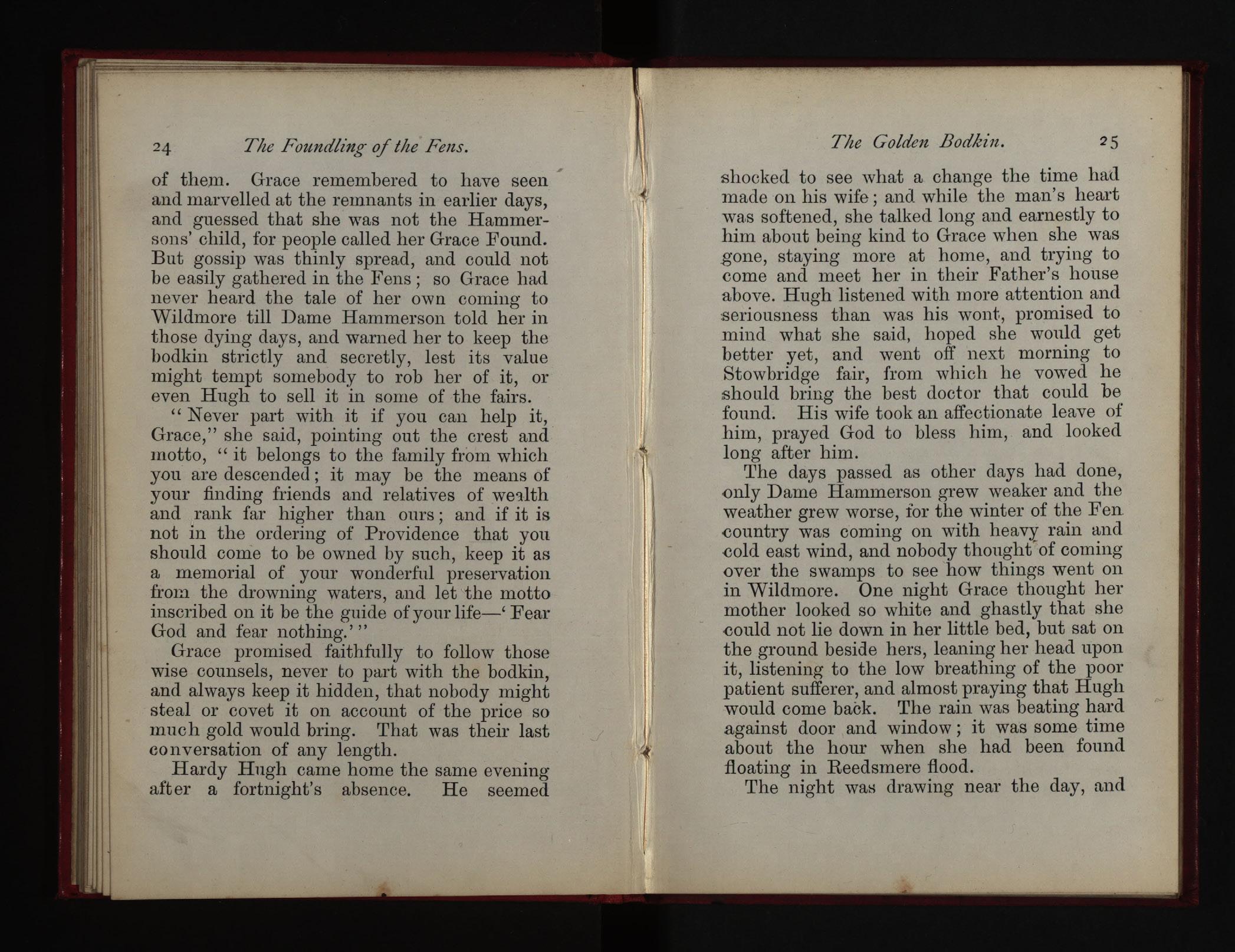
The Golden Bodkin.
shocked to see what a change the time had made on his wife; and while the man's heart wa,s softened, she talked long and earnestly to him about being kind to Grace when she was gone, staying more at home, and trying to come and meet her in their Father's house above. Hugh listened with more attention and seriousness than was his wont" promised to mind what she said, hoped she would get better yet, and went off next morning to Stowbridge fair, from which he vowed he should bring the best doctor that could be found. His wife took an affectionate leave of him, prayed God to bless him, and looked long after him.
The days passed as other days had done, only Dame Hammerson grew weaker and the weather grew worse, for the winter of the Fen (lountry was coming on with heavy rain and (lold east wind, and nobody of coming over the swamps to see how things went on in Wildmore. One night Grace thought her mother looked so white and ghastly that she (lould not lie down in her little bed, but sat on the ground beside hers, leaning her head upon it, listening to the low breathing of the poor patient sufferer, and almost praying that Hugh would come back. The rain was beating hard against door and window; it was some time about the hour when she had been found floating in Reedsmere flood.
The night waH drawing near the day, and
The Foundling of the Fells.
Grace was tired with work and watching, so in spite of fear and sorrow the weary child dropped to sleep. But in that sleep she felt a hand laid kindly on her curly head, and a, low voice saying, "Fal'ewell, my child; the Lord to whom I go be with you! "
She started up, clasped the thin hand, and looked into her mother's face: the eyes looked kindly on her for a moment: there were loye and joy and blessing in them, then they closed for ever on this troubled and transitory life, and with a long sigh the liberated sou.l departed to its everlasting rest.
Oh the grief and terror of the pOOl' desolate child, left alone with the dead in that wintry night, and wild, solitary island. Long as she had watched and wept by that sick ted, Grace felt as if every hope and hold had gone from her heart with the departed spirit. She wept long and wildly as the outer storm, till better wiser thoughts came. She l'emembered the gentle admonition so often given her not to sorrow as one without hope; she prayed for strength to bear her lonely lot, and for grace to live and die as her mother had done.
Grace was kneeling still beside the deacl when daylight broke, and Hardy Hugh came back from Stowbridge fair. He had travelled all night through the storm, as if haunted by some foal' of what was happening at home; and when his first look fell on his wife's face, now composed in the everlasting calm of
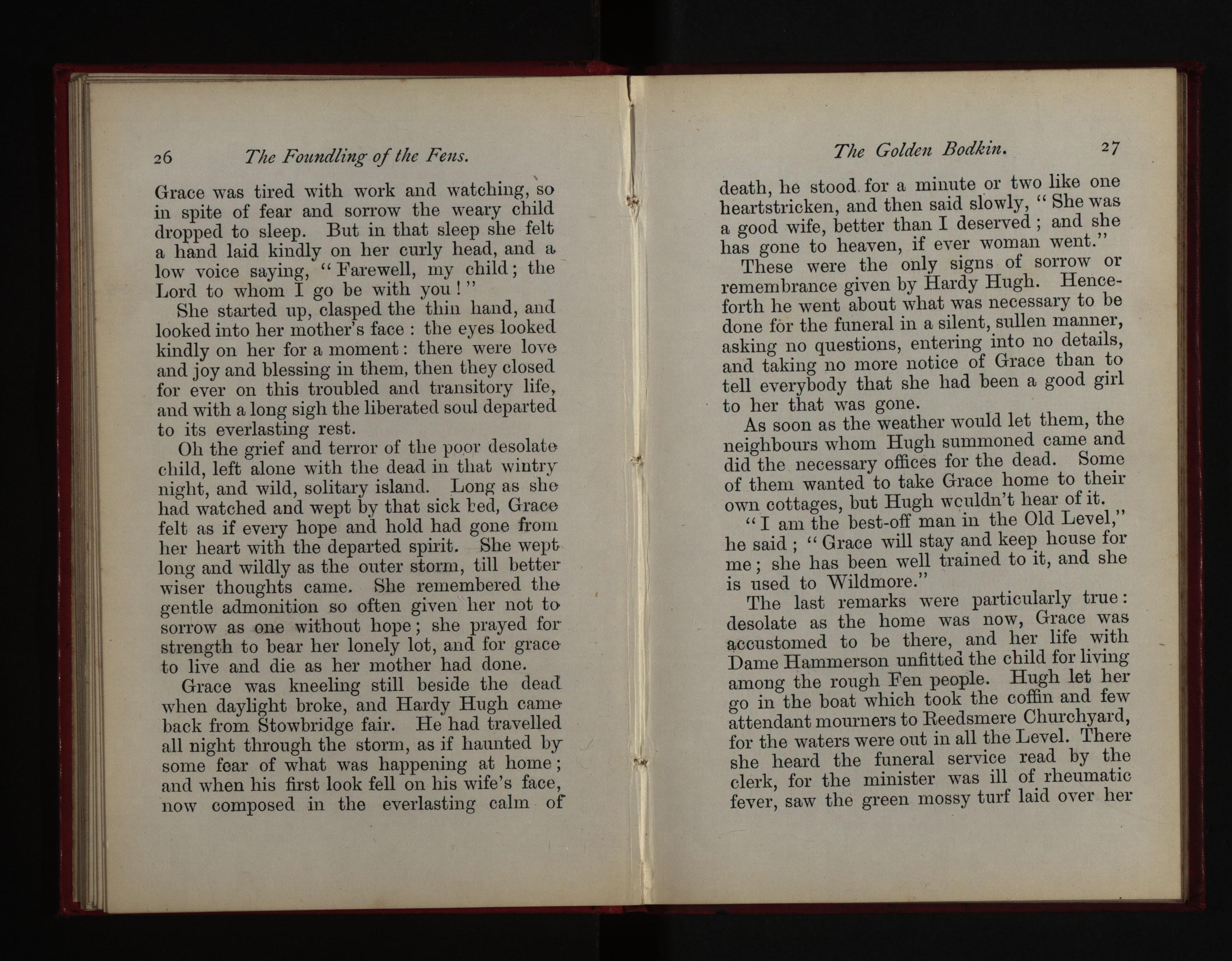
death he stood for a minute or two like one , . heartstricken, and then said slowly, " She was a good wife, better than I deserved; and she has gone to heaven, if ever woman went."
These were the only signs of sorrow or remem brance given by Hardy Hugh. Henceforth he went about what was necessary to be done for the funeral in a silent, sullen manner, asking no questions, entering into no details, and taking no more notice of Gl'ace than to tell everybody that she had been a good girl to her that was gone.
As soon as the weather would let them, the neighbours whom Hugh summoned came and did the necessary offices for the dead. Some of them wanted to take Grace home to their own cottages, but Hugh wculdn't hear of it.
"I am the best-off man in the Old Level," he said; "Grace will stay and keep house for me; she has been well trained to it, and she is used to Wildmore."
The last remarks were particularly true: desolate as the home was now, Grace was accustomed to be there, and her life with Dame Hammerson unfitted the child for living among the rough Fen people. Hugh let her go in the boat which took the coffin and few attendant mourners to Reedsmere Churchyard, for the waters were out in all the Level. There she heard the funeral service read by the clerk for the minister was ill of rheumatic fever; saw the green mossy turf laid over her
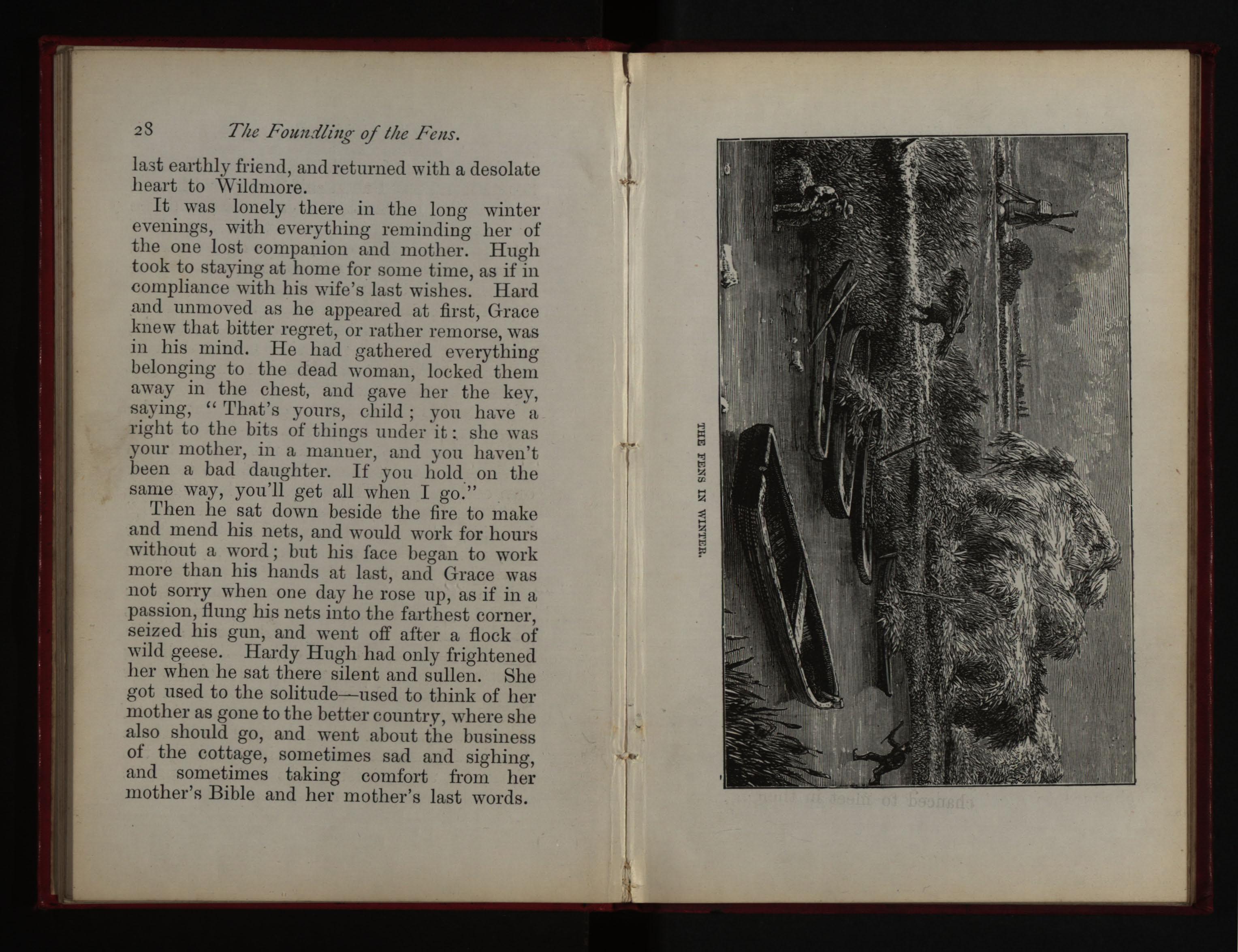
23 The Foundliug of the Fells. last earthly friend, and returned with a desolate heart to \Vildmore.
It was lonely there in the long winter evenings, with everything reminding her of the one lost companion and mother. Hugh took to staying at home for some time, as if in compliance \yith his wife's last wishes. Hard and unmoved as he appeared at first, Grace knew that bitter regret, or rather remorse, V.'aS in his mind. He had gathered everything belonging to the dead woman, locked them away in the chest, and gave her the key, saying, "Tha.t's yours, child; you haye lL right to the bits of things under it: she was your mother, in a manuer, a.nd you hayen't been a bad daughter. If you hold on the same way, you'll get all when I go."
Then he sat down beside the fire to make and mend his nets, and would work for homs without a word; but his face began to work more than his ha.nus at last, and Grace was not sorry when one day he rose up, as if in a passion, flung his nets into the farthest corner, seized his gun, and went off after a flock of wild geese. Hardy Hugh had only frightened her when he sat there silent and sullen. She got used to the solitude-used to think of her mother as gone to the better country, where she also should go, and went about the business of the cottage, sometimes sad and sighing, and sometimes taking comfort from her mother's Bible and her mother's last words.
The FOlmdlz"1tg of the Fells.
As for Hugh, though he came often to see how the girl was getting on, he never stayed any length of time. Night and day Grace was left alone in the reedy island with cows sheep, and geese. Indeed, his l'emarked that after his wife's death Hugh was. not so even in his fishing and fowlmg operatIOns. He frequented the fairs and the alehouse far more than he had previously done; got into brawls and quarrels' got mixed up with outlaws and robbe; gangs, with which the Fen country was short, Hugh became barbarously dIssIpated, and was losing caste and character among the best of the Fenmen.
As the spring advanced, best and worst in the Great Level got more to think and talk of than Hardy Hugh's misdoings. ThrouGh all the border towns and island villages bthere went a strange report that the Fens were about to be drained and turned into dry land' that the where reeds had gl'Own and cormorants bUIlt for ages were to become hay-growing meadows; that the lakes where nets had been cast and oars plied for centuries were to be converted into corn-fields and all this was to be effected by outlandish men whom the king was bringing' over from Holland. People brouo'ht home that rumour from fairs a;nd mark:ts talked of it by their cottage fires, and men chanced to meet in their fowlinG and fishinG b 0
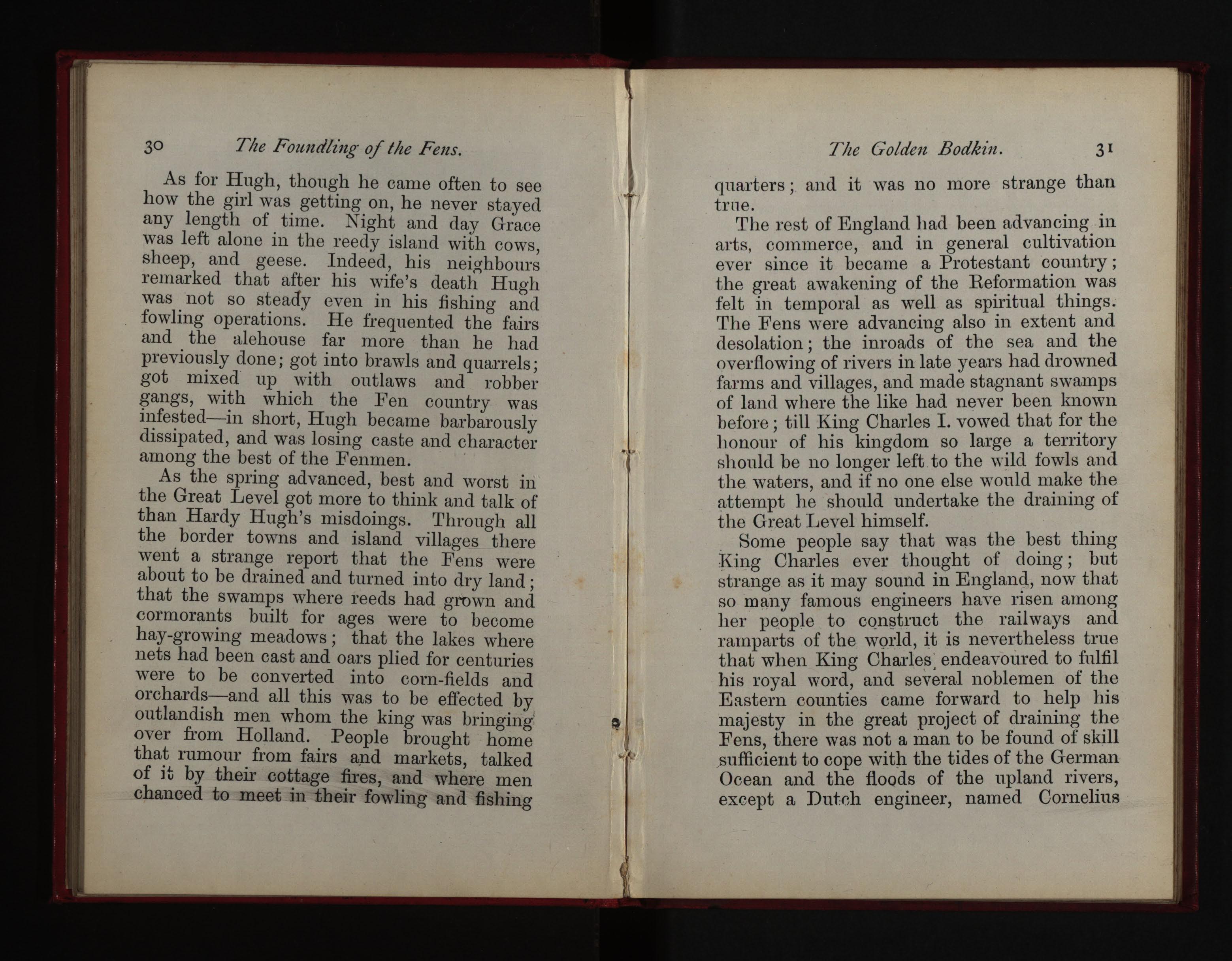
The Golde1t Bodk£1t. 3 1 quarters; and it was no more strange than trne.
The rest of England had been in arts, commerce, and in general cultivatIOn ever since it became a Protestant country; the great awakening of the was felt in temporal as well as spIrItual thmgs. The Fens were advancing also in extent and desolation; the inroads of the sea and the overflowing of rivers in late years had drowned farms and villages, and made stagnant swamps of land where the like had never been known before; till King Charles I. vowed that the honour of his kingdom so large a terrItory should be no longer left to the " 'ild fowls and the waters and if no one else would make the attempt should undertake the draining of the Great Level himself.
. Some people say that was the thing King Charles ever thought of domg; but strange as it may sound in England, now that so many famous engineers have risen among her people to the rail ways and ramparts of the wQrld, it is nevertheless true that when King Chades, endeavoured to his royal word, and several noblemen of Eastern counties came forward to help hIS majesty in the great project of draining the Fens there was not a man to be found of skill , sufficient to cope with the tides of the German Ocean and the floo'ds of the upland rivers, except a Dutoh engineer, named Cornelius
3 2 The Foundling- of the Fcns. Vermuyden, long settled in England, and knighted by James 1., King Charles's father, for draining the royal park of Windsor and the swamps of Hatfield Chase. His native Holland lay right opposite the Great Fen Level of England. From the tides of the same German Ocean and the overflowings of far mightier rivers, its provinces had been won. By dyke and sluice, by dam and canal, the Dutch had gained and kept their country. rrhey were notable for that sort of engineering beyond all other nations at the time; therefore none but a Dutchman could be found to undertake the draining of the English Fens, and none but Dutch foremen and labourers could be of any use in the work.
.
Accordingly, Sir Comelius, having obtained the king's commission, and got men of capital and comage in Holland and England to join in the adventure-which, indeed, was neither small nor cheap-set himself and his people to work first of all on the Old Level, which for engineering reasons he thought it best to begin with; and as it was the centre and worst part of the Fens, King Charles proposed to signalize his royal undertaking and keep it in men's memories by building a town on the soil as soon as it was sufficiently drained, and calling it Charleville, in honour of his name.
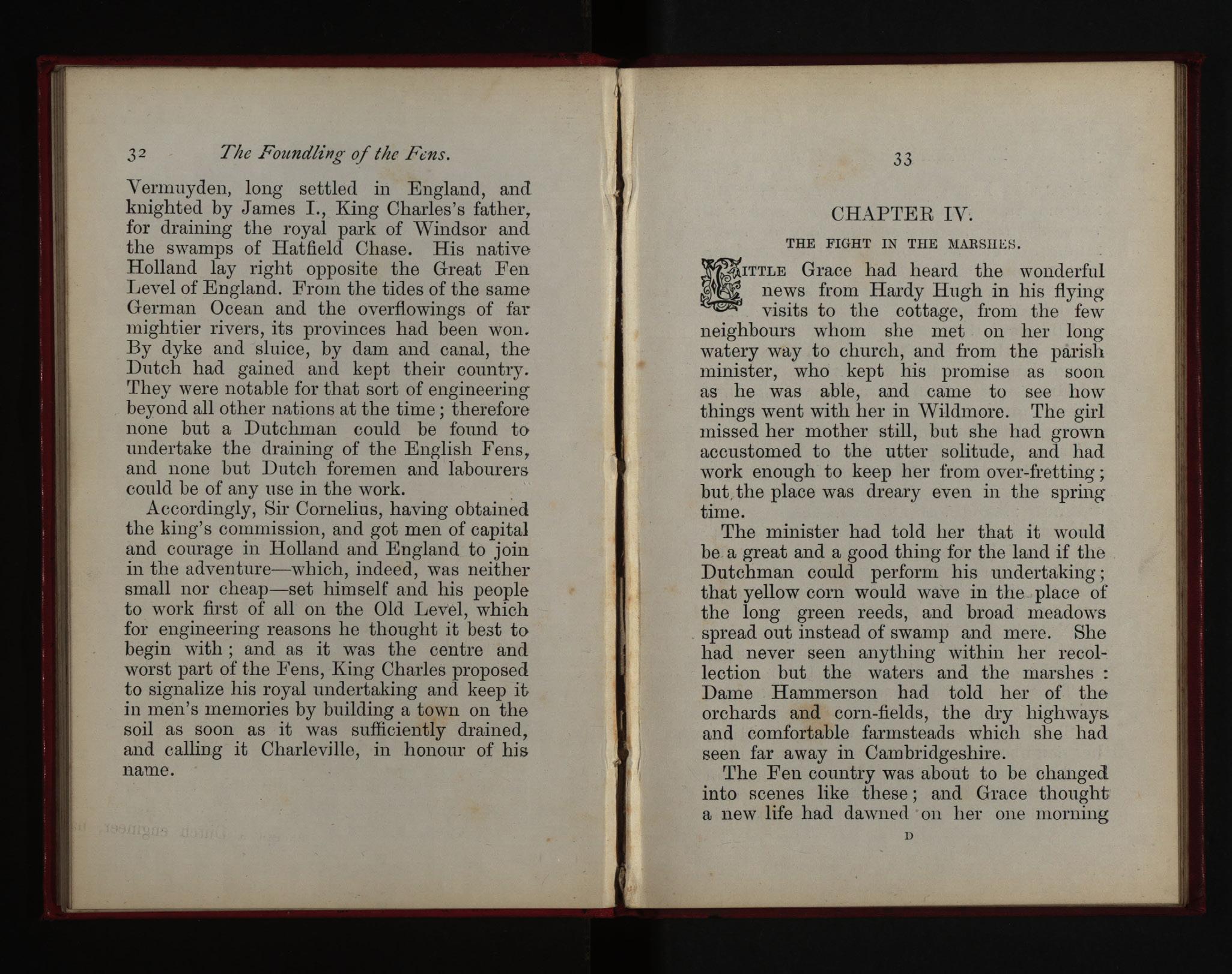
33 CHAPTER IV.
THE FIGHT IN THE MARSHE S .
lITTLE Grace had heard the wonderful news from Hardy Hugh in his flying visits to the cottage, from the few neighbours whom she met on her long watery Wi:1y to church, and from the parish minister, who kept his promise as soon as he was able, and came to see how things went with her in Wildmore. The girl missed her mother still, but she had grown accustomed to the utter solitude, and had work enough to keep her from over-fi'etting; but ,the place was dreary even in the spring time.
The minister had told her that it would be a great and a good thing for the land if the Dutchman could perform his undertaking; that yellow corn would wave in the place of the long green reeds, and broad meadows spread out instead of swamp and mere. She had never seen anything within her recollection but the waters and the marshes : Dame Hammerson had told her of the orchards and corn-fields, the dry highways and comfortable farmsteads which she had seen far away in Cambridgeshire.
The Fen country was about to be changed into scenes like these; and Grace thought a new life had dawne<1 on her one morning D
The Foundli1lg of the Fens. when she heard voices coming over the neighbouring swamps, and saw men with tools she had never seen the like of before falling to work by companies whereyer there was standing room. There were some that surveyed and measured, and numbers that dug and delved. They came close on the island of Wildmore, then up among the reeds, and almost to the cottage door. They spoke a foreign language, they wore strange clothes; but Grace was not afraid of them-they had honest, quiet faces, and seemed to mind nothing but their business.
There was one of them who looked like the master, though no better clad than the rest, and quite as ready to plunge through mud and mire; he did nothing but measure ground and give commands; and as Grace was peeping at the wonderful work through the half-open door, he came up and said in good English, "What are you doing here, my girl? Is there nobody in this place but you?"
"Nobody, sir," said Grace; "I keep the house, and look after the cows and geese that yOl.1l. see grazing yonder among the rushes."
H To whom do the house and they belong ?" said the measuring man.
"To Hugh Hammerson, sir-Hardy Hugh the neighbours call him. You must have heard of him, for he is the richest man in these parts, and a great fowler. think what wild geese he shoots wIth hIS
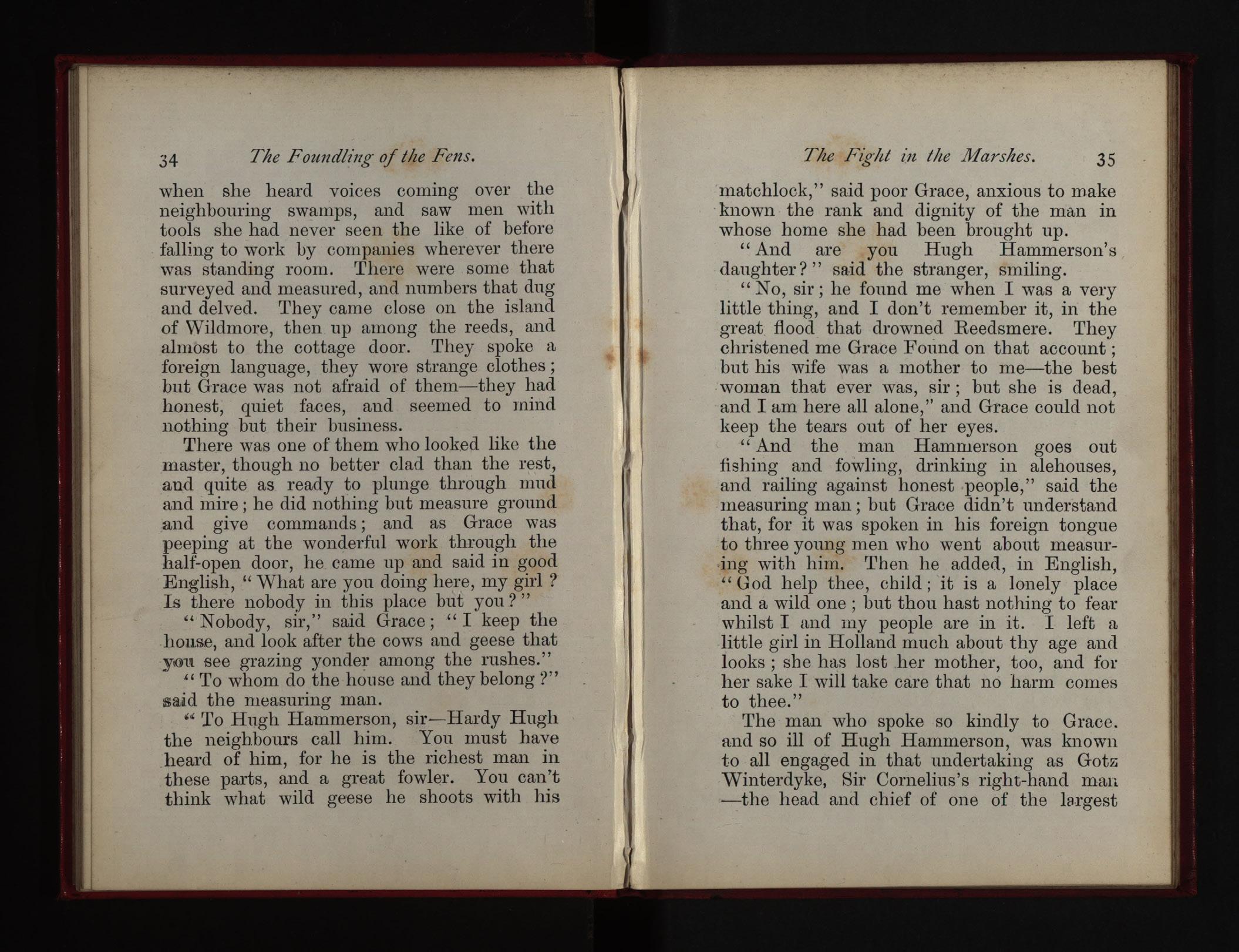
The Fight in the Marshes. 35 matchlock," said poor Grace, anxious to make known the rank and dignity of the man in whose home she had been brought up.
"And are you Hugh Hammerson's daughter?" said the stranger, smiling.
" No, sir; he found me when I was a very little thing, and I don't remember it, in the great flood that drowned Reedsmere. They christened me Grace Found on that account; but his wife was a mother to me-the best woman that ever was, sir; but she is dead, and I am here all alone," and Grace could not keep the tears out of her eyes.
"And the man Hammerson goes out fishing and fowling, drinking in alehouses, and railing against honest people," said the measuring man; but Grace didn't understand that, for it was spoken in his foreign tongue to three young men who went about measuring with him. Then he added, in English, "God help thee, child; it is a lonely place and a wild one; but thou hast nothing to fear whilst I and my people are in it. I left a little girl in Holland much about thy age and looks; she has lost her mother, too, and for her sake I will take care that no harm comes to thee."
The man who spoke so kindly to Grace. and so ill of Hugh Hammerson, was known to all engaged in that undertaking as Gotz Winterdyke, Sir Cornelius's right-hrtnd man -the head and chief of one of the la ,rgest
The Foltndl£ng" of the Fens. companies of workmen shipped over from Holland for the draining of the Fens. Winterdyke was not only a skilful engineer, but had saved a considerable sum of money through his good services in Wjndsor Park and H atfield Chase, and he was willing to sink it in the new adventure, in consideration of a large grant of the reclaimed land, which had been assigned to him by King Charles, and would become his property as soon as it was drained. He was a good engineer, an industrious, economical man, honest according to bond and bargajn, civil and even kindly to those who could or would do him no harm.
But Winterdyke's name in a manner suited his nature, for he was rough, hard, and grasping where his interests were concerned; and those who offended or opposed him had neither charity nor consideration to expect. The draining of Wildmore and the adjacent swamps was committed to him and his company. The firm land of the island afforded space for him and his men to pitch tents and commence their work upon.
That very day the tents were pitched, the fu'es lighted, and the work begun; there the Dutchmen lived and laboured, sleeping in their tents at night, cutting drains and building embankments all the day, and proving l'ight good neig4bours to little Grace. Winterdyke saw that none of them trespassed
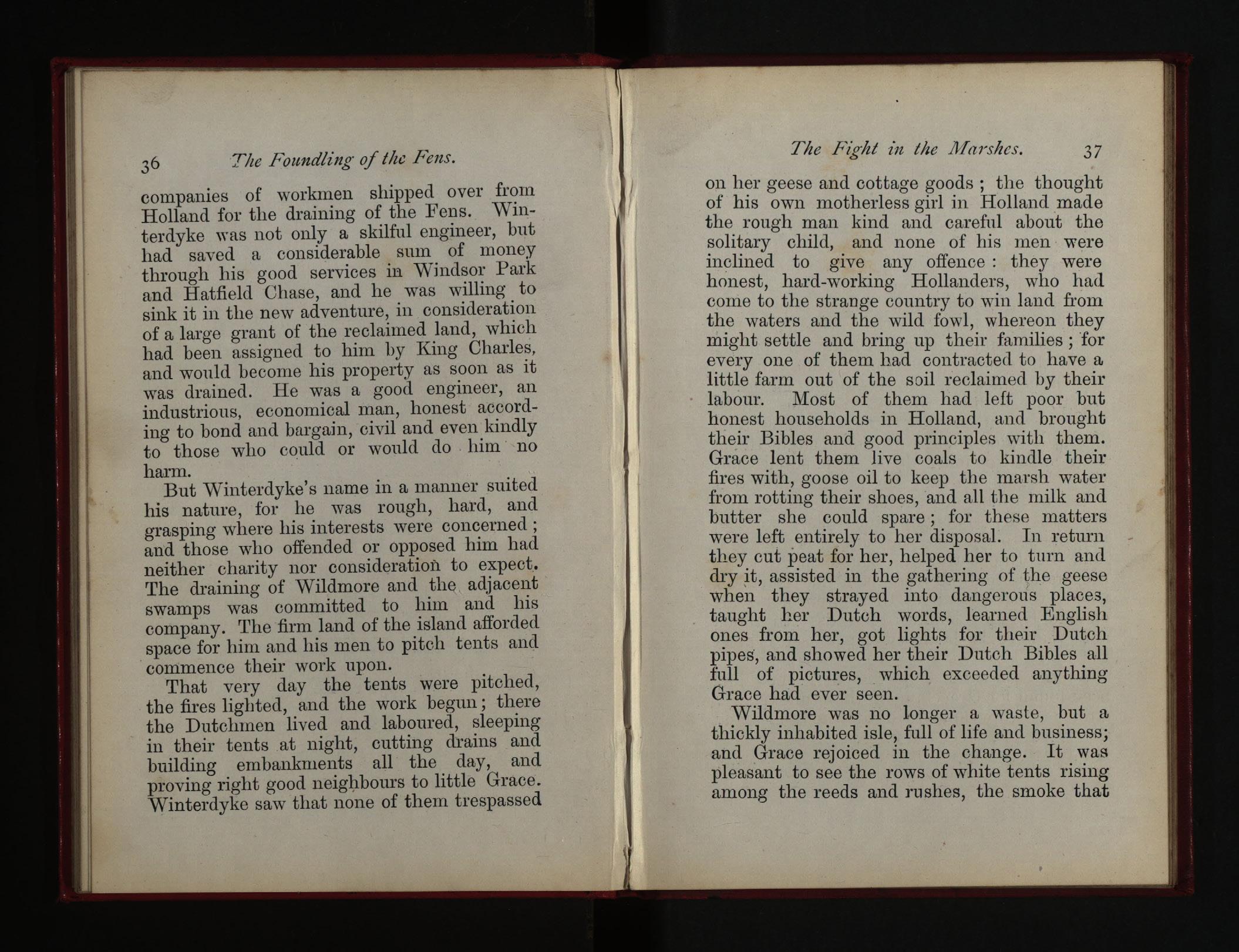
The F'ight z"n tile Marshes. 37
on geese and cottage goods; the thought of hIS own motherless girl in Holland made the rough man kind and careful about the solitary child, and none of his men were inclined to give, any offence: they were honest, hard-workmg Hollanders, who had come to the strange country to win land from th,e waters and the, wild fowl, whereon they mIght settle and brmg up their families; Jor everyone of them had contracted to have a little farm out of the soil reclaimed by their labour. Most of them had left poor but ?ouseholds in Holland, and brought their BIbles and good principles with them. Grace lent them live coals to kindle their fires with, goose oil to keep the marsh water from rotting their shoes, and all the milk and butter she could spare; for these matters were left entirely to her disposal. In return they cut peat for her, helped her to turn and dI'y assisted in the gathering of the geese when they strayed into dangerolls places, taught her Dutch words, learned English from her, got lights for thrir Dutch pIpes, and showed her their Dutch Bibles all full of pictures, which exceeded anythin a Grace had ever seen.
0 Wildmore was no longer a waste but a thickly inhabited isle, full of life and and Grace rejoiced in the change. It pleasant to see the rows of white tents rising among the reeds and rushes, the smoke that
The F oUlldlillg- of the Fats. streamed up from them in the mornings, the red light of their eyening fires, the lllen in their strange caps and doublets dching and building in every direction, the deep drains widening, and the embanlunents getting up on every side. It was pleasant to hear the bell they had hung in one of the willow-trees, with a sundial just below, ringing them in to meals and out to work. Grace learned to pull it for them, and to mark the time on the dial when there was sun enough to show it.
It was pleasant to see them gathering together in fine Sundays on the mossy grass in front of the cottage to sing their Dutch psalms and hear their Dutch Bibles read and expounded by a grey-haired man, who worked among them all the week and was their only minister. When they got friendly enough, and the weather happened to be wet, the simple service was held in the cottage. Grace made every preparation and all the room she could for them: those for whom there were not seats enough brought bundles of reeds wit,h them, and Winterdyke being chief man sat nearest the fire.
As the parson had predicted, friends had. been found for Grace among these unexpected strangers who came to drain the Fens, and the child had need of friends of some sort. Hardy Hugh had not been seen in the vicinity of his own cottage since the beginning of
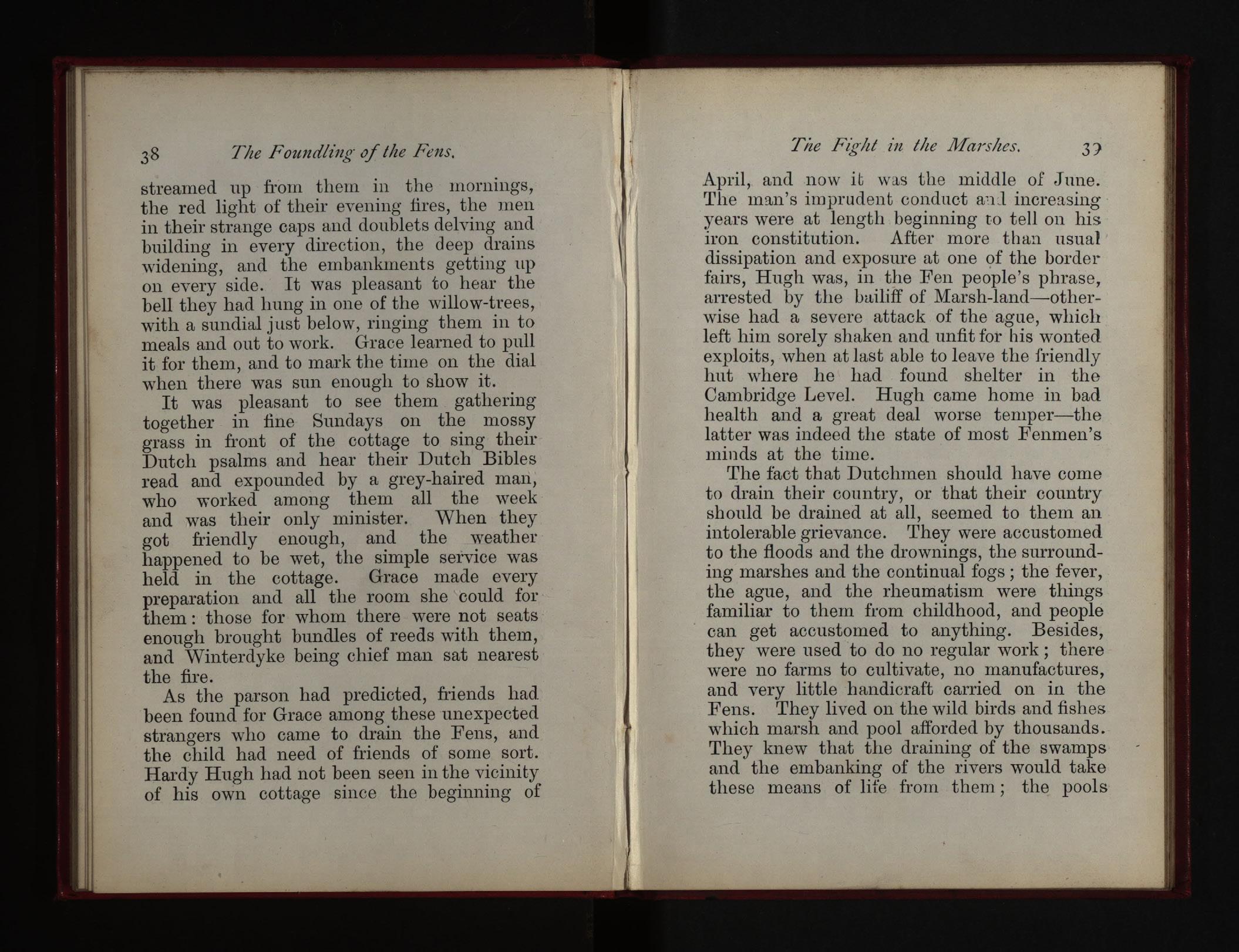
Tile Fig-ht in the Marshes. 3J
April, and now it Wd,S the middle of June. The man's imprudent conduct a'Ll increasing years were at length beginning to tell on his iron constitution. After more than usual dissipation and exposure at one of the bOl'del' fairs, Hugh was, in the Fen people's phrase arrested by the LtLiliff of wise had a severe attack of the aa-ue which left him sorely shaken and unfit for [1is'wonted exploits, when at last able to leave the friendly hut where he had found shelter in the Cambridge Level. Hugh came home in bad health and a great deal worse temper-the latter was indeed the state of most Fenmen's minds at the time.
The fact that Dutchmen should have come to drain their country, or that their country should be drained at all, seemed to them an intolerable grievance. They were accustomed to the floods and the drownina-s, the surrounding marshes and the continual fogs; the fever, the ague, and the rheumatism were things familiar to them from childhood, and people can get accustomed to anything. Besides, they were used to do no regular work; there were no farms to cultivate, no manufactures, and very little handicraft carried on in the Fens. They lived on the wild birds and fishes which marsh and pool afforded by thousands. They knew that the draining of the swamps and the embanking of the rivers would take these means of life from them; the pools
The Foltndlillg- of the Fens. would disappear, and so would the pike; the Dutch drainers and tillers would leave no room for the wild geese, and they were not disposed to give up their rude, roving ways, and learn the new ones of more civilized people. It was therefore their unanimous opinion that the draining of the Fens would be the ruin of England, and that it was all hrought about by the Dutch foreigners to get the whole kingdom into their hands; and if they were allowed to accomplish their undertaking, nobody but themselves would get leave to live in the land at all.
The Fenmen were ignorant and wedded to their customs. Hardy Hugh was one of the most prejudiced among them; he came home determined to hate and thwart the Dutchmen; and what was his indignation to find Winterdyke and his company fully established in Wildmore-his own family domain, where nobody but Hammersons had ever lived or kept geese-cutting a new channel for the floods of the Ouse, and building embankments strong enough to withstand the German Sea, itself. Hugh's wrath was as high as ever its tides had risen.
It so happened that Winterdyke was the first man he met; but Winterdyke and he had met before at the fair at Stowbridge, when the draining was first talked of and the first Dutch surveyors came to the Fens. Hugh had encountered him in an alehouse, where they
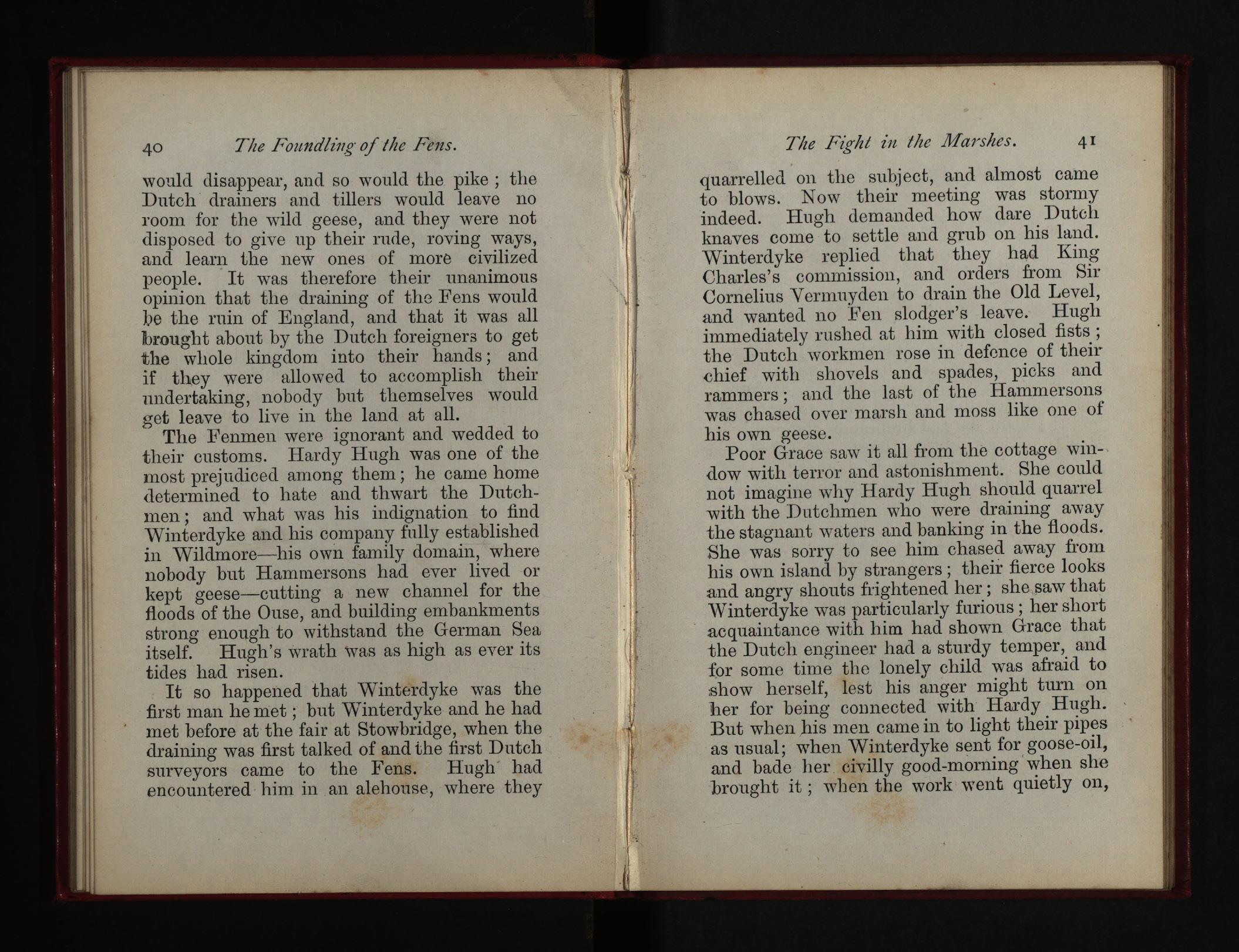
The Fight in the Marshes.
quarrelled on the subject, and almost came to blows. Now their meeting was stormy indeed. Hugh demanded how dare Dutoh knaves come to settle and grub on his land. Winterdyke replied that they had King Charles's commission, and orders from Sir Cornelius Vermuyden to drain the Old Level, and wanted no :Fell slodger's leave. Hugh immediately rushed at him with closed fists; the Dutch workmen rose in defence of their chief with shovels and spades, picks and rammers; and the last of the Ha.mmersons was chased over marsh and moss lIke one of his own geese.
Poor Grace saw it all from the cottage window with telTor and astonishment. She could not imagine why Hardy Hugh should quarrel with the Dutchmen who were draining away the stagnant waters and banking in the floods. She was sorry to see him chased away from his own island by strangers; their fierce looks and angry shouts frightened her; she saw that Winterdyke was particularly furious; her shOl't acquaintance with him had shown Grace that the Dutch engineer had a sturdy temper, and for some time the lonely child was afraid to show herself, lest his anger might turn on her for being connected with Hardy Hugh. But when his men came in to light their pipes as usual; when Winterdyke sent for goose-oil, and bade her civilly good-morning when she brought it; when the work went quietly OD,
42 The Foundling 0./ the Fells. and she marked the hours and pulled. the bell as heretofore, Grace thought herself secure, and peace restored to Wildmore. But.peace and security were not to be had so easIly. As she lay in her little bed that same night, Grace was roused from her sleep by an unusual outcry among the geese as if something disturbed them; then was a far louder outcry of men, a sound of shouts, a flare of lights, and a clash of weapons. Grace ran to her window and unbarred it: the Dutch tents were all in nproar and confusion. By the faint moonlight and the fitful flare of firebrands she could see that th.ere was fighting there; she could hear VOIce of Hardy Hugh shouting, "Down wIth the Dutch knaves that have come to our king and take our country! down wIth them! drown them in their own drains I " was indeed a stout battle going on the Island shore. After his pursuit by the angry Dutchmen, Hugh had determined on revenge. Most of the Fenmen thought his a good one; and the lawless associates wIth ha:d lately up were ready to hIm m expellmg the foreigners. Accordmgly they assembled in considerable numbers, armed with such weapons as they had, marched across the swamps by llight Hugh's conduct, hoping for an easy vIctory over the sleeping Dutchmen. But the Dutchmen never slept without a
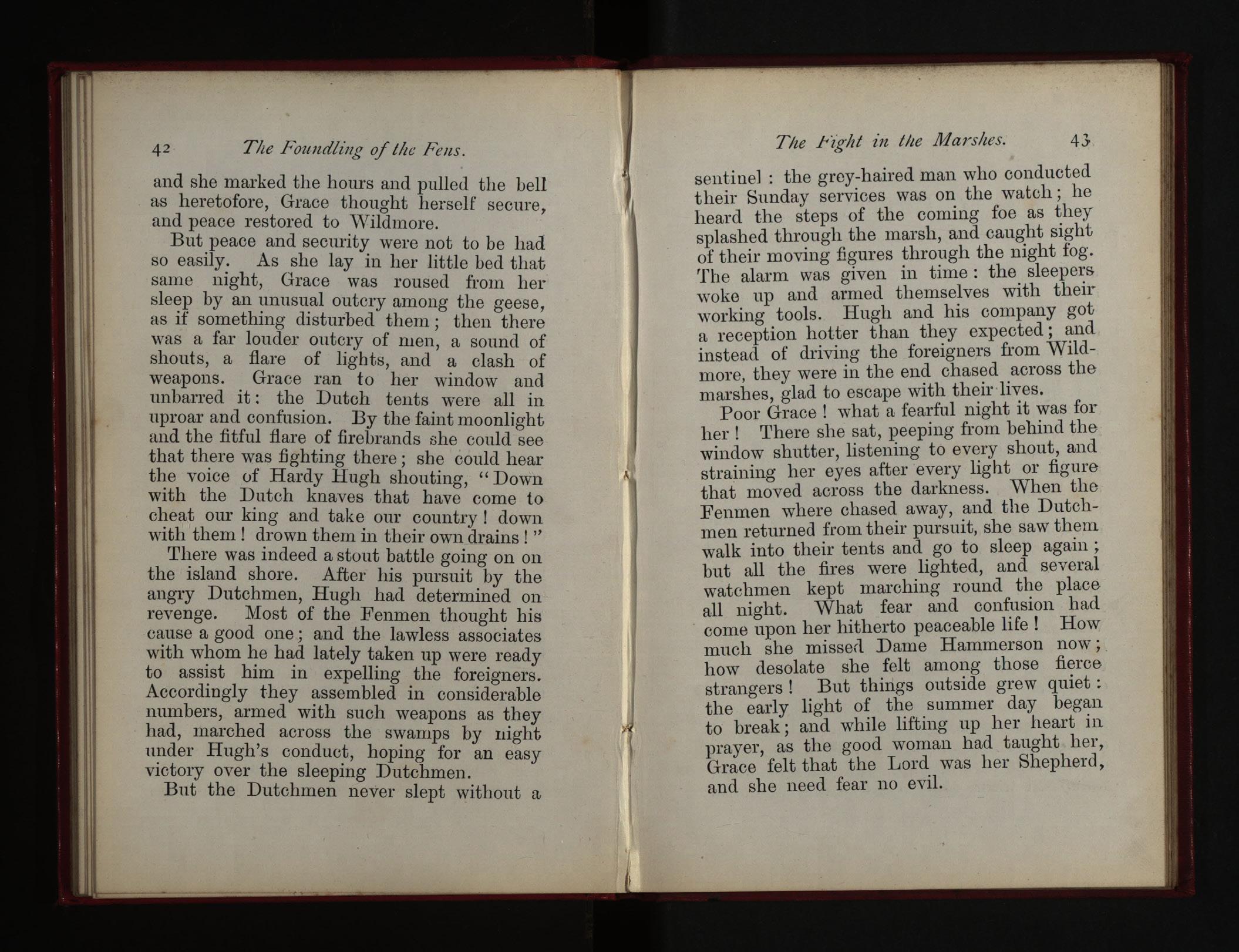
The Fight in tlte Marshes. 4J. sentinel: the grey-haired man who conducted their Sunday services was on the watch; he heard the steps of the coming foe as they splashed through the marsh, and caught sight of their moving figures through the night fog. The alarm was given in time: the sleepers woke up and armed themselves with their ''lorking tools. Hugh and his company got a reception hotter than they expected; and instead of driving the foreigners from Wildmore, they were in the end chased across the marshes, glad to escape with their lives.
Poor Grace! what a fearful night it was for her! 'J1here she sat, peeping from behind the window shutter, listening to every shout, and straining her eyes after every light or figure that moved across the darkness. When the Fenmen where chased away, and the Dutchmen returned from their pursuit, she saw them walk into their tents and go to sleep again; but all the fires were lighted, and several watchmen kept marching round the place all night. What fear and confusion had come upon her hitherto peaceable life! How much she misse.l Dame Hammerson now; how desolate she felt among those fierce strangers! But things outside grew quiet: the early light of the summer day began to break; and while lifting up her heart in l)rayer, as the good woman had taught her, Grace felt that the Lord was her Shepherd, and she need fear no evil.
44 The Fculldling- o.f the Fens.
FEAR GOD AND FEAR NOTHING.
the evils of that night did .. n?t pass with it. Winterdyke knew . hImself to be firmly established not {)nly m the service of Sir Cornelius, but also in the favour of the Earl of Bedford the here.ditary lord of the Old Level and' a zealous p atro l1 of the Dutch The earl had a large sum to the project of reclamatIOn: he was naturally anxious about it? and Winterdyke had no difficulty in getting hIm to send a guard of soldiers to keep off Fenmen, and allow his people to work m peace. The guard came next day under the command of Lord Bedford's own cousin' brought their tents and camp wIth them, and established themselves in :Vildmore. But there was scarcely room 011 Its dry land for them and the workmen and Winterdyke took the occasion, which had long wanted, to lodge himself and the most trusty of his people in Hugh Hammerson's cottage.
Dutchman, though honest after a fashi.on, was selfish and grasping; he had long conSIdered that the cottage, from its situation on the best part of the island, its substantial walls and warm roof, would be a good house
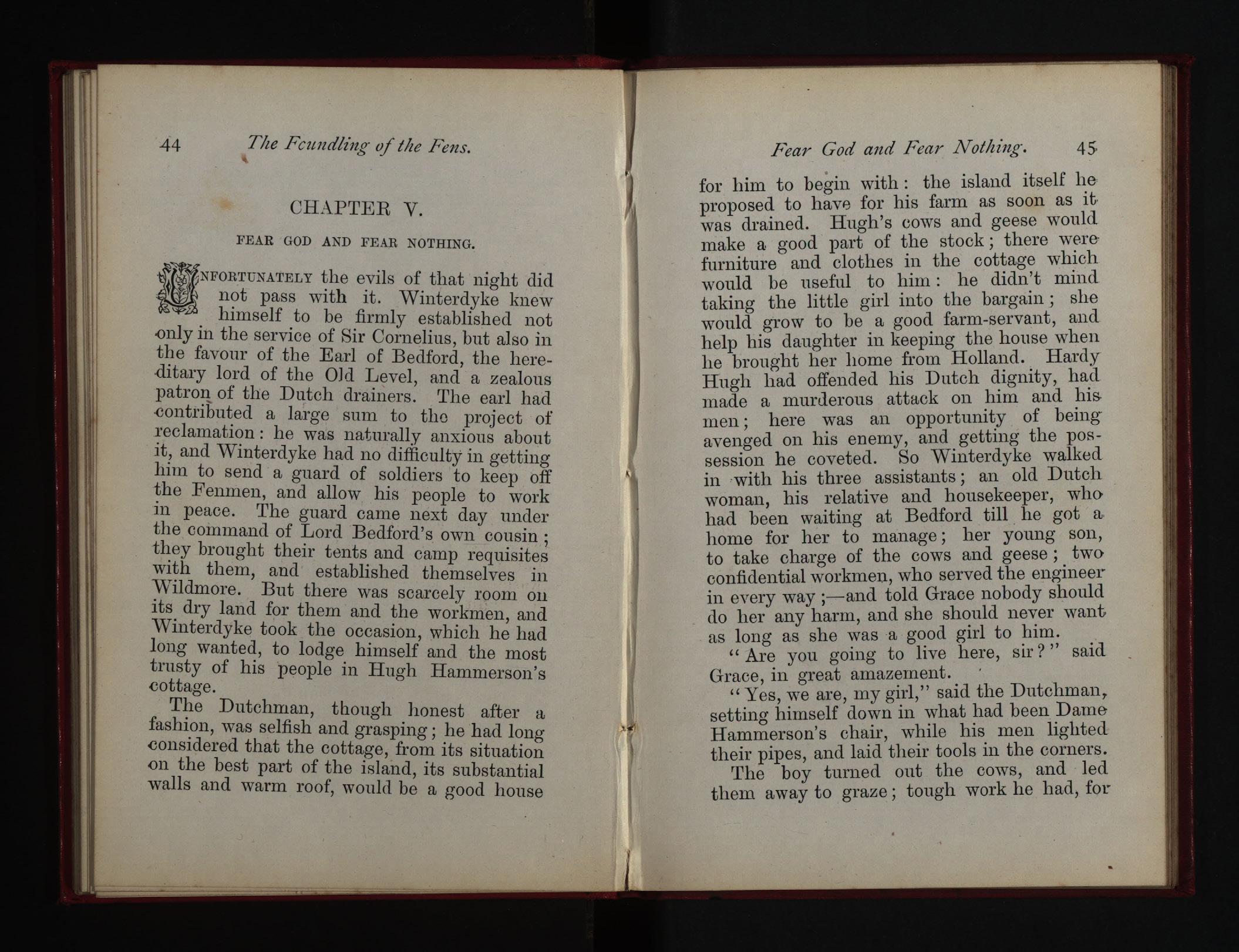
45-
for him to begin with: the island itself proposed to hav8 for his farm as soon as It, was drained. Hugh's cows and geese would make a good part of the stock; there furniture and clothes the would be useful to hIm: he dldn. t mmd taking the little girl into the bargam; she would grow to be. a farm-servant, and help his daughter m keepmg the house he brought her home from Hollal;td.. Hardy Hugh had offended his Dutch dlgmty, had made a murderous attack on ?im and ?is. men' here was an opportumty of bemg' avenged on his enemy, and. getting the possession he coveted. So Wmterdyke walked in 'with his three assistants; an old Dutch woman his relative and housekeeper, who had waiting at Bedford till he got a home for her to manage; her young son, to take charge of the cows and geese;. two confidential workmen, who served the engmeer in every way j-and told Grace nobody should do her any harm and she should never want as long as she a good girl to ?irr;; . "Are you going to live here, slr? saId Grace in great amazement. we are, my girl," said the Dutchman r setting himself in ?ad been ;DameHammerson's chau, whIle hIS. men lIghted their pipes, and laid their tools III the corners. The boy turned out the cows, and led them away to graze; tough work he had, for
4 6 The Foundli1lg of the Fens. they did not like strangers. The old woman about the house, turning up and lookll1g ll1to everything; and at length coming to the locked chest, let Grace know 'that she speak English by demanding the key. There are clothes that my mother left ar: d Hugh gave me in it," said Grace trem-
. the gold bodkin, which in her sImplICIty she had left in the corner where Dame Hammerson kept it, thinking that the safest place.
"N tt"'d o ma er, cne the old woman' "I them: me the key.'"
It out, clnld," said Wintel'dyke smoking comfortably. "She shan't all from you; but your mother's gowns .can t fit you, you know, and Dame Howfer wants a Sunday one: give out the key I tc.ll you."
, v Grace dared to refuse no longer: with her eyes she brought the key fi'om Its hIdaen corner. The old woman directly opened the chest, turned everything out with many an exclamation of covetous at the sound, well-made linens, blue cloth °gown grey cloak and hood which she found laId up there. That gown and cloak had been Dame Hammerson's Sunday dress' the old Dutch woman immediately laid it for herself, and as .she was doing so, Grace, who stood by WIth a trembling heart thrust her hand down into the
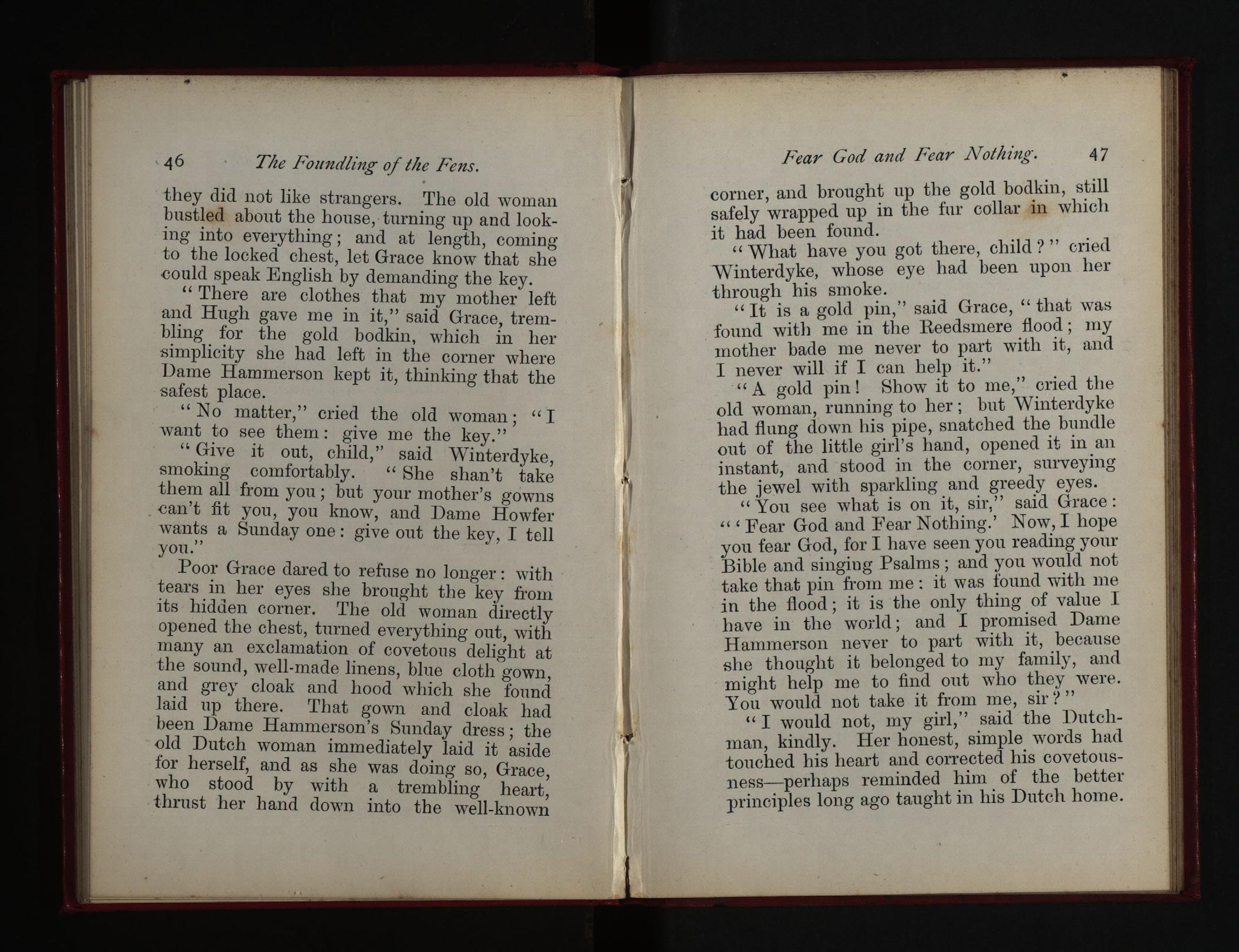
Fear God and Fear Noth£1Zg-. 47
corner, and brought up the gold bodkin, still safely wrapped up in the fur collar in which it had been found.
"What have you got there, child?" cri e d Winterdyke, whose eye had been upon her through his smoke.
"It is a gold pin," said Grace, " that was found with me in the Reedsmere flood; my mother bade me never to part with it, and I never will if I can help it."
"A gold pin! Show it to me," cried th e old woman, running to her; but Winterdyke had flung down his pipe, snatched the bundle out of the little girl's hand, opened it in an instant, and stood in the corner, surveying the jewel with sparkling and greedy eyes .
"You see what is on it, sir," said Grace: " 'Fear God and 1!'ear Nothing.' Now, I hope you fear God, for I have seen you reading your Bible and singing Psalms; and you would not take that pin from me: it was found with me in the flood; it is the only thing of value I have in the world; and I promised Dame Hammerson never to part with it, because she thought it belonged to my family, and might help me to find out who they were.
You would not take it from me, sir?"
"I would not, my girl," said the Dutchman, kindly. Her honest, simple words had touched his heart and corrected his covetousness-perhaps reminded him of the better principles long ago taught in his Dutch home.
4 8 The Foundling 0./ tlte Fens.
"I would not take it from you but other pe.ople and Grace thought that as he sa.ld thIS he glanced at the old woman. "I wIll keep it for you; and I give you my word as an honest man, that I will restore it to you when years old, or when you If It be before that time."
" Will you keep" it sir, and will you keep your word? saId poor Grace, who knew remonstrance was useless, and also m greater fear of Dame Howfer's skinny fingers.
" I will, my girl; I promise in the sight of said the Dutchman; and he looked so that Grace could have believed him the oath, which was not spoken with levIty.
end of the lllatter was that she saw the bodkm locked in Winterdyke's valise among most precIOUS papers, his grant of his dead wife's wedding nng, and hIS lIttle girl's horn-book. The old did not look civil for three days after mlssmg her chance of getting hold of it· she tossed all the clothes belonging to out of the chest, set to wearing all Dame Hammerson's, and kept the key in her possession.
She kept the house, too, and would let do nothing but what she pleased, taking occaSIOn to blame and grumble at her when she c?uld find the least opportuniLy, as the little gIrl guessed on account of the gold bodkin;
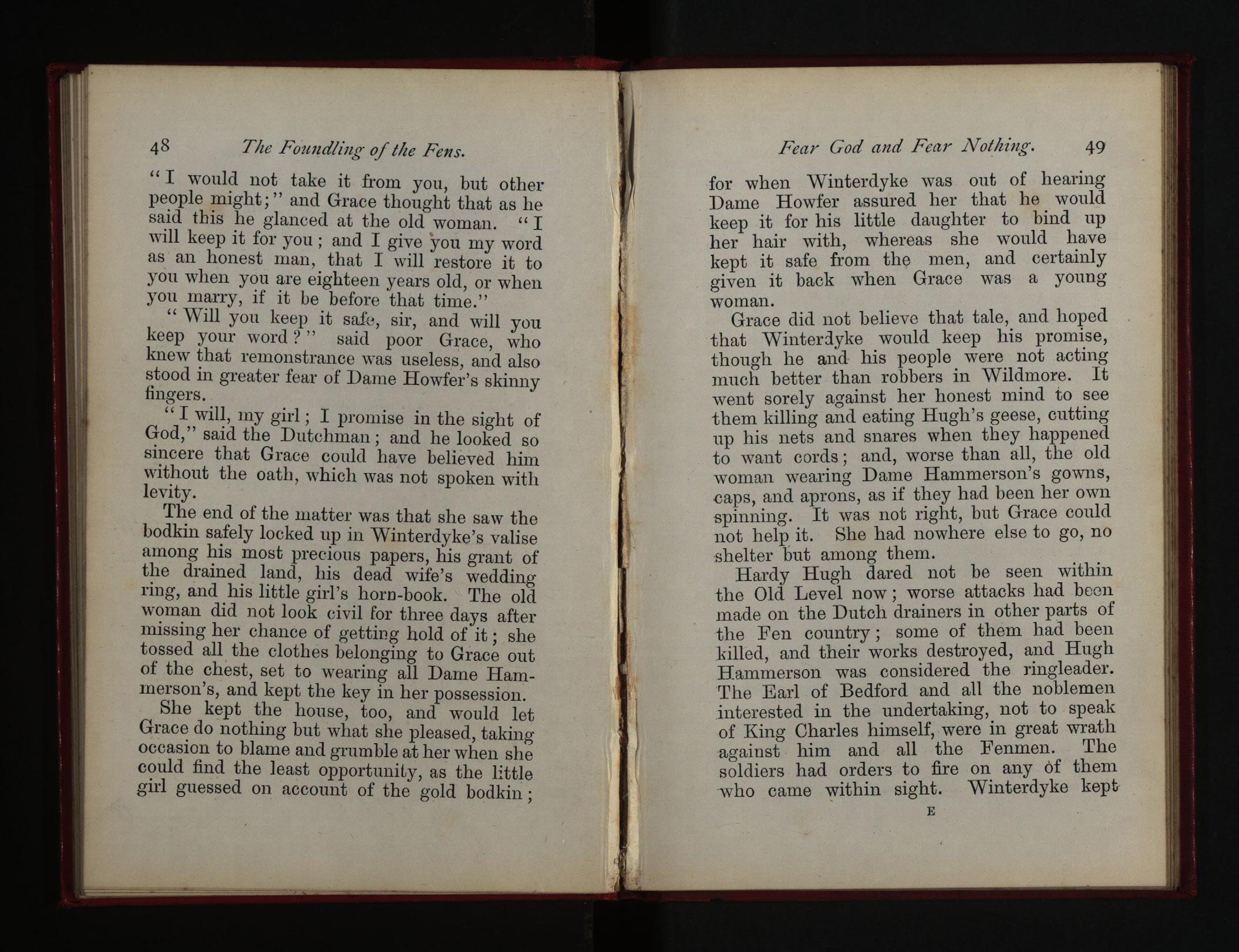
for when Winter dyke was out of hearing Dame Howfer assured her that he would keep it for his little daughter to bind up her hair with, whereas she would have kept it safe from the men, and certainly given it back when Grace was a young woman.
Grace did not believe that tale, and hoped that Winter:lyke would keep his promise, though he and his people were not acting much better than robbers in Wildmore. It went sorely against her honest mind to them killing and eating Hugh's geese, cuttmg up his nets and snares when they happened to want cords; and, worse than all, the old woman wearing Dame Hammerson's gowns, caps, and aprons, as if had been her own -spinning. It was not nght, but Grace could not help it. She had nowhere else to go, no shelter but among them.
Hardy Hugh dared not be seen within the Old Level now; worse attacks had been made on the Dutch drainers in other parts of the Fen country; some of them had been killed and their works destroyed, and Hugh was considered the ringleadel'. The Earl of Bedford and all the noblemen interested in the undertaking, not to speak of King Charles himself, were in great wrath aO'ainst him and all the Fenmen. The had orders to fire on any Of them 'who came within sight. Winterdyke kept E
50 The F02t1Zdlillg of tlte Fe1ts. them up to that order, for it secured his possession of the cottage. .
So Grace saw or heard nothmg of Harcly Hugb, but lived among the serving Dame Howfer as a lIttle maI.d-of-allwork. She tried to please Dame Howfer, too: it was not easy work; the dame had a natural turn for fault-finding, u. sour temper, and. a sharp tongue; moreover, the golden bodkm ran in her mind; she never could forget that it was locked up in Winterdyke's valise, and not in the chest 'she pleased to call her own.
But if the old woman was cross and given to scold all the Dutchmen, from Winterdyke to Howfer's son Morit-a sober, steady Dutch boy, who dug a small drain on his 0"\"11 account, kept the geese to the best grass, could ten which was the fattest, and whIch had the most feathers at any distance-all were kind and friendly with Grace, and usec1 to help her over the swamps when the dame would let her go to Reedsmere Church on fine Sundays. Grace went as often as she could. for the minister was accustomed to speak to her in a friendly way after service; and sho never came home without sitting a few minutes by Dame Hammerson's grave, thinking where the good woman was gone, and ho\"\' she should try to follew her. They used .to help. her sometimes on week days, too, WIth the hard and t1irty work the old woman pleased to assign her; for constant scrubbing and
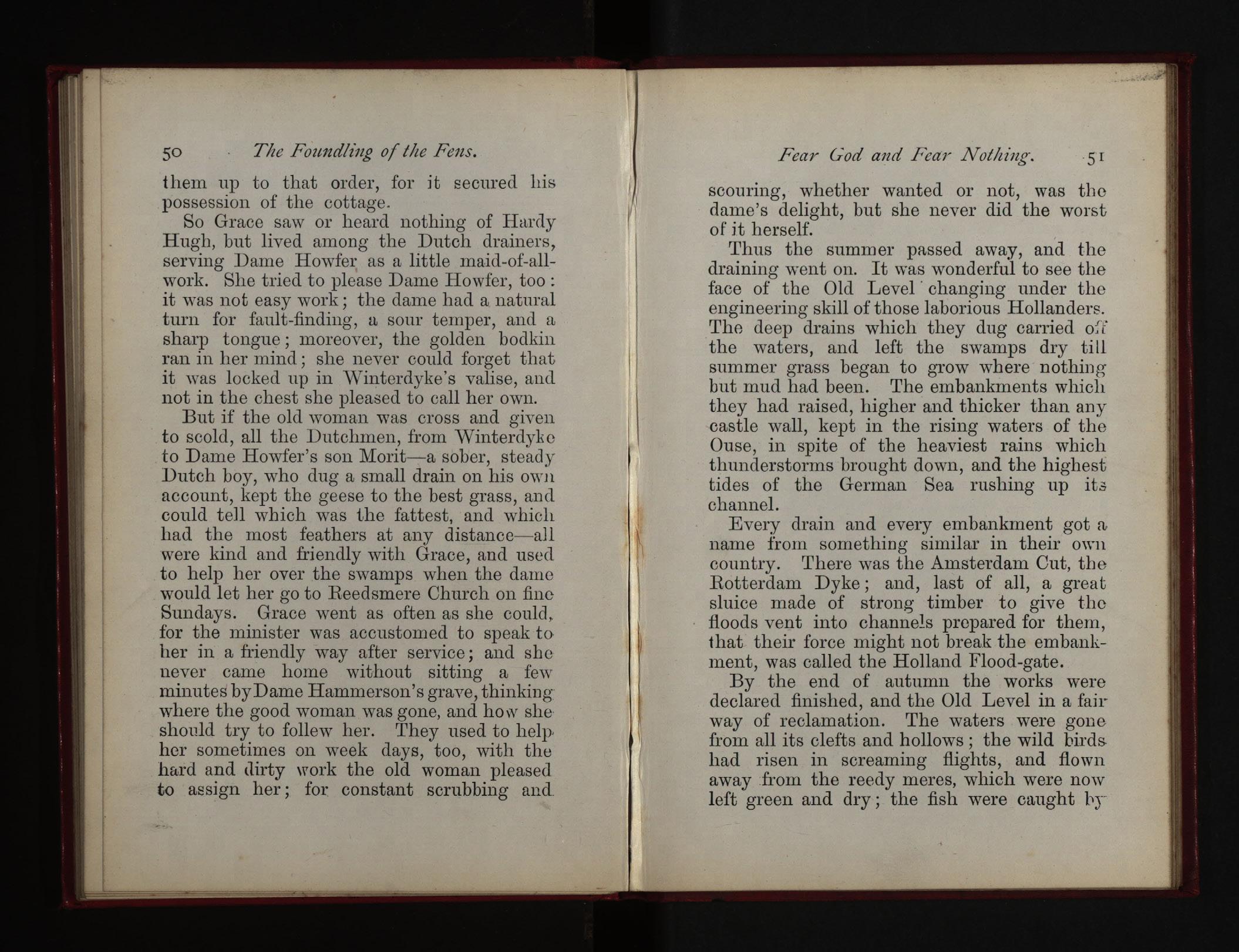
Fear God a1ld Fear NotMng-. SI
scouring, whether wanted or n?t, was the dame's delight, but she never dId the worst of it herself.
Thus the summer passed away, and the draining went on. It was wonderful to see the face of the Old Level ' changing under the engineering skill of those laborious .. The deep drains which they dug carned the waters and left the swamps dry tIll summer began to grow where nothing but mud had been. The embankments which they had raised, higher and thicker than any castle wall, kept in the of Ouse in spite of the heavIest rams WhICh thunderstorms brought down, and the highest tides of the German Sea rushing up ita channel.
Every drain and .every: got a, name from somethlDg SImIlar m theIr own country. There was the Amsterdam Cut, the Rotterdam Dyke; and, of all, !l' great sluice made of strong tImber to gIve the floods vent into channels prepared for them, that their force might not break the embankment, was called the Holland Flood-gate.
By the end of autumn the declared finished, and the Old Level m a fau" way of reclamation. The waters g?ne. from all its clefts and hollows; the wIld buds. had risen in screaming flights, and flown away from the reedy meres, which were now left green and dry; the fish were caught by-
52
The FoundHng of the Fens. thousands in the shallow pools, which only remained where broad lakes had been; the sluice and the embankments had stood the force of two great floods without giving way a hair's breadth. Winterdyke declared the work finished.
Sir Cornelius with the Earl of Bedford and all the county' gentry, came to sUrYey it, and marched round the Old Level on dry land. The weather happened to be fine, and there was a great feast held in a green hollow which had been the broadest swamp. There they kindled great fires, roasted two fat sheep Lord Bedford had sent, made merry with strong beer wine, and many good things supplied by the noblemen, had great speech·making and singing of songs, and were all persuaded by the minister of Reedsmere to attend a general thanksgiving in his parish church on the following day.
After that the Dutchmen fell to work again. Everyone of them had got his grant of land some on the heights, and some in the and everyone forth with provided himself with such farming implements as he could get, and such seed as would be to grow as a first .crop on the newly-won One sowed turmps, another peas, a thIrd rye, according to the land they had, and all began to build themselves houses. They worked hard and helped each other: the season bappened to be unusually mild, .
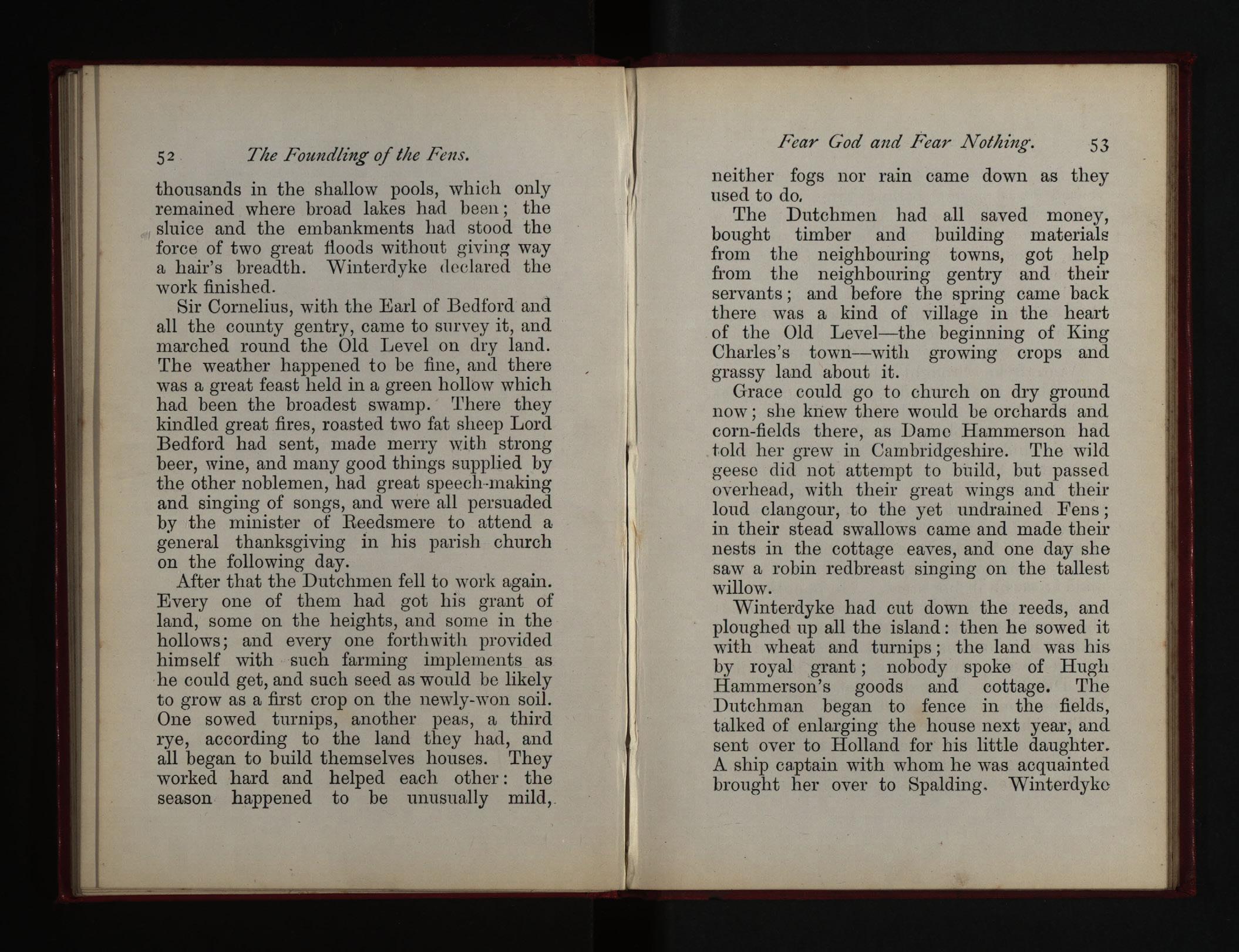
Fear God and Fear Nothi1zg. 53 neither fogs nor rain came down as they used to do.
The Dutchmen had all saved money, bought timber and building materials from the neighbouring towns, got help from the neighbouring gentry and theIr servants; and before the spring came back there was a kind of village in the heart of the Old Level-the beginning of King Charles's town-with growing crops and grassy land about it.
Grace could go to church on dry ground now; she knew there would be orchards and corn-fields there, as Dame Hammerson had t,olrt. her grew in Cambridgeshire. The wild geese diel not attempt to bllild, but passe.d overhead, with their great and theIr loud clangour, to the yet undramed Fens.; in their stead swallows came and made theIr nests in the cottage eaves, and one day she saw a robin redbreast singing on the tallest willow. .
Winterdyke had cut down the l'eeds, and ploughed up all the island: then he sowed with wheat and turnips; the land was hIS by royal grant; nobody spoke of Hugh Hammerson's goods and cottage. The Dutchman began to fence in the fields, talked of enlarging the house next year, and sent over to Holland for his little daughter. A ship ca,ptain with whom he was acquainted brought her over to Spalding. Winterdyko
acld his men went and brought her home, seated on a pillion behind hin:!; and when arrived late on an April evening, Grace a pretty Dutch girl about her own age, with a rosy face and bright yellow hair, dressed in a jacket of crimson cloth, with silver buttons on ib, and many petticoats, one shorter than the other, and all of brilliant colours; and Dame Howfer told her that there was her young mistress, Sena. Winter dyke brought them together, and made them shake hands. Sena could speak no English, and seemed very much frightened at the strange place and the strange faces. Grace could speak a little Dutch, and was no stranger in Wildmore; so the· little Dntch girl took to her, did not think of acting the mistress at all, and they became good friends.
The old woman did not tyrannise over Grace now; vVinterdyke would have her to be a companion to his daughter, and got a sturdy maid to scrub in her stead. He bought her a crimson jacket and bright-coloured petticoats also, to dress in the Dutch fashion, talked of taking her for his second daughter if she behaved well; and Grace would have liked the Dutchman, if he had not robbed Hugh Hammerson of house and goods. Though sometimes troubled and sad, Grace knew where to seek help and comfort. Committing her ways unto God, and trusting in Him, she was peaceful and happy.
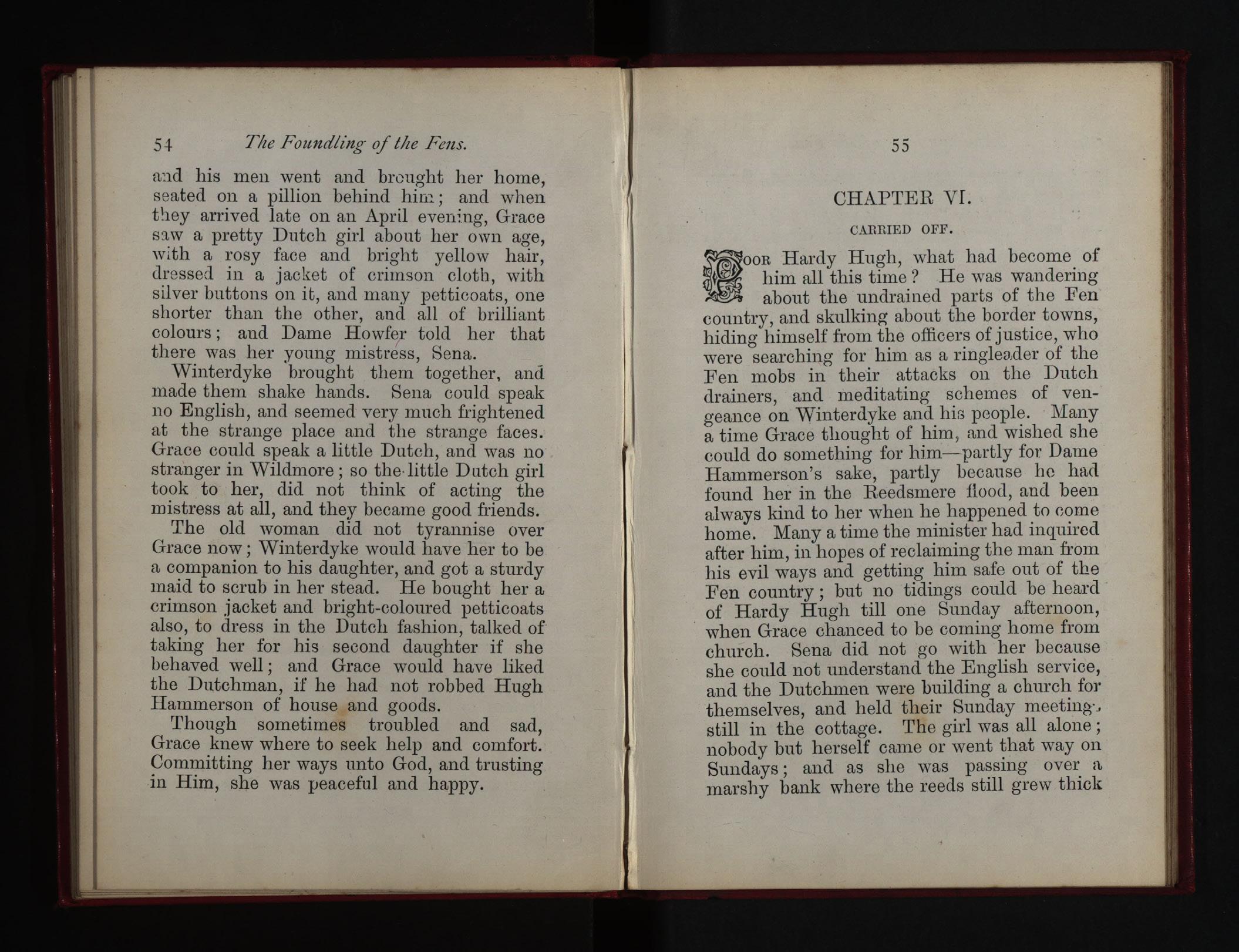
CAI1nIED OFF.
iOOR Hardy Hugh, what had become, of him all this time? He was wandermg about the undrained parts of the Fen country, and skulking about the towns, hidina himself from the officers of JustICe, who were for him as a ringle81der of the Fen mobs in their attacks on the Dutch drainers and meditating schemes of vengeance Winter dyke and. his Many a time Grace thought of hIm, and wIshed she could do something for him- parbly for Dame Hammerson's sake, partly because h.o had found her in the Reedsmere flood, and been always kind to her when J:-appened ,to home. Many a time the had after him in hopes of reclaImmg the man from his evil and getting him safe out of the Fen country; but no tidings could be heard of Hardy Hugh till one afternoon, when Grace chanced to be commg home from church. Sena did not go with she could not understand the English serViCe, and the Dutchmen were building a for themselves and held their Sunday meetmg', still in cottage. The girl was all alone; nobody but herself came or went way on Sundays; and as she was over. H, marshy bank where the reeds stIll grew thICk
Tlte FOlmdlwg- of lite Fens.
and tall, a man jumped out from among them, and clutched her by the shoulder.
"Here you are," cried Hardy Hugh, " here you are, dressed up in their dirty Dutch fashion, as if you had been born in Holland, and were not of English blood. But I won't suffer it : they have taken my cottage and my geese, drained away the marshes, and cut down the reeds where the wild fowl used to build and fatten, and I had good sport and good dinners many a day; but they shan't keep the child I ventured my life for in the flood of Reedsmere. Come along, I say, Grace; I am all the father you have, and you must obey me, not these Dutch foreigners, who have robbed me, and taken away the bits of things my good wife left you; come along, I say;" and seizing her by the arm, before she had time to utter a word of excuse or remonstrance, he hmTied Grace along a wild crossway she had never walked on before; now pulling her through the reeds, now lifting her over the meres, and frightening her terribly by his wild, fierce looks, and abuse and cmses on the Dutchmen.
On they went over swamps and morasses, in the unfrequented and undrained part of the Fen country. Hugh knew every part where footing was to be found, every ill'y ridge that stretched across the swamps; and fierce as he was against the Hollanders, he took care of the little girl. When she "as fairly out of
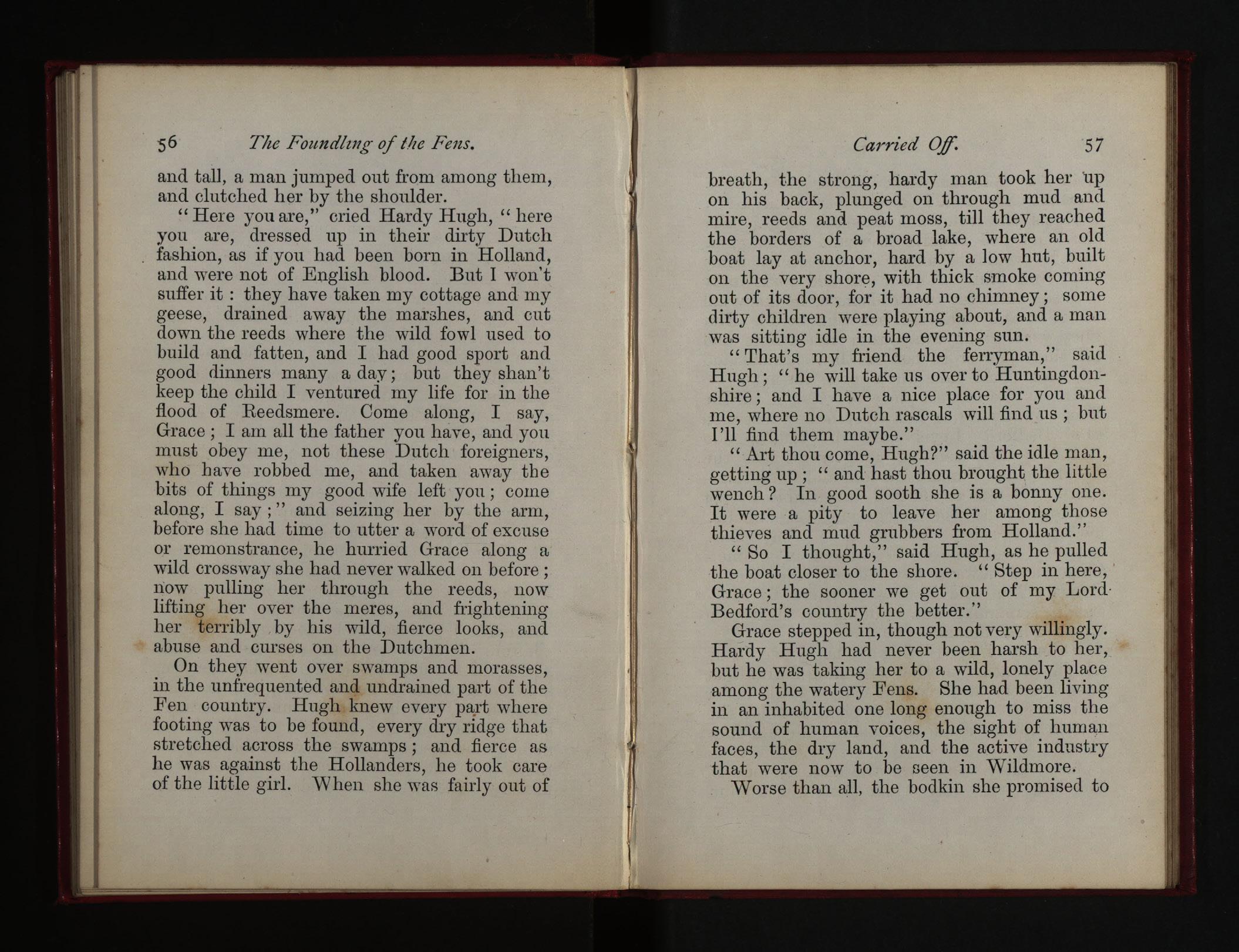
57
breath, the strong, hardy man took her "up on his back, plunged on through mud and mire, reeds and peat moss, till they reached the borders of a broad lake, where an old boat lay at anchor, hard by a low hut, on the very shore, with thick smoke commg out of its door, for it had no chimney; some dirty children were playing about, and a man was sitting idle in the evening sun." .
"That's my friend the ferryman, sald Hngh; "he will take us over to Huntingdonshire; and I have a nice for you and me, where no Dutch rascals wIll find us; but I'll find them maybe."
" Art thou come, Hugh?" said the idle getting up; "and hast thou brought the lIttle wench? In good sooth she is a bonny one. It were a pity to leave her among those thieves and mud grubbers from Holland."
"So I thought," said Hugh, as he pulled the boat closer to the shore. "Step in here, Grace; the sooner we get out of my LordBedford's country the better."
Grace stepped in, though not very willingly. Hardy Hugh had never been harsh to her, but he was taking her to a wild, lonely place among the watery Fens. She had living in an inhabited one long enough to mISS the sound of human Yoices, the sight of human faces the dry land, and the active industry that 'were now to be Geen in Wildmore.
W or8e than all, the bodkin she promised to
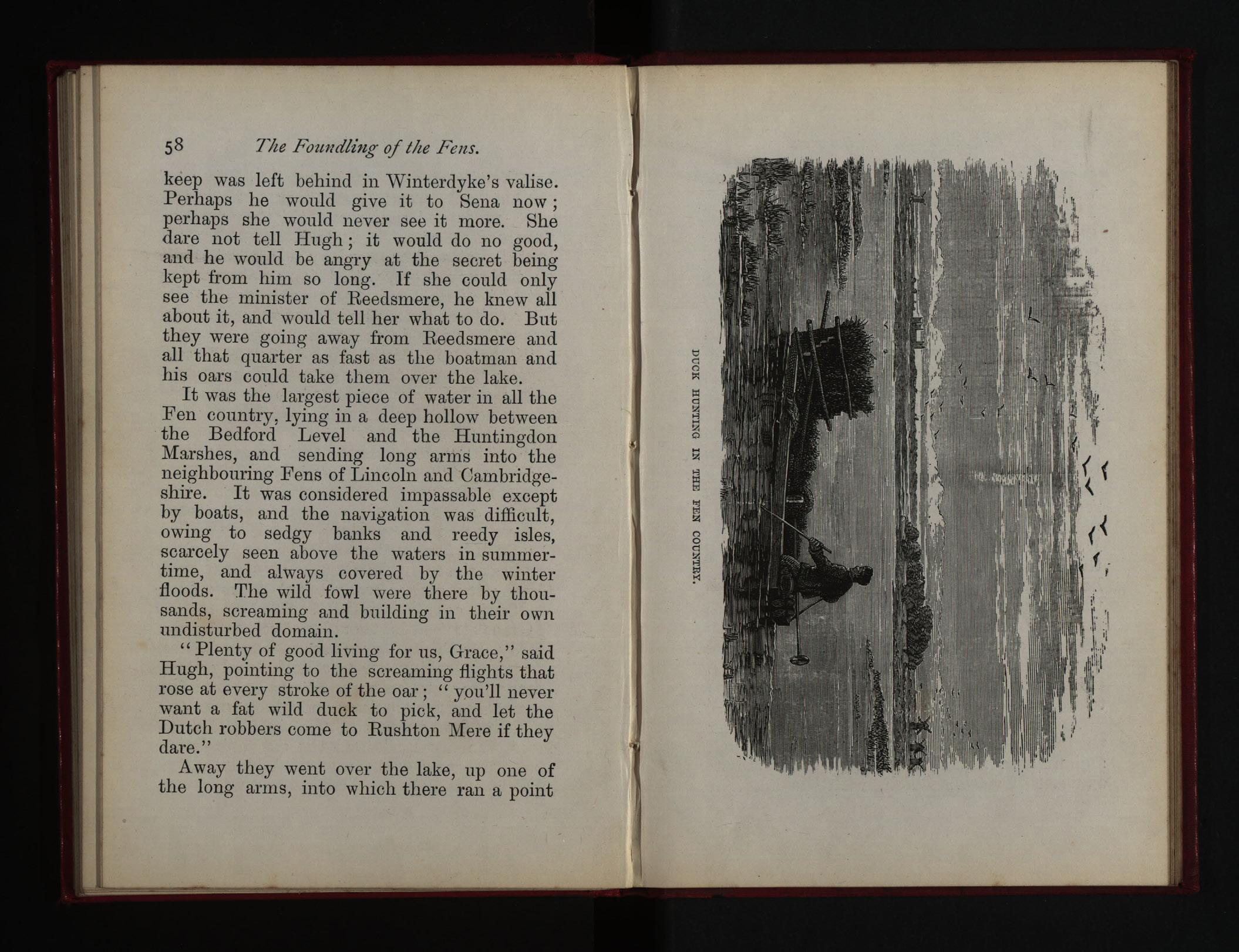
S8 The Fomtdlz'1tg of the Fells.
keep was left behind in Winterdyke's valise. Perhaps he would give it to Sena now; perhaps she would never see it more. She dare not tell Hugh; it would do no good, and he would be angry at the secret being kept from him so long. If she could only see the minister of Reedsmere, he knew all about it, and would tell her what to do. But they were going away from Reedsmere and all that quarter as fast as the boatman and his oars could take them over the lake.
It was the largest piece of water in all the Fen country, lying in a deep hollow between the Bedford Level and the Huntingdon Marshes, and sending long arms into the neighbouring Fens of Lincoln and Cambridgeshire. It was considered impassable except by boats, and the navigation was difficult, owing to sedgy banks and reedy isles, scarcely seen above the waters in summertime, and always covered by the winter floods. The wild fowl were there by thousands, screaming and building in their own undisturbed domain.
"Plenty of good living for us, Grace," said Hugh, pointing to the screaming flights that rose at every stroke of the oar; "you'll never want a fat wild duck to pick, and let the Dutch robbers come to Rushton Mere if they dare."
Away they went over the lake, up one of the long arms, into which there ran a point
60 7 he of the Fms. of high land, terminating in a great old rock, which looked like a tower in the distance. They rounded the rock, and at its foot lay a grassy nook, sheltered by some tall willowtrees, like those that grew in Wildmore. Farther inland, Grace could see the smoke of chimneys. There was a village, but no chmch spire thel'e; and. under the willows, and close against the rock, was a low hut, with walls of tmf and roof of reeds, not half the size of Hugh Hammerson's old cottage, but strongly resembling it.
"I built it myself last spring," said Hugh ; "this is the safest corner in all the Fens, and a man need never want for shelter while there is peat and reeds to be had. Yonder," he continued, pointing to where the smoke rose, "yonder is the village of Rushton; nobody but honest Fen folks live there; no Dutch knaves dare come to dig a dTain in all the Huntingdon marshes. You'll keep my house as you used to do in Wildmore, before they came and robbed me. I have no geese fOT you to keep, it is true, but there is plenty of wild ones to be got and eaten. Look here, what a nice house it is; there is a chimney and a window-there is no glass to be sure, but I'll get some scraped horn."
And he led Grace kindly in, showing her that the hut contained one room for kitchen and parlour, furnished with two large stones and a turf settle, which, with the addition
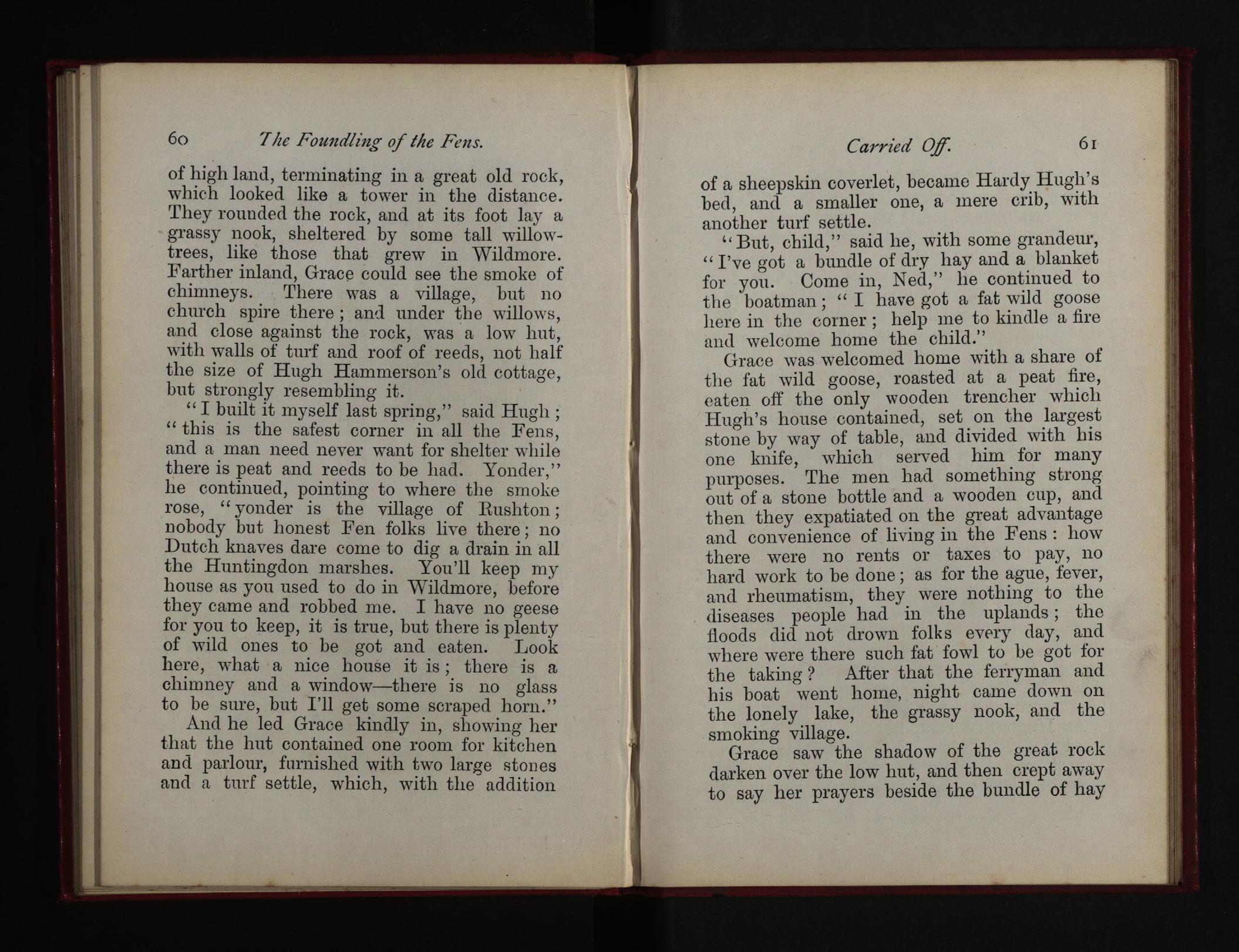
Carried Off. 61
of a sheepskin coverlet, became Hardy. bed and a smaller one, a mere CrIb, WIth , another turf settle.
"But, child," said he, with some grandeur, "I've got a bundle of dry hay and a. blanket for you. Come in, Ned," he to the boatman; "I have got a fat goose here in the corner; help me to kmcUe a fire and welcome home the child:'
Grace was welcomed home with a share of the fat wild goose, roasted at a peat eaten off the only wooden trencher WhICh Hugh's house contained, set on the stone by way of table, and with hIS one knife, which served hIm. for many purposes. The men had somethmg strong out of a stone bottle and a wooden cup, and then they expatiated. o?- great and convenience of hvmg 111 the Fens. how there were no rents or taxes to no hard work to be done; as for the fever, and l'heumatism, they were nothmg to the diseases people had in the uplands; the floods did not drown folks eVf.ry day, and where were there such fat fowl to be got for the taking? After that the ferryman and his boat went home, night came down on the lonely lake, the grassy nook, and the smoking village.
Grace saw the shadow of the great rock darken over the low hut, and then crept away to say her prayers beside the bundle of hay
62 The Foundling of the Fms. and the blanket. When that was done Grace lay down, not with a light heart, but quiet one. She knew that her Father above could protect her in the lonely waste, as He had done among the men of strange tongue and fashions; and Grace slept without fear till the screams of the rising wild-fowl came in through the unglazed window with the early daylight, when she got up and went about Hugh's housekeeping.
It was a strange lonely life she led once more, but not so lonely as it had been in Wildmore, after Dame Hammerson died. The village of Rushton was not half a mile off, it stood on a high dry land, a narrow ridge that rose above the surrounding marshes and ran out into the mere, terminating in that great rock against which Hugh's house was built. A steep rough path, not wider than a sheep.-track, led up from the grassy nook. where It stood to the village, which conSIsted of some score of huts little better than Hugh's, all but one, which "vas a cottage of three rooms with as many glazed windows. Over its door was the figure of a fowl rudely carved in wood, and the place was called "The Mother Goose" - an alehouse of great resort throughout the Huntingdon marshes.
As Hugh had said, nobody but Fen folks lived in Rushton. Whether they were honest or not Grace could not be sure, but none of them ever to be engaged in
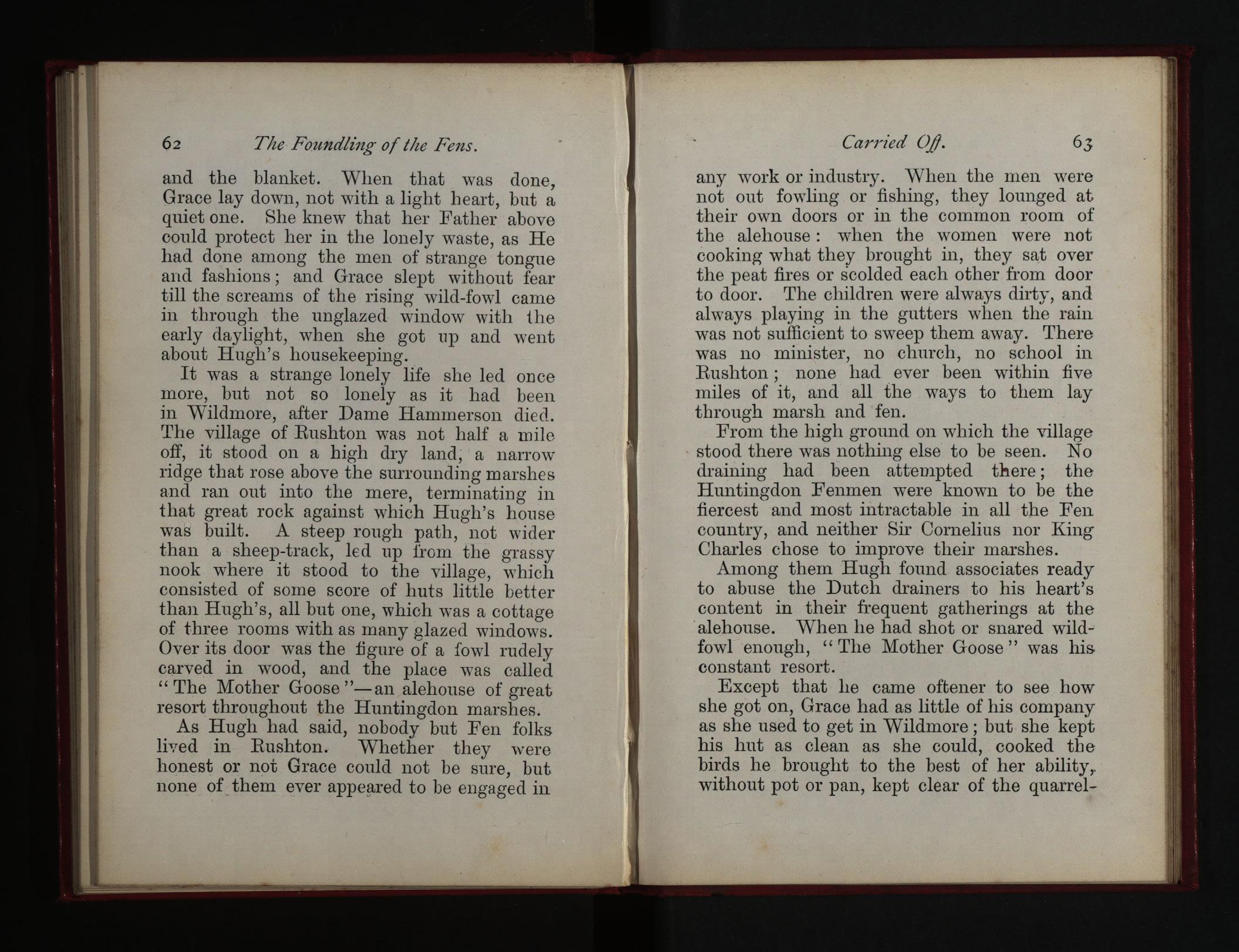
any work or industry. When the men were not out fowling or fishing, they lounged at their own doors or in the common room of the alehouse: when the women were not cooking what they brought in, they sat over the peat fires or scolded each other from door to door. The children were always dirty, and always playing in the gutters when the rain was not sufficient to sweep them away. There was no minister, no church, no school in Rushton; none had ever been within five miles of it, and all the ways to them lay through marsh and fen.
From the high ground on which the village stood there was nothing else to be seen. No draining had been attempted there; the Huntingdon Fenmen were known to be the fiercest and most intractable in all the Fen country, and neither Sir Cornelius nor King Charles chose to improve their marshes.
Among them Hugh found associate!:'! ready to abuse the Dutch drainers to his heart's content in their frequent gatherings at the alehouse. When he had shot or snared wildfowl enough, "The Mother Goose" was his constant resort.
Except that he came oftener to see how she got on, Grace had as little of his company as she used to get in Wildmore; but she kept his hut as clean as she could, cooked the birds he brought to the best of her ability,_ without pot or pan, kept clear of the quarrel-
The Foundling of the .Fens.
ling women and the dirty children, who gathered to stare at her when she happened to pass, tried to coax Hugh to show her the way to the nearest church, and \"hen he would not, saying it was too far off and dangerous she sat in the shadow of the rock on fine 'Sundays reading the Bible and Prayer-book which were in her hand when he pounced on her out of reeds. .
Sometimes she wondered If Sena mIssed her, if Winterdyke would bodkin safe, if the minister had ever mqmred after her, and how far it was to Dame Hammerson's grave. There was no getting across the lake, or Grace would have tried it. N ed, the boatman, sometimes' came to see Hugh, but he would not take her over. Hugh had scolded her for asking, and Grace was getting more afraid of him; for as the summer wore away his wrath against the Dutchmen seemed to be increasing.
When Hugh was not scolding them to Grace or somebody else, he was muttering threat.s and abuse of them to himself. She heard him and the Fenmen talking in the alehouse where Grace had gone more than once to him home when it got late-for the man would come peaceably with her and up drinking-in a strange way about ing the bailiff of Bedford on the grubbmg rascals, and swimming them down the Ouse back to Holland."
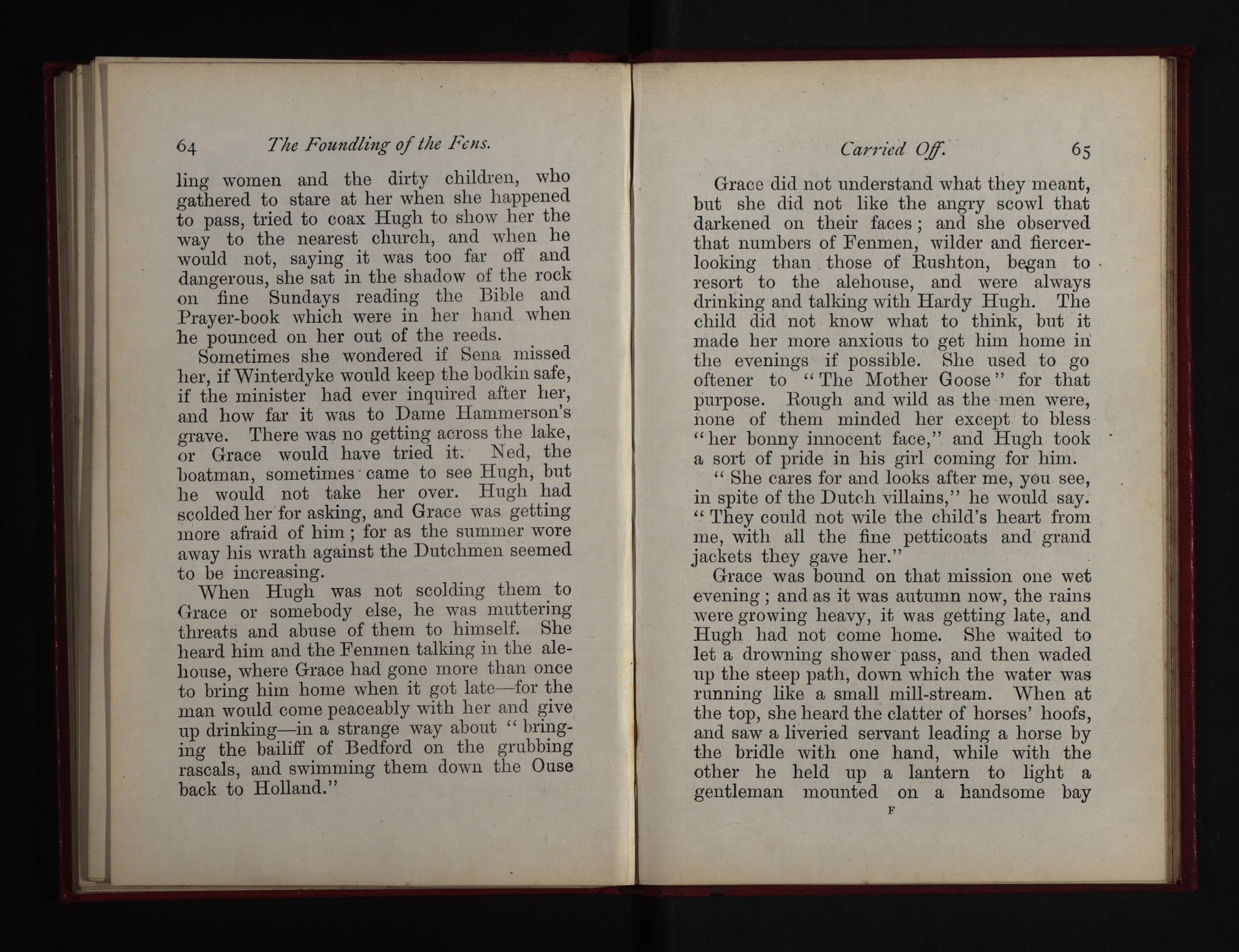
Grace did not understand what they meant, but she did not like the angry scowl that darkened on their faces; and she observed that numbers of Fenmen, wilder and fiercerlooking than those of Rushton, began to · resort to the alehouse, and were always drinking and talking with Hardy Hugh. The child did not know what to think, but it made her more anxious to get him home in the evenings if possible. She used to go oftener to "The Mother Goose" for that purpose. Rough and wild as the men were, none of them minded her except to bless "her bonny innocent face," and Hugh took a sort of pride in his girl coming for him. " She cares for and looks after me, you see, in spite of the Duteh villains," he would say. " 1".'hey could not wile the child's heart from me, with all the fine petticoats and grand jackets they gave her."
Grace was bound on that mission one wet evening; and as it was autumn now, the rains were growing heavy, it was getting late, and Hugh had not come home. She waited to let a drowning shower pass, and then waded up the steep path, down which the water was running like a small mill-stream. When at the top, she heard the clatter of horses' hoofs, and saw a liveried servant leading a horse by the bridle with one hand, while with the other he held up a lantern to light a gentleman mounted on a handsome bay F
66
The FOlt1tdlz'ng oj the FC1lS.
horse, and dressed like a nobleman of that period, in a fine scarlet cloak and beaver hat and plume. But Grace could see there were pistols in his holsters, and a valIse far larger and newel' than Winterdyke's strapped behind him.
"Do you live here, my little girl?" he said, stopping his horse as she came up. Grace thought she had never seen such a. handsome and noble-looking gentleman.
"Yes, sir; just at the foot of the path, close by the great rock."
" Then perhaps you could tell me which is the shortest way to Wildmore from this place?" the geJ?-tleman. .
"To Wl1dmore S11"? There IS no short , " way that I know. you going there? .
"Yes, my little glrl, I am; but there IS, there must be a short way. Come now, tell me the truth, and I'll give you a crown . " plece.
" I don't want a crown piece for telling the truth" said Grace. "If there is a short way to Wildmore I know nothing about it. I wish I did, for there are people there I should like to hear from. Perhaps you know them, sir -Mr. Winterdyke, the head of the Dutch and his daughter Sena?"
"I know Mr. ,Vinterdyke," said the gentleman, smiling, as the servant held up the lantern and cast its light full on Grace; ",' and I am going there this night, if I can, to
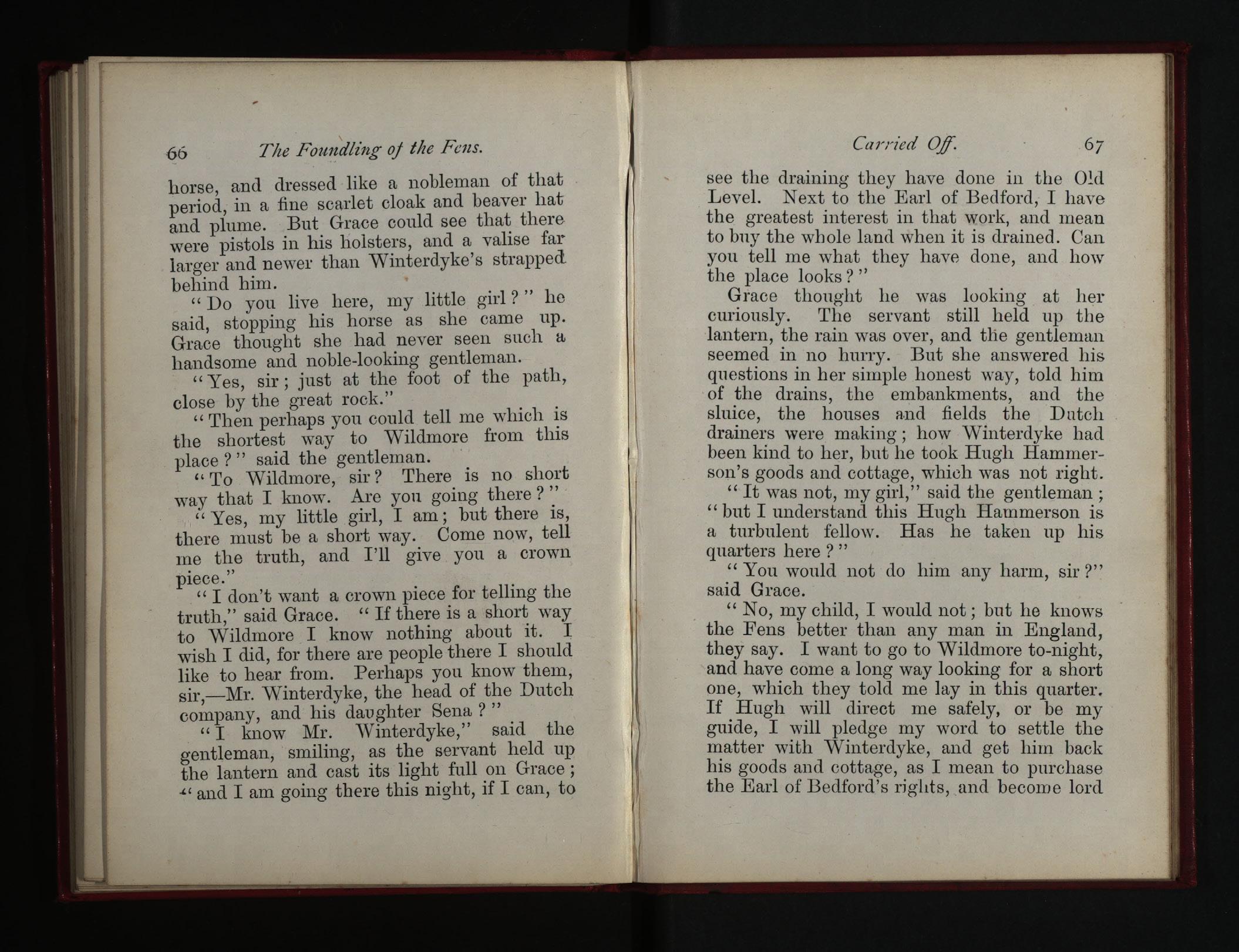
see the draining they have done in the O!d Level. Next to the Earl of Bedford, I have the greatest interest in that work, and mean to buy the whole land when it is drained. Can you tell me what they have done, and how the place looks?"
Grace thought he was looking at her curiously. The servant still held up the lantern, the rain was over, and the gentleman seemed in no hurry. But she answered his questions in her simple honest way, told him of the drains, the embankments, and the sluice, the houses l'md fields the Dutch drainers were making; how Winter dyke had been kind to her, but he took Hugh Hammerson's goods and cottage, whioh was not riaht.
" It was not, my girl," said the " but I understand this Hugh Hammerson a turbulent fellow. Has he taken up his quarters here? "
" You would not do him any harm, sir?" said Grace.
" No, my child, I would not; but he knows the Fens better than any man in England, they say. I want to go to Wildmore to-night and have come a long way looking for a short one, which they told me lay in this quarter. If Hugh will direct me safely, or be my guide, I will pledge my word to settle the with vVinterdyke, and get him back hIS goods and cottage, as I mean to purchase the Earl of Bedford's rjgllts, and become lord
68 The Fou1ldlillg" of the Fells. of the soil. My name is Sir George Barclay. You may have heard the drainers speak of me as one who had a great interest in the work, though I have never yet seen it, having been abroad in the German war these ten years past,"
Grace had heard the name mentioned among those of the noblelllen and gentry who subscribed large sums for the draining of the Fens. Winterdyke used to speak of him with peculiar honour, on account of his liberal subscription; and she had heard him tell one of Lord Bedford's men that he was of a Scotch family, and a valiant gentleman, who had gone to fight for the Protestant cause in Germany, where the Thirty Years' War was then raging, having left his country, as some thought, for sorrow, because his lady and his only child had been lost at sea when coming home to him from Flanders, where they had relatives. She recollected all this at the moment; but the getting back of Hugh's cottage, and the making peace between him and Winter dyke , was a far more important thing to Grace, and she joyfully answered-
"Come along with me to 'The Mother Goose,' sir, if you please. Hugh is there, and I am sure he will be glad to guide or do anything you like if you get him back his own."
"Perhaps he would get my gold bodkin b:1Ck," thought Grace.
The man looked so honourable and yet so
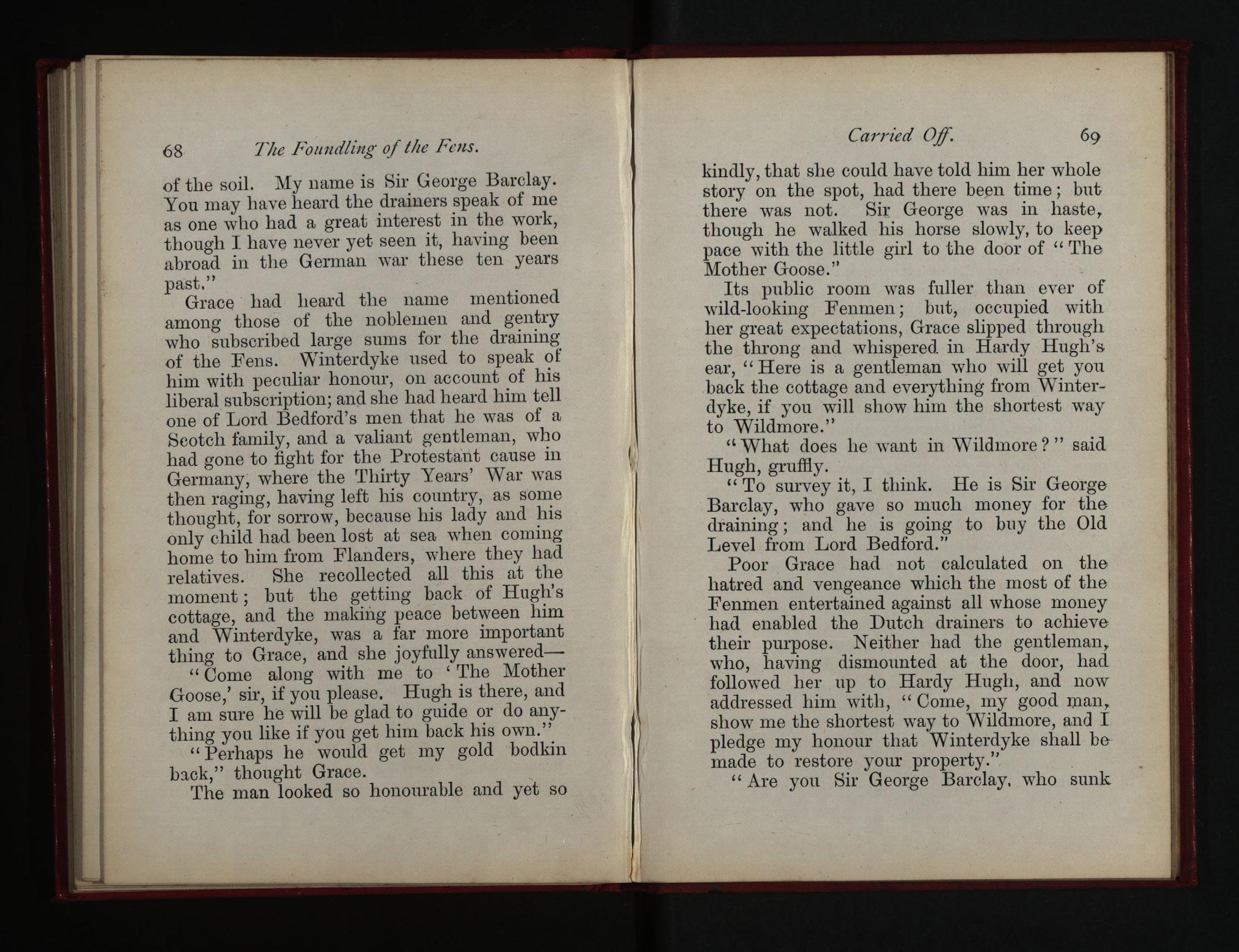
kindly, that she could have told him her whole story on the spot, had there been time' but there was not. Sir George was in though he walked his horse slowly, to keep pace with the little girl to the door of "The Mother Goose."
Its public l'oom was fuller than ever of wild-looking Fenmen; but, occupied with her great expectations, Grace slipped through the whispered. in Em'dy Hugh's ear, Here IS a gentleman who will get you back t?e and everything from Winterdyke, If you wdl show him the shortest way to Wildmore."
"What does he want in Wild more ?" said Eugh, gruffly.
"To survey it, I think. He is Sir George Bal:cl.ay, who gave so much money for the drammg; and he is going to buy the Old Level from Lord Bedford."
Poor Grace had not calculated on the hatred and vengeance which the most of the Fenmen entertained against all whose money had enabled the Dutch drainers to achieve their purpose. N either had the gentleman who, having dismounted at the door, had followed up to Hardy Hugh, and now addressed hIm with, "Come, my good show me the shortest way to Wildmore, and I pledge my honour that Winterdyke shall be made to restore your property."
"Are you Sir George Barclay, who sunk
The Fozmdf£llg- of the Fells. so much money in the Dutch drains?" demanded Hugh, surveying him from head to foot without the slightest token of respect.
"I am " said the gentleman.
"TheI; I'll see you in the deepest and dirtiest swamp between this and the German Sea or ever I show you a step of the way to Wildmore !" replied Hugh; and turning to Grace he shouted, ,e Go home, you treacherous girl! How dare you come with such a message to me? You have learned the Dutch tricks with living among them, but 1'11--"
Poor Grace heard no more, for she flew out of the house, frightened by his fierce shouts and flashing eyes; but she did hear the man's servant say, as an uproar rose InsIde, and his master walked calmly out, " .Let ns fire on the rascals, your honour."
"Fire, Simpson? ., said Dir GeOl'ge, mounting his horse with the bound of one accustomed to it. "Have you been preserved throuah so many bloody battles in Germany, to the honour of a soldier and the temper of a Christian so far as to think of firing on unarmed churls? Come away; we must retrace our steps to the Bedford Road. It is a good lesson against looking for short cuts. Here, my little girl," flinging Grace a crown piece as he rode away. "I am SOlTY you should get anger on my account; but don't cry, and run home, or the rain will l " nrown you.
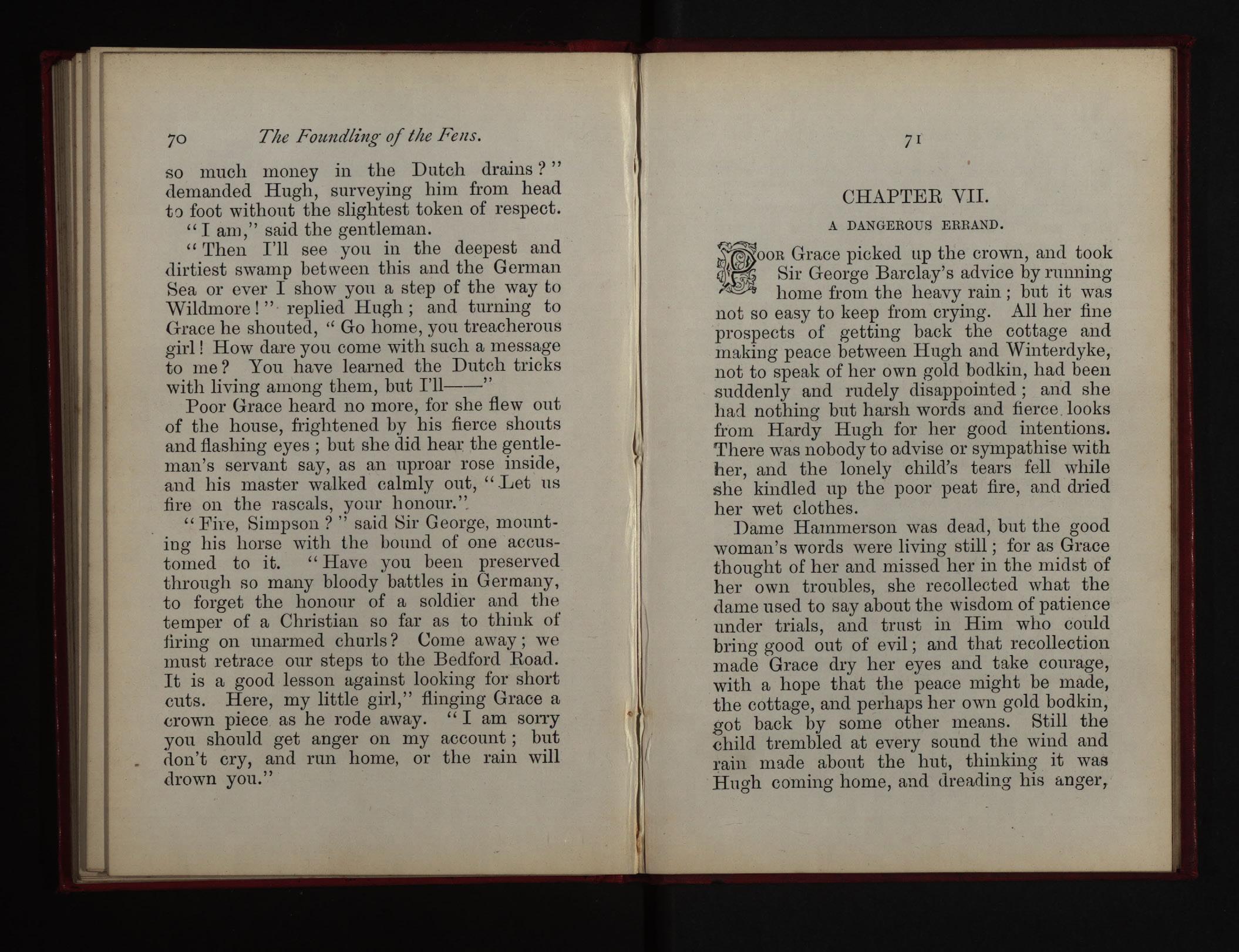
A DANGEROUS ERRAND.
Grace picked up the cr?wn, and t?ok Sir GeOl'ge Barclay's adVIce by runnmg home from the heavy rain; but it was not so easy to keep from crying. All her fine prospects of getting back the and making peace between Hugh and Wmterdyke, not to speak of her own gold bodkin, had been suddenly and rudely disappointed; and she had nothin a but harsh words and fierce looks from Hardy Hugh for her good intentions. There was nobody to advise or sympathise with her, and the lonely child's tears fell she kindled up the poor peat fire, and drIed her wet clothes.
Dame Hammerson was dead, bnt the good woman's words were living still; for as Grace thought of her and mi3sed her in the midst of her own troubles, she recollected what the dame used to say about the wisdom of patience under trials and trust in Him who could bring good of evil; and that recollection made Grace dry her eyes and take courage, with a hope that the peace might be made, the cottage and perhaps her own gold bodkin, got back by some other means. the child trembled at every sound the wmd and rain made about the hut, thinking it was Hngh coming home, and c1reading his anger,
The Fozmdlillg· of th e FeJls.
fo l it had never turned so fiercely on her before.
But the evening wore away, and he did not come. Grace had a notion that he and the Fenmen were staying at "The Mother Goose," drinking in triumph over Sir George Barclay's repulse. She did not guess what else they were about; but when her sorrow and her fear had subsided sufficiently, the lonely little girl fastened the door with its wooden bar against the driving rain and strong wind-for the night had become a perfect storm-said her prayers, and went to sleep ·on the bundle of hay.
About daybreak she heard Hardy Hugh knocking at the door, and crying, "Let me in, child; I want my gun; the wild geese will be off early this morning, but they shan't go WIthout leaving a couple of fat ones with me."
Grace rose and opened the door: there were five or six Fenmen with him. It was evident they had been drinking all night; but they knew that the wild geese were going, and every man had his matchlock. Hugh took down his, walking as steadily as he could, bade Grace to be a good girl, and mind no more strangers; and as she looked after them, through the stormy morning, they all I'ollllded the rock by a narrow strip of sand, on which the water was rapidly rising, and seemed to go down into the mere. Grace crept round the rock, and saw them wading
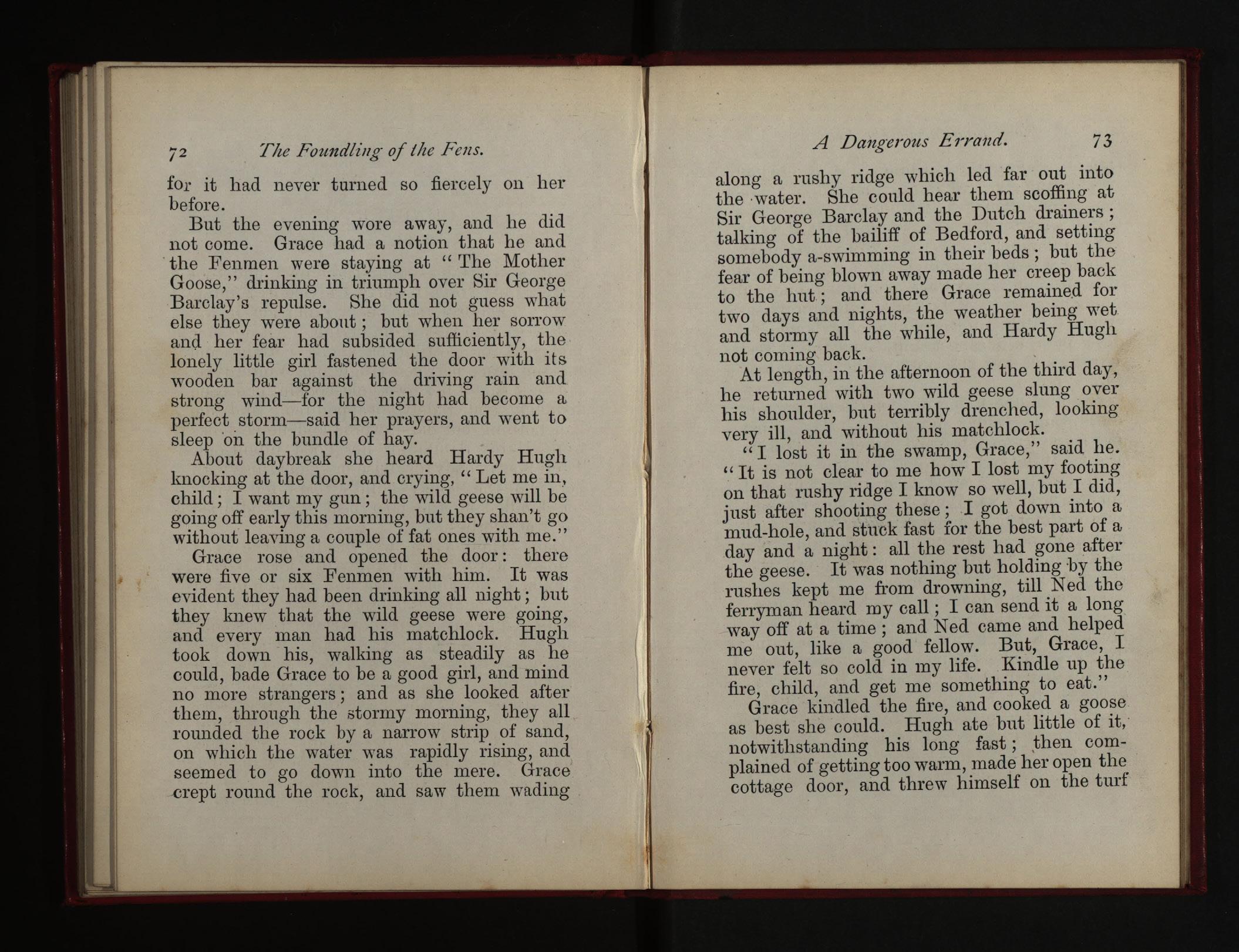
A Dang-erous E rra1ld. 73 along a rushy ridge which led far out into the ·water. She could hear them scoffing at Sir George Barclay and the Dutch drainers; talking of the bailiff of Bedford, and setting somebody a-swimming in their beds; but the fear of being blown away made her creep back to the hut; and there Grace remained for two days and nights, the weather being wet and stormy all the while, and Hardy Hugh not coming back.
At length, in the afternoon of the third day, he returned with two wild geese slung over his shoulder, but terribly drenched, looking very ill, and without his matchlock.
"I lost it in the swamp, Grace," said he. "It is not clear to me how I lost my footing on that rushy ridge I know so well, but I did, just after shooting these; I got down into a mud-hole, and stuck fast for the best part of a day and a night: all the rest had gone after the geese. It was nothing but holding 'by the rushes kept me from drowning, till Ned the ferryman heard my call; I can send it a long way off at a time; and N ed came and helped me out, like a good fellow. But, Grace, I never felt so cold in my life. Kindle up the fire, child, and get me something to eat."
Grace kindled the fire, and cooked a goose as best she could. Hugh ate but little of it; notwithstanding his long fast; ,then complained of getting too warm, made her open the cottage door, and threw himself on the turf
74 Tlte FUlmd/lug 0/ the relts.
settle. Before the evening, it was evident that his long exposure in the mud-hole and previous intemperance had brought on an attack of the marsh fever. Poor Hugh burned with heat one hour and shivered with cold the next.
There was no doctor within many miles of Rushton, but the village contained one old woman, known to its rude inhabitants as Widow Crutch, on account of her lameness. She kept the cleanest hut, had the fewest 9.ua:rrels, and was the only medical authority In It.
" Go up and ask her to come and see me child.," said Hugh, on whose hardy spirit great fears seemed to have fallen. "This is the seventh fever I have got, and few get over the seventh. I wish I · had taken myoId woman's advice, and lived more soberly-all this would not have come; but she's dead and gone, and I have nobody but you, child. Go up to Widow Crutch, and help her down the steep path as well as you can."
Grace went up, found the widow at home got her to the hut some difficulty; fOl' the steep path was shppery with rain. The good woman's repute for medical skill was well merited.. She had considerable experience in the prevalent diseases of the Fens, and more honesty than the generality of such practitioners. She told Hugh his fever was a dangerous one, advised him to keep his mind quiet, to put his trust in
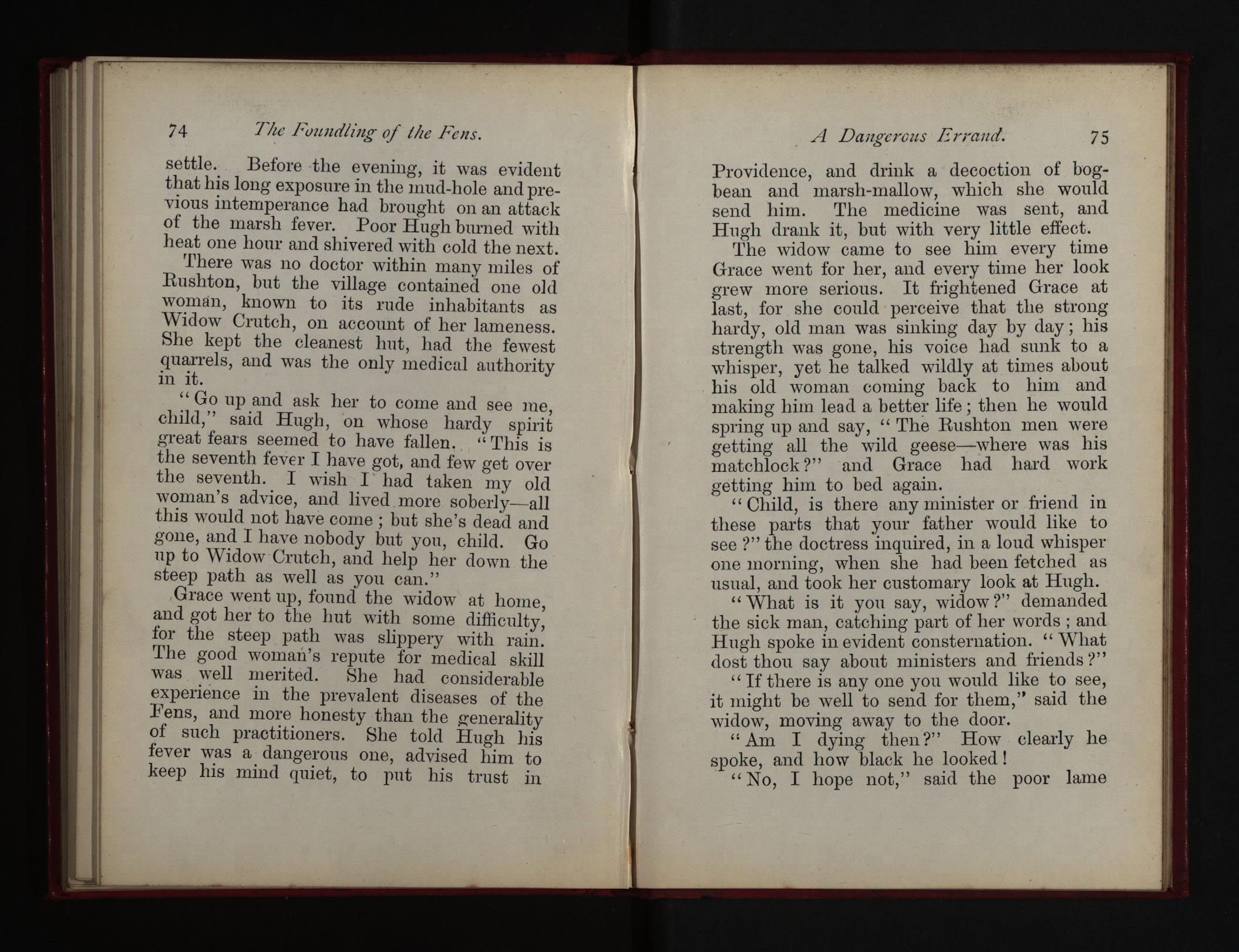
Providence and drink a decoction of bogbean and' marsh-mallow, which she would send him. The medicine was sent, and Hllgh drank it, but with little
The widow came to see hIm every tIme Grace went for her, and every time her look grew more serious. It frightened Grace at last, for she could perceive that the hardy old man was sinking day by day; hIS strength was gone, his v?ice had. sunk to a whisper, yet he talked WIldly at about his old woman coming back to hIm and making him lead a better life; then he would spring up and say, "The Rushton men getting all the wild geese-where was hIS matchlock?" and Grace had hard work getting him to bed again.. . .,
"Child is there any mmIster or fnend In these pa;ts that :rour. would lik.e to see ?" the doctress Inqmred, In a loud whIsper one morning, when she had been fetched as usual, and took her customary look at Hugh.
"What is it you say, widow?" demanded the sick man catching part of her words; and Hllgh spoke in evident ?o?-sternation .." dost thou say about mIlllsters and. frIends?
" If there is anyone you would lIke to see, it miaht be well to send for them," said the o widow, moving away to the door.
"Am I dying then?" How clearly he spoke and how black he looked!
" No, I hope not," said the poor lame
7 6 Tlte Foztndlz"llg' of the Fens. widow, getting fri€:?htened in her turn; "but you know we all dIe; and this is a sad fever of yours. I have tried my best herbs on it St. John's wort and featherfew, but they .you ; p.ut your trust in e LOl d, If there IS any ffIend or minister you would lIke to have, I say again, it might be well to send for them. Grace, child come and help me home." ,
When Grace returned from that duty she foun.d on his bed, and hI,msel!, We all die, and I must; but I t thmk it was to come so soon. ' Trust m the. Lord,' she said. I didn't trust Him when I was well and strong; I didn't mind myoId woman, all the good thinas she told me wanted me to do; I was kind to her. eIther: but this last business I have in hand IS worse. They'll do it, whether I am there or no; and they are sure to get water enough after the rain we have had Wh t . the weather like, Grace ?" . a IS
" mist and half rain, with no wind at all, saId poor Grace, truly describing those so frequent at the beginning o the ] en wlllter, so sure to bring down floods from the uplands, and such fatal helpers of the marsh fever.
." Mist and rain, and no wind said Hugh a groan startled her. "The WIll come down a to-night; they will be all drowned III theIr beds."
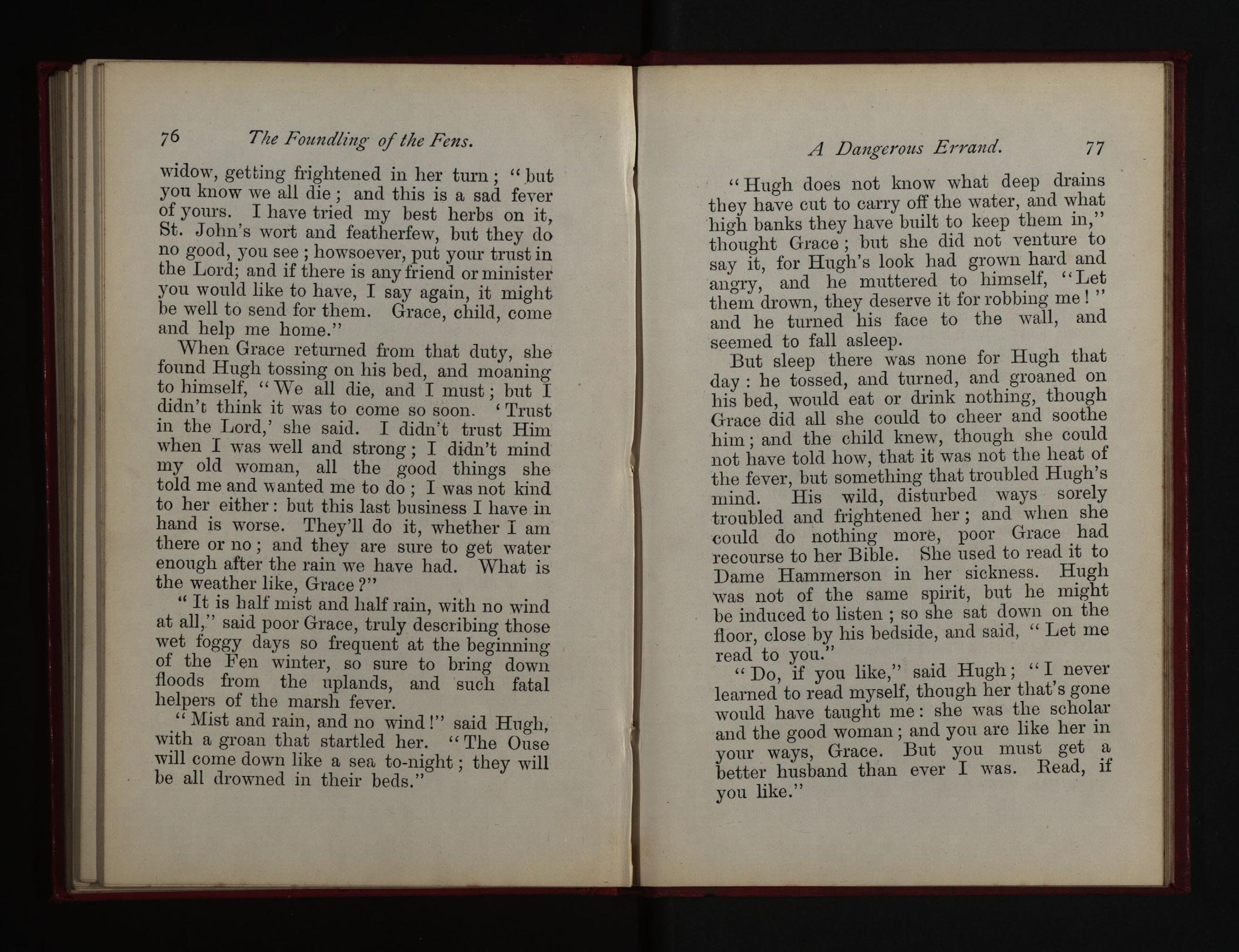
A Dangerous Errand. 77
"Hugh does not know what deep drains they have cut to carry off the water, and what high banks they have built to keep them in," thought Gmce; but she did not venture to say it, for Hugh's look had grown hard and angry, and he muttered to himself, '( Let them drown, they deserve it fOl' robbing me! " and he turned his face to the wall, and seemed to fall asleep.
But sleep there was none for Hugh that day: he tossed, and turned, and groaned on his bed, would eat or drink nothing, though Grace did all she could to cheer and soothe him; and the child knew, though she could not have told how, that it was not the heat of the fever, but something that troubled Hugh's mind. His wild, distm'bed ways sorely troubled and frightened her; and when she could do nothing more, poor Grace had recourse to her Bible. She used to read it to Dame Hammerson in her sickness. Hugh was not of the same spirit, but he might be induced to listen; so she sat down on the floor, close by his bedside, and said, "Let me read to you."
"Do, if you like," said Hugh; "I never learned to read myself, though her that's gone would have taught me: she was the scholar and the good woman; and you are like her in your ways, Grace. But you must get a better husband than ever I was. Read, if you like."
7 8 Tlte Foulldli7:g- oJ the .[<"{!1ls.
Grace. read on, though the twilight of the short day was falling dim with mist and and ther: was a dreamy moaning sound lIke far-off wmds or waters ()omin'" up from the mere. Grace sat close to b the window to get the last of the light on her book; her face was turned away from Hugh but he lay quietly listening to the words of our Lord, which the child read in a low clear in that lonely hut, with the deepening tWIlIght and the moaning wind.
Grace was reading the Beatitudes and Hugh was quietly listening; but she came to '.' Blessed are the merciful, for they shall obtam mercy," he started up in his bed exclaiming, "What is that you say, child
Grace rea.d o,:"er the passage in strange terror, for hIS VOIce sounded wilder than the outside. Before she had finished it, the sICk man had sprung out of bed, seized his doublet, made an effort to put it on; but his strength was not sufficient to the exertion: poor Hugh lost his balance, and fell backward on the turf settle.
" What is it?" said Grace, running to him. "What do you want to do? Can I do it?"
." Oh, Grace, the man groaned, as WIth her help he trIed to get up again; "I must get on my doublet· I must go to Wildmore. " '
"To Wildmore!" said Grace, belieyinO' that the fever had got into his brain. " It
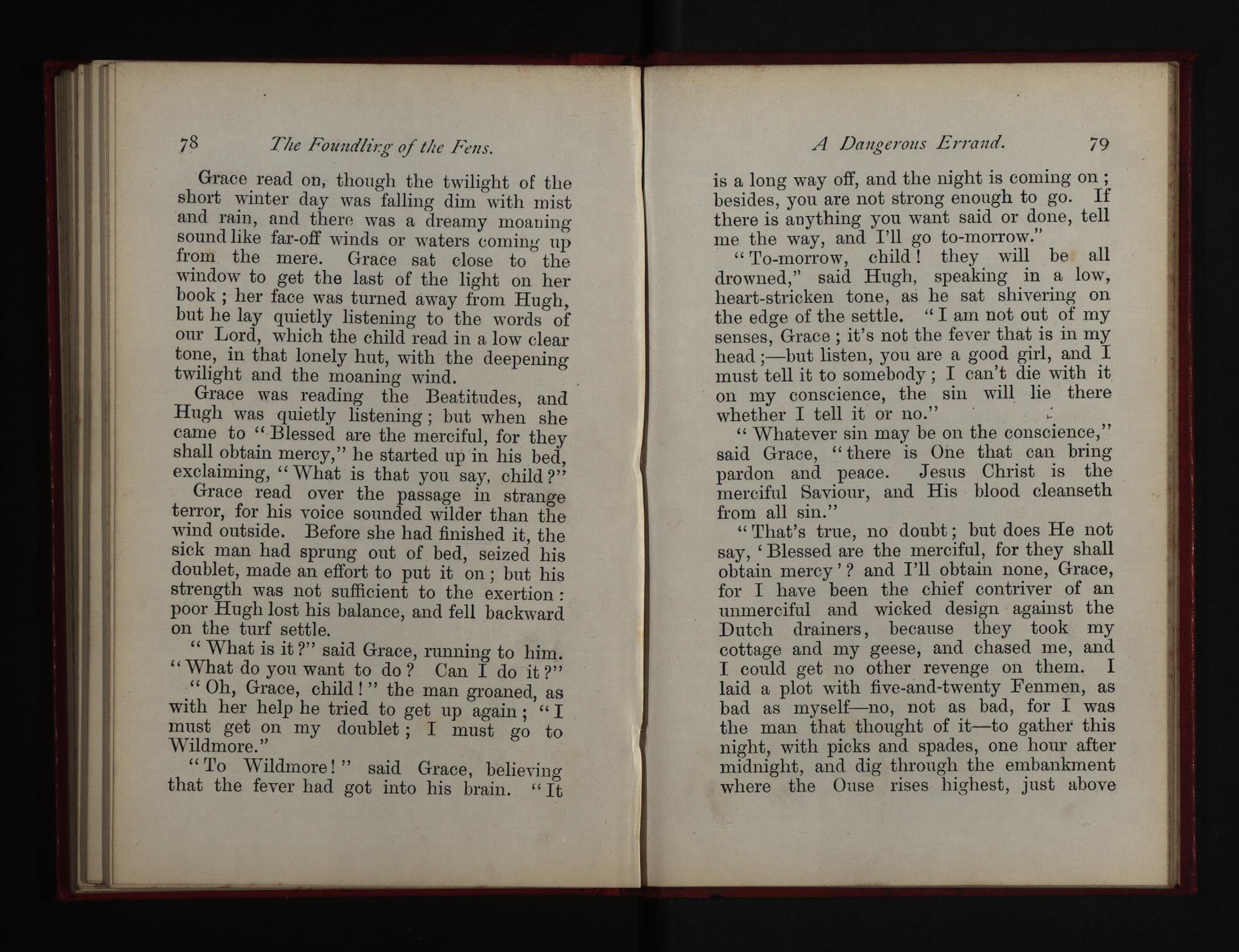
A Da1lg erolts Errand. 79
is a long way off, and the night is coming on ;. besides, you are not strong enough to go. If there is anything you want said or done, tell me the way, and I'll go to-morrow."
" To-morrow, child! they will be all drowned," said Hugh, speaking in a low, heart-stricken tone, as he sat shivering on the edO'e of the settle. " I am not out of my senses 0 Grace; it's not the fever that is in my head ._'but listen, you are a good girl, and I must 'tell it to somebody; I can't die with it on my conscience, the sin will, lie there whether I tell it or no." .:
" Whatever sin may be on the conscience," said Grace, "there is One that can bring pardon and peace. Jesus Christ is the merciful Saviour, and His blood cleanseth from all sin."
"That's true, no doubt; but does He not say, 'Blessed are the merciful, for they shall obtain mercy'? and I'll obtain none, Grace, for I have been the chief contriver of an unmerciful and wicked design against the Dutch drainers, because they took my cottage and my geese, and chased me, and I could get no other revenge on them. I laid a plot with five-and-twenty Fenmen, as bad as myself-no, not as bad, for I was the man that thought of it-to gather this night, with picks and spades, one hour after midnight, and dig through the embankment where the Ouse rises highest, just above
80 Tlte Fou:ldling- oj the Fens.
Wildmore. That will bring down such a flood as the isle never saw before, for the Dutchmen's works and drains have made the river higher than it ever was at those parts. My own cottage, and YVinterdyke in it, must be swept away, and .every soul in the Old Level drowned in their beds, if the men do it; and I know they will, for they are everyone sworn to it; and whether I am there or not the sin will be on my head for ever. Oh, Grace, if anybody will go to Wildmore and warn the Dutch before the Fenmen came. There are seven hours yet; and I know a short way, though it is dangerous."
" I'll run up to the village and get somebody to go," said poor Grace.
" Stop, child," said Hugh, grasping at hljr clothes; "there's not a soul in Rushton would stir hand or foot to save the drainers' lives. The men would kill you and me, if they thought I had told you. They'll call me traitor, any way; and they will have a right; but I cannot die with that weight on my conscience. Give me my doublet; I'll creep to Wildmore, if it should be on my hands and knees."
" Couldn't I go ? " said Grace, as the terrible necessities of the case became plain to her. Poor Sena, who had been her kindly companion; YVinterdyke, who perhaps did not mean to keep the cottage and the bodkin; all the honest Dutchmen, who had been so
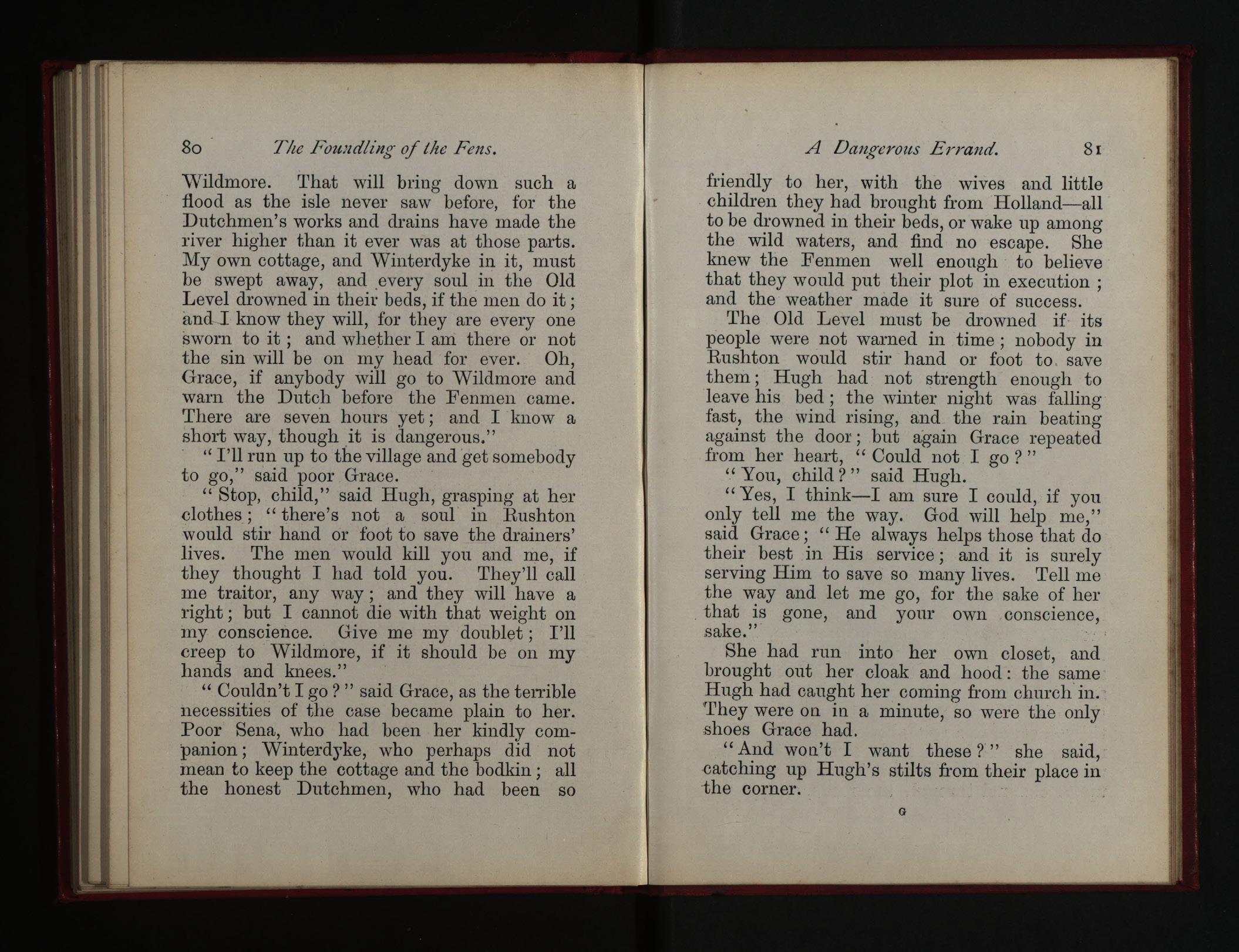
A Dangerous Errand. 81
friendly to her, with the wives and little children they had brought from Holland-all to be drowned in their beds, or wake up among the wild waters, and find no escape. She knew the Fenmen well enough to believe that they would put their plot in execution; and the weather made it sure of success.
The Old Level must be drowned if its people were not warned in time; nobody in Rushton would stir hand or foot to save them; Hugh had not strength enough to leave his bed; the winter night was falling fast, the wind rising, and the rain beating against the door; but again Grace repeated from her heart, "Could not I go?"
"You, child?" said Hugh.
"Yes, I think-I am sure I could, if you only tell me the way. God will help me," said Grace; "He always helps those that do their best in His service; and it is surely serving Him to save so many lives. Tell me the way and let me go, for the sake of her that is gone, and your own conscience, sake."
She had run into her own closet, and brought out her cloak and hood: the same Hugh had caught her coming from chmch in. They were on in a minute, so were the only shoes Grace had.
"And won't I want these?" she said, catching up Hugh's stilts from their place in the corner.
G
He leaned back in his beu, and looked at her by the rising light of the fire. "Al:t thou not afraid, child, to venture alone m the night over swamps and morasses? The nearest way to Wildmore from this is good five miles."
" Yes but the Dutch people will be drowned, and there is nobody else to go. Tell me the way, and God will help me," said Grace.
"Mavbe He will, child; the errand is a good one, and thou art innocent: listen, then," said Hugh. "You know that rushy l'idge that runs out into the mere from the foot of the rock; it seems to go deep down under the water, but it does not; the rushes only get shorter, and the ridge is firm ground, though not mOTe than three feet wide in some places. If you can wade along that path, and not go off to either side, which would be sure to drown you, it will lead you across the narrowest part of the mere to Bedford Moss ;, if you keep to the right there it is ground, with only a muddy pool or two, WhICh the stjlts would help you over; but don't stray to the left, for the moss is wet there, and there are swamps you could never get through. Keep to the right over the moss till you come to a reedy brake, and hear running: it is but a little stream; the ram may have swollen it, but it is not deep; wade up its channel through the reeds, and you'll
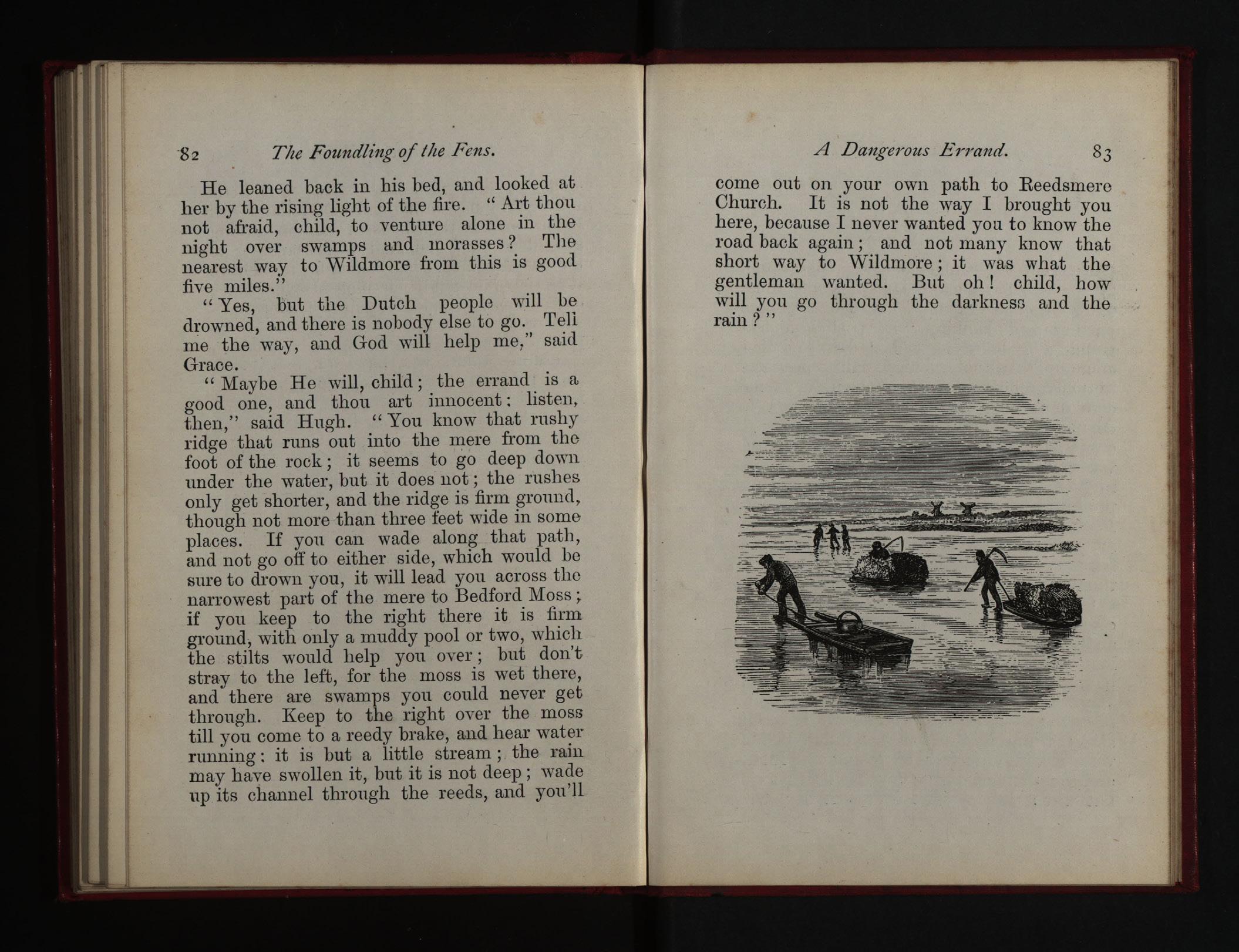
A Da1tgerous Errand.
come out on your own path to Reedsmere Church. It is not the way I brought you here, because I never wanted you to know the road back again; and not many know that short way to Wildmore; it was what the gentleman wanted. But oh! child, how will you go through the darknesG and the rain? "
The Foundling of the Fens.
THE BODKIN'S EVIDENCE.
iRACE felt the danger of the undertaning, but Sena and the Dutch people must not be drowned. Was not it graven on her own bodkin, "Fear God and fear nothing" ? She kept her heart and courage up with that, made Hugh repeat hIS directions, rehearsed them herself, to make sure of not missing the wild, unknown way, overcame his scruples with declarations that she was not at all afraid, placed a mug of water within his reach, bade him a goodnight, heaped up peat on the fire, and promised to come back as soon as she could. Poor Hugh uttered the first prayer he had made for many a year for her safety and success. It was hard to leave him alone there, but the thing must be done.
Grace carefully shut the door, drew her cloak closer about her, for the rain was heavy and the wind strong, and marched on gallantly with the stilts under arm, and a prayer in her heart that she mIght find the way. She did find the rushy ridge at the foot of the rock: it was terrible work, wading alonD' through the fierce wind and rising with the fear of losing her footing, and the thought of the depth on either side; lmt when t,hese terrors overcame her, Grace
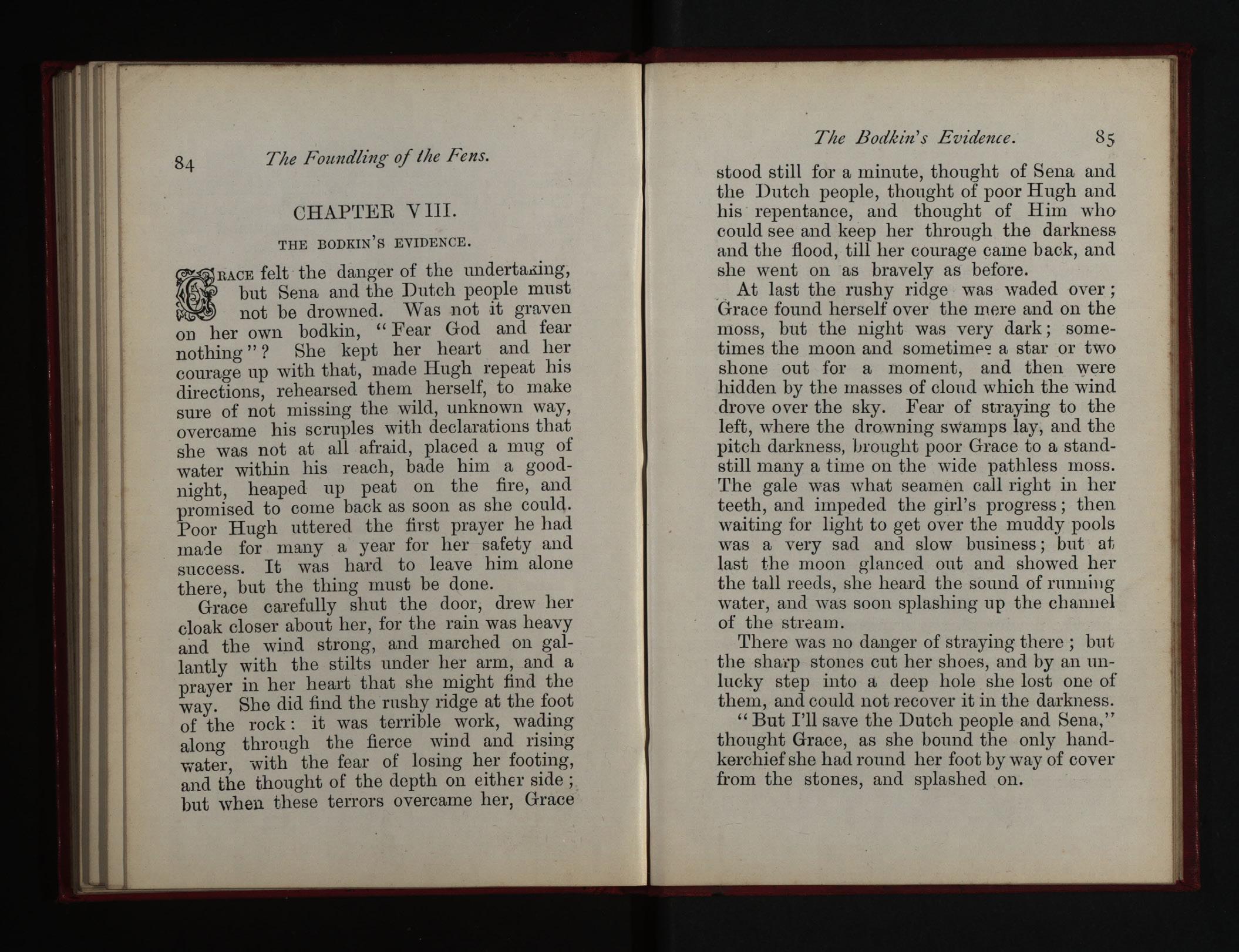
The Bodkin's Evidence. 8S stood still for a minute, thought of Sena and the Dutch people, thought of poor Hugh and his repentance, and thought of Him who could see and keep her through the darkness and the flood, till her courage came back, and she went on as bravely as before.
.. At last the rushy ridge was waded over; Grace found herself over the mere and on the moss, but the night was very dark; sometimes the moon and sometimpc; a star or two shone out for a moment, and then were hidden by the masses of cloud which the wind drove over the sky. Fear of straying to the left, where the drowning swamps lay, and the pitch darkness, ])l'Ought poor Grace to a standstill many a time on the wide pathless moss. The gale was what seamen call right in her teeth, and impeded the girl's progress; then waiting for light to get over the muddy pools was a very sad and slow business; but at last the moon glanced out and showed her the tall reeds, she heard the sound of rnnnillg water, and was soon splashing up the chan11e1 of the stream.
There was no danger of straying there; but the shafp stones cut her shoes, and by an nnlucky step into a deep hole she lost one of them, and could not recover it in the darkness.
"But I'll save the Dutch people and Sena/' thought Grace, as she bound the only handkerchief she had round her foot by way of cover from the stones, and splashed on.
86 The Foundling of the Fens.
Many a bruise and many a tear the poor child got between the flints below and the marsh brambles and reeds on either side; but her heaTt rejoiced when, through a storm of sleet and rain, the qllivering moonlight gleamed on her old accustomed path, and she knew there was firm grounrl. under her feet all the way to Wildmore.
Grace could not tell what hour of the night it was; she was sore wearied and wet to the skin, rags of her clothes and hairs from her head had been left on many a sharp reed and bramble, but Grace drew near to the wellknown spot with gladness and great joy.
. Slow as her progress had been, she had come before the Fenmen. The rain had ceased, the moon was shining on tho roofs of the Dutchmen's houses, and on the cottage that had been Hugh's.
There was not a sound to be heard but the wind sighing among the willow trees, and the long, hollow moan of the Ouse; its waters were level with the highest embankment, and slowly flowing through the open sluice into the flood drain. It was indeed like a sea, sufficient to drown the Old Level deeper than ever it had been drowned since the first of the Hammersons settled there; and the warner had come one hour before the destroyers, for as Grace began thundering at the door with her stilts, Winterdyke's Dutch clock within struck twelve.
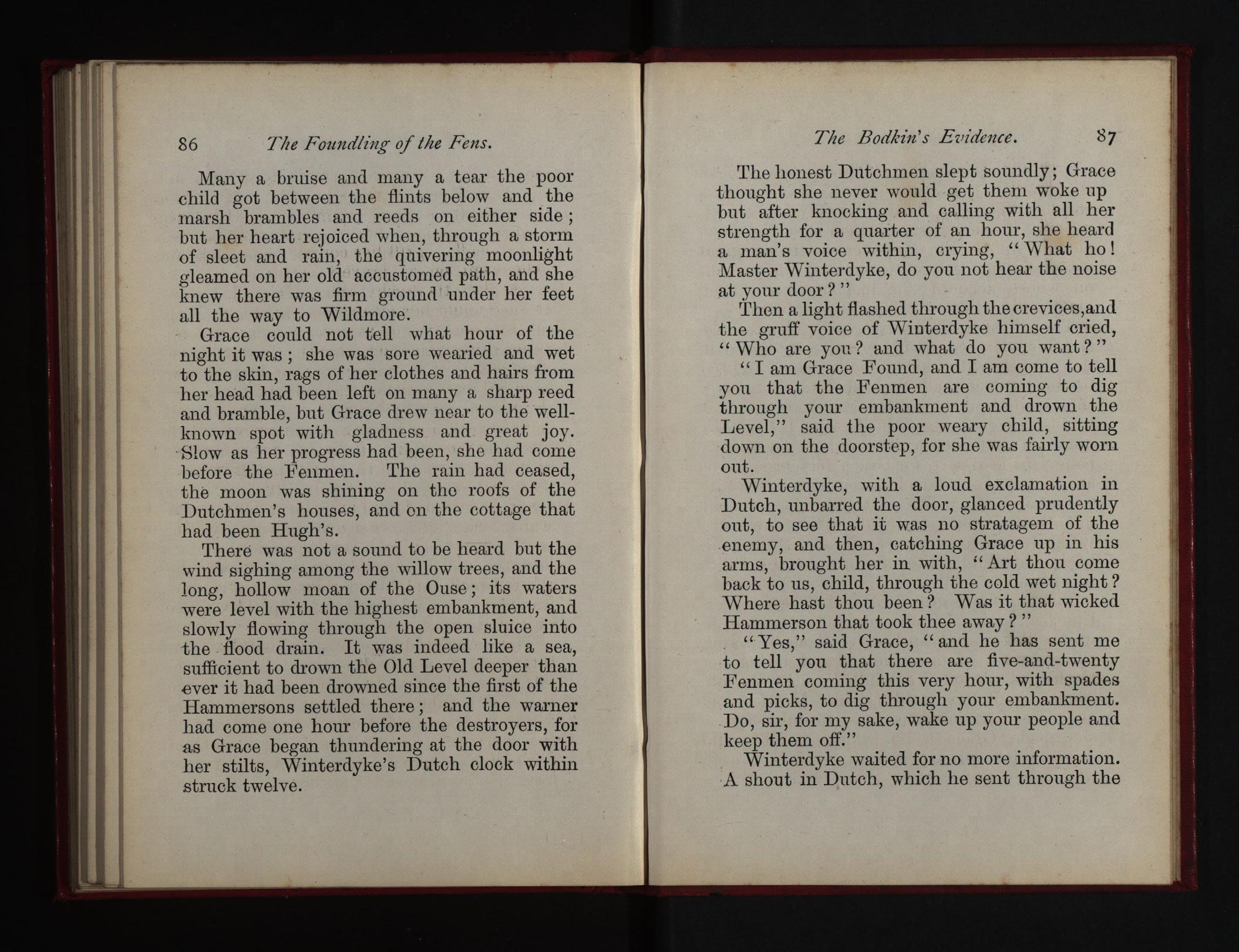
The honest Dutchmen slept soundly; Grace thought she never would get them woke up but after knocking and calling with all her strength for a quarter of an hour, she heard a man's voice within, crying, "What ho! Master Winterdyke, do you not hear the noise at your door? "
Then a light flashed through the crevices ,and the gruff voice of Winterdyke himself cried, "Who are you? I:Lnd what do you want?"
" I am Grace Found, and I am come to tell yon that the Fenmen are coming to dig through your embankment and drown the Level," said the poor weary child, sitting down on the doorstep, for she was fairly worn out.
Winterdyke, with a loud exclamation in Dutch, unbarred the door, glanced prudently out, to see that it was no stratagem of the enemy, and then, catching Grace up in his arms, brought her in with, ;, Art thou come back to us, child, through the cold wet night? Where hast thou been? Was it that wicked Hammerson that took thee away? "
" Yes," said Grace, "and he has sent me to tell you that there are five-and-twenty Fenmen coming this very hour, with spades and picks, to dig through your embankment. Do, sir, for my sake, wake up your people and keep them off."
Winterdyke waited for no more information. A shout in Dutch, which he sent through the
[8 Tlte Foundling- of the .Fe1ls.
whole house, brought all his people out of their beds in a few minutes. Grace saw Sena and the old woman looking terribly frightened; and out of some corner, where they had been putting up fOl; the night, came, to .her great astonishment, the gentleman and hIS servant on whose account she had met with such great indignation in " The G?ose."
They busied themselves wIth and his men, going from house to house m the Level with loud shouts and lighted torches, rousing all the inhabitants to arm themselves and defend the embankments. It was strange to see the flare and hear the noise on that deep winter night. believed the report, for Grace had brought It, and Grace Found had never been known to tell a falsehood. The Dutchmen, thus woke up, turned out with all their weapons, valiantly ranged themselves along the embankments, and waited for the coming foe in . so bel' silence.
The night had grown calm and clear by this time, and the Dutchmen had not long to wait. Within half an hour of Grace's arrival, while she sat warming herself and drying her clothes at a good fire kindled up by the old woman and her maid (Dame Howfer had never been so gracious to any soul beforeshe made Grace a hot supper, and would scarcely let her eat it for questions); well, while they were sitting there, ·with the door
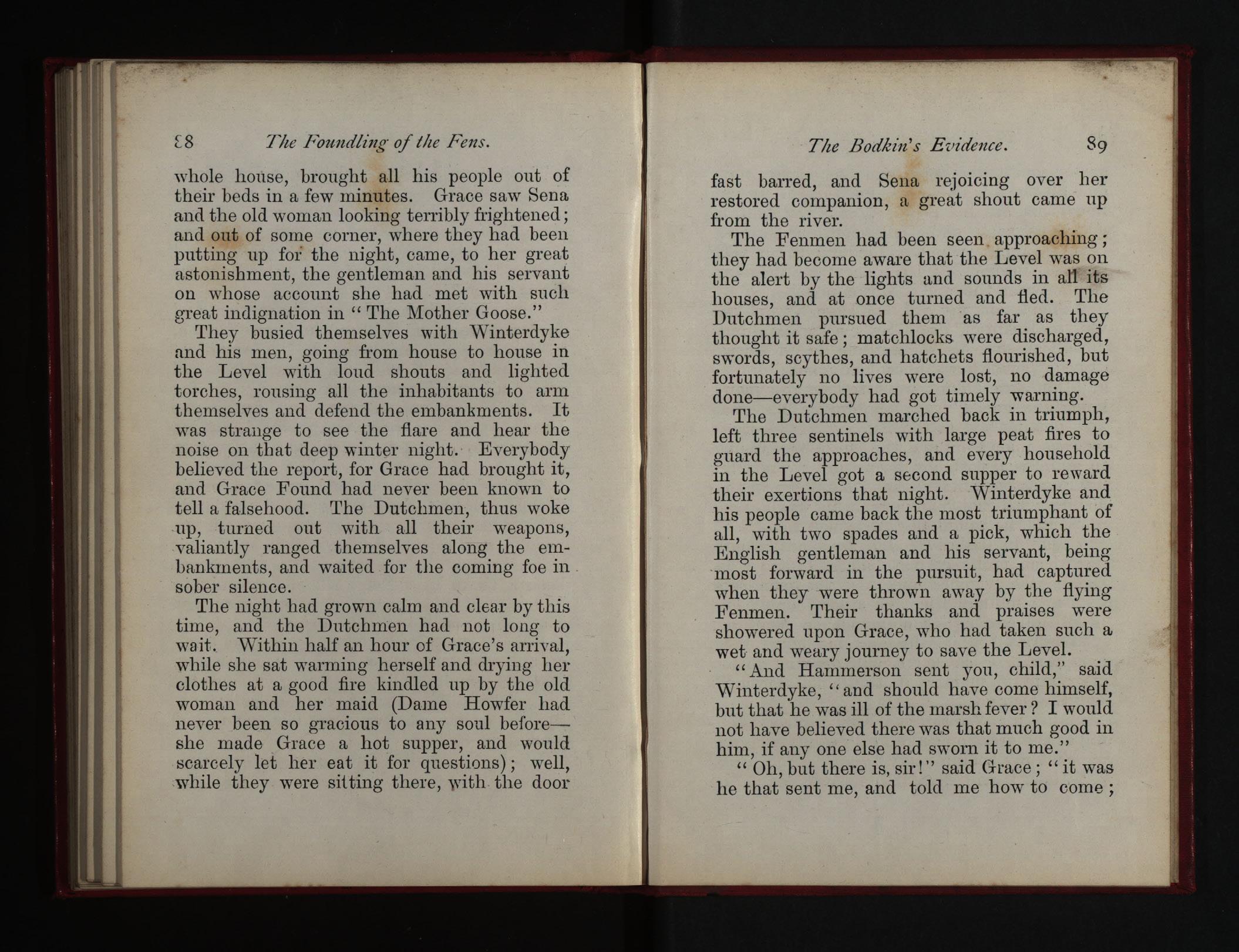
The Bodkin's EZIl"dence. 89 fast barred, and Sena rejoicing over her restored companion, a great shout came up from the river.
The Fenmen had been seen approaching; they had become aware that the was ?n the alert by the lights and sounds m an Its houses and at once turned and fled. The pursued them as far. as they thought it safe· matchlocks were dIscharged, swords, and hatchets flourished, but fortunately no lives were .lost, no d.amage done-everybody had got tImely warnmg.
The Dutchmen marched back in triumph, left three sentinels with large peat fires to guard the approaches, and every household in the Level got a s€;cond supper to reward their exertions that night. Winterdyke and his people came back the most. of all, with two spades and a pICk, WhICh English gentleman and his servant, bemg ·most forward in the pursuit, had captured when they were thrown away by flying Fenmen. Their thanks and praIses were showered upon Grace, who had taken such a wet and wea.ry journey to save the Level.
"And Hammerson sent you, child," said Winterdyke, Cc and should have come himself, but that he was ill of the marsh fever? I would not have believed there was that much good in him, if anyone else had it to me.':
" Oh, but there is, sir! I, saId Grace; "It was he that sent me, and told me how to come;
90 The Foundlt·ng of the Fens.
surely you'll give him back his cottage now, and all the geese you haven't eaten, for you know they are his own. vVon't you help to get them back, sir?" she continued to Sir George Barclay, who stood looking at her with manifest interest. " I can show you the short way between this and Rushton now."
" Thank you, my girl, but I don't want the way to Rushton," said Sir George, smiling; "but I am sure Mr. Winterdyke does not wish to keep your father's house and goods."
" I am sure I don't want to keep any man's house and goods," said Winterdyke, his broad face getting red as the fire, for Sir George's eye was upon him, and the Dutchman wished to stand well with his future lord; ee nothing but honest gettings for me: but there was no dealing with that Hammerson, he would have murdered, he would have drowned us all."
" Well, he has saved your lives now; there have been faults on both sides, I fancy: let bygones be bygones, and give the man back his own; build another house for yourself, and I will give Hugh Hammerson a farm out of the Level which he and his brave little daughter have saved; it will descend to her .after him in memory of that good service" said Sir George. '
" And, Mr. Winterdyke," said Grace, catching at the great opportunity, "won't you give me back my bodkin now? "
,e That I will," said the Dutchman (the
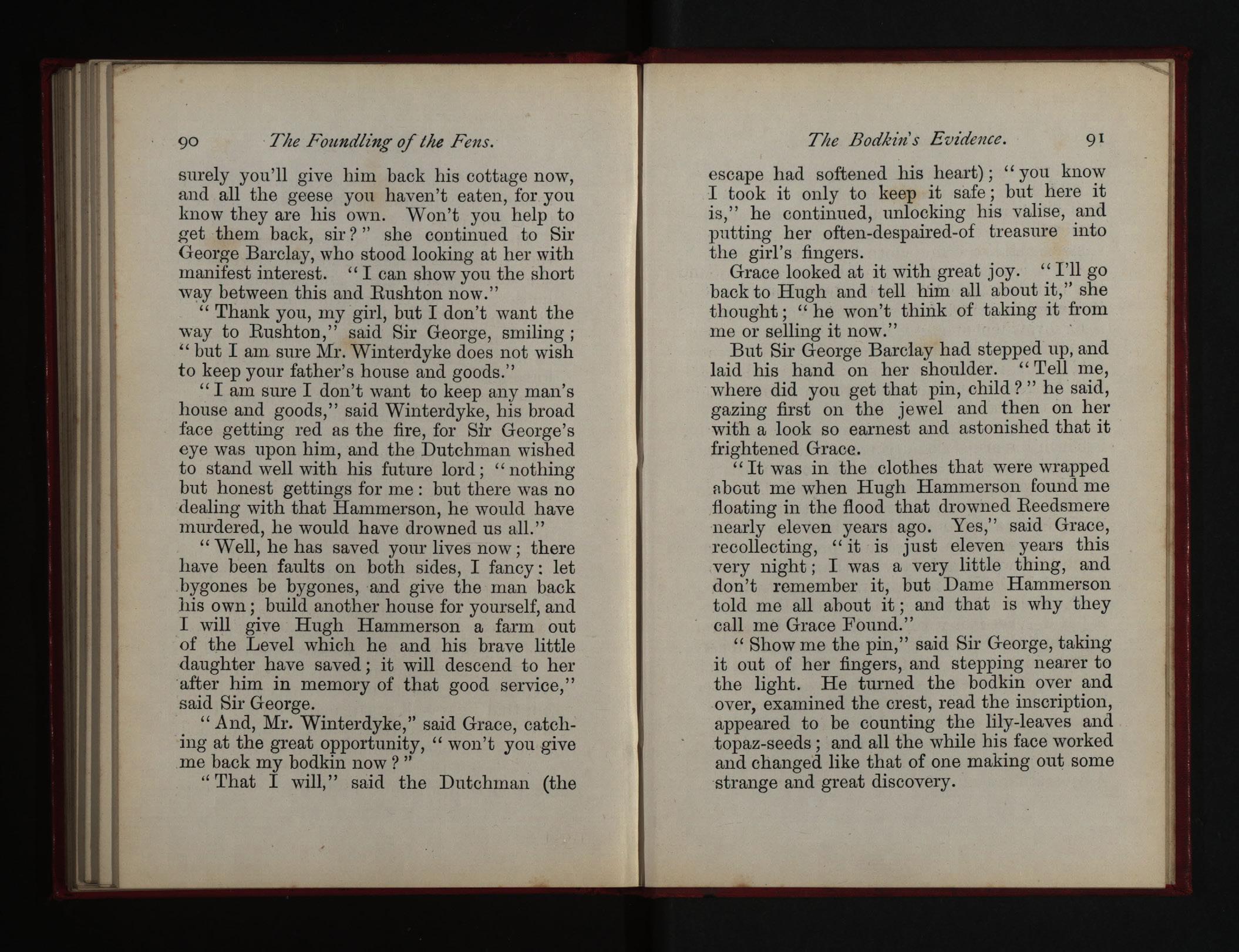
The Bodkin's Evidence.
escape had softened his heart); "you know I took it only to keep it safe; but here it is," he continued, unlocking his valise, and putting her often-despaired-of treasure into the girl's fingers.
Grace looked at it with great joy. " I'll go back to Hugh and tell him all about it," she thought; "he won't think of taking it from me or selling it now." .
But Sir George Barciay had stepped up, and laid his hand on her shoulder. "Tell me, where did you get that pin, child? " he said, gazing first on the jewel and then on her with a look so earnest and astonished that it frightened Grace.
" It was in the clothes that were wrapped nbGut me when Hugh Hammerson found me floating in the flood that drowned Reedsmere nearly eleven years ago. Yes," said Grace, recollecting, "it is just eleven years this very night; I was a very little thing, and don't remember it, but Dame Hammerson told me all about it; and that is why they call me Grace Found."
" Show me the pin," said Sir George, taking it out of her fingers, and stepping nearer to the light. He turned the bodkin over and over, examined the crest, read the inscription, appeared to be counting the lily-leaves and topaz-seeds; and all the while his face worked and changed like that of one making out some strange and great discovery.
Tits Foundling" of the Fells.
Then he made a sign to Grace to come aside with him, questioned her on the whole story of her being found in the flood, heard all the particulars of the ship that went to pieces the same night, the fine clothes that wore wrapped about her, and how Dame Hammerson found the bodkin sticking in the fur collar of one of them, and warned her never to part with it; for Providence might make it the instrument of finding her friends H.nd relatives. Grace told all as clearly as she could, and then, looking up into his still working face, "Is the bodkin yours, sir?"
" It is, my child, " said Sir George, clasping her in his arms, "and you are mine, too; your name is not Grace Found, but Christina Barclay, my only daughter, and the heiress of all my property. Listen: I got this bodkin made by a fam0us goldsmith of Amsterdam; it was one of my wedding presents to your mother, who was a lady of that town. There is good Dutch blood in your veins, my girl; no wonder you took so kindly to the Hollanders. I had served as a volunteer in the Dutch war against the Spaniards; it was waged for liberty and religion; and in it I won the crest which I haye worn ever since, and which you see engraved on this bodkin. The valiant Stadtholder, Prince of Orange, himself conferred it on me, he was pleased to say, for signal services.
" Your mother and I were married in Amsterdam, and remained there for nearly
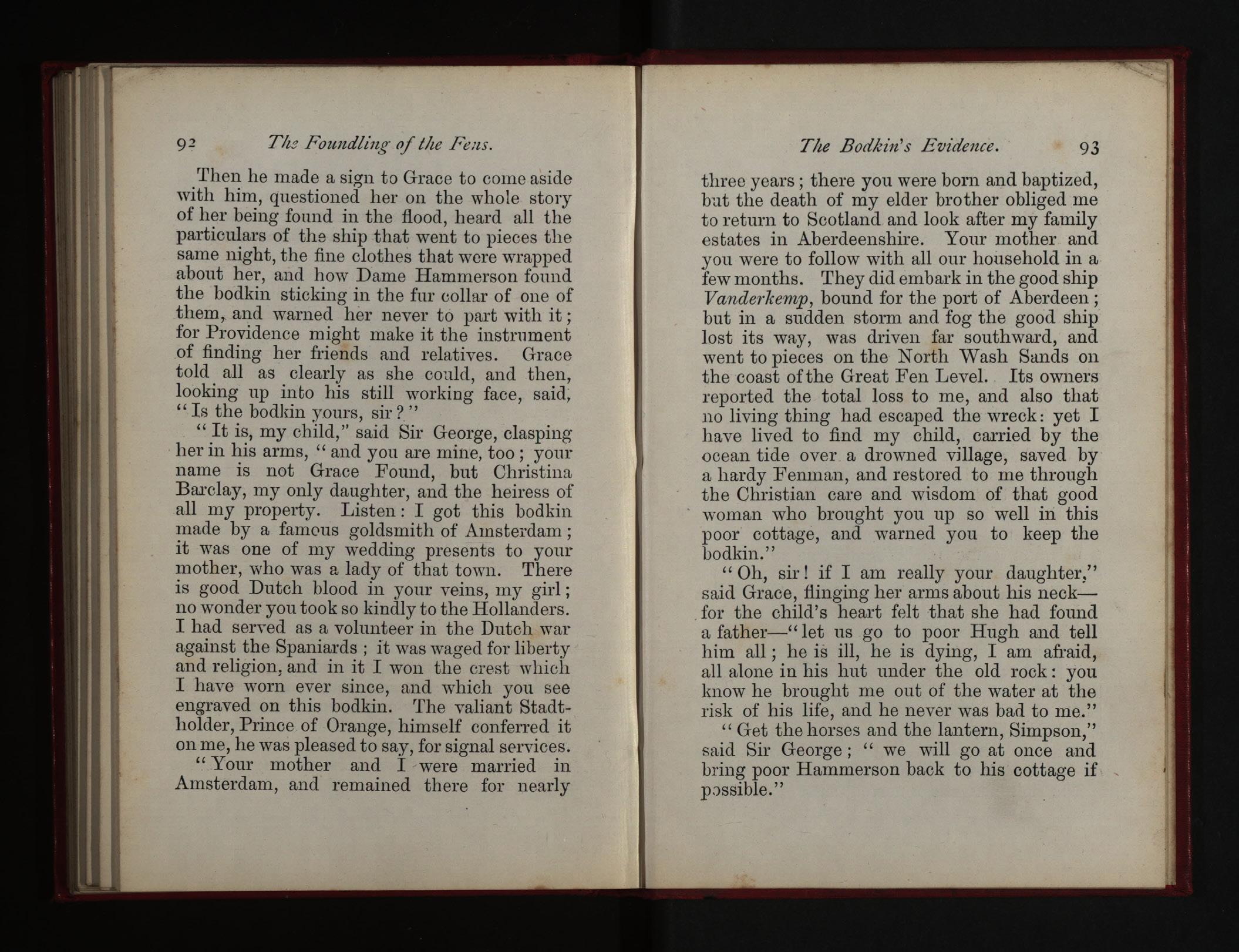
The Bodkin's Evidence. 93
three years; there you were born and baptized, but the death of my elder brother obliged me to return to Scotland and look after my family estates in Aberdeenshire. Your mother and you were to follow with all our household in a few months. They did embark in the good ship Vanderkemp, bound for the port of but in a sudden storm and fog the good shIp lost its WH.Y, was driven far southward, and went to pieces on the North Wash Sands on the coast of the Great Fen Level. Its owners reported the total loss to me, and also that no living thing had escaped the wreck: yet I have lived to find my child, carried by the ocean tide over a drowned village, saved by a hardy l i'enman, and restored to me through the Christian care and wisdom of that good woman who brought you up so well in this poor cottage, and warned you to keep the bodkin."
"Oh, sir! if I am really your daughter," said Grace, flinging her arms about his neckfor the child's heart felt that she had found a father-CC let us go to poor Hugh and tell him all; he is ill, he is dying, I am afraid, all alone in his hut under the old rock: you know he brought me out of the water at the risk of his life, and he never was bad to me."
" Get the horses and the lantern, Simpson," said Sir George; " we will go at once and bring poor Hammerson back to his cottage if pJssible. "
Before Winterdyke and his people could recover from their astonishment, or comprehend what they meant, the party, consisting of some acti ve and trusty men called up from the Level, Sir George, his servant, and Gracewho would not stay behind, weary as she was, for who else should show the way or carry the joyful intelligence to poor Hugh '?- all set out for Rushton, with lanterns, stilts, and torches.
The horses had to be left behind at the edge of the mere, but the journey was made with haste and safety; and as Grace opened the door of the hut and stepped in, the last light of the fire which she had heaped so high showed her Hugh Hammerson feebly raising himself and saying, with clasped hands, " God be praised that you are come back, child! are the Dutch drainers safe?"
"They are safe and well, an d here is a gentleman come to befriend you and me," said Grace.
"The man I wouldn't show the short way to Wildmore," said Hugh, as he caught sight of Sir George. " I am sorry for it, sir, but I was angry and ill-minded at the time."
" You have done me and mine service enough to wipe out that, and a great deal more," said Sir George, entering at once into explanations, and hearing from Hugh a full confirmation of all that Grace had told him. He finished by declaring her to be his only daughter.
The sick man was removed, as soon as day-
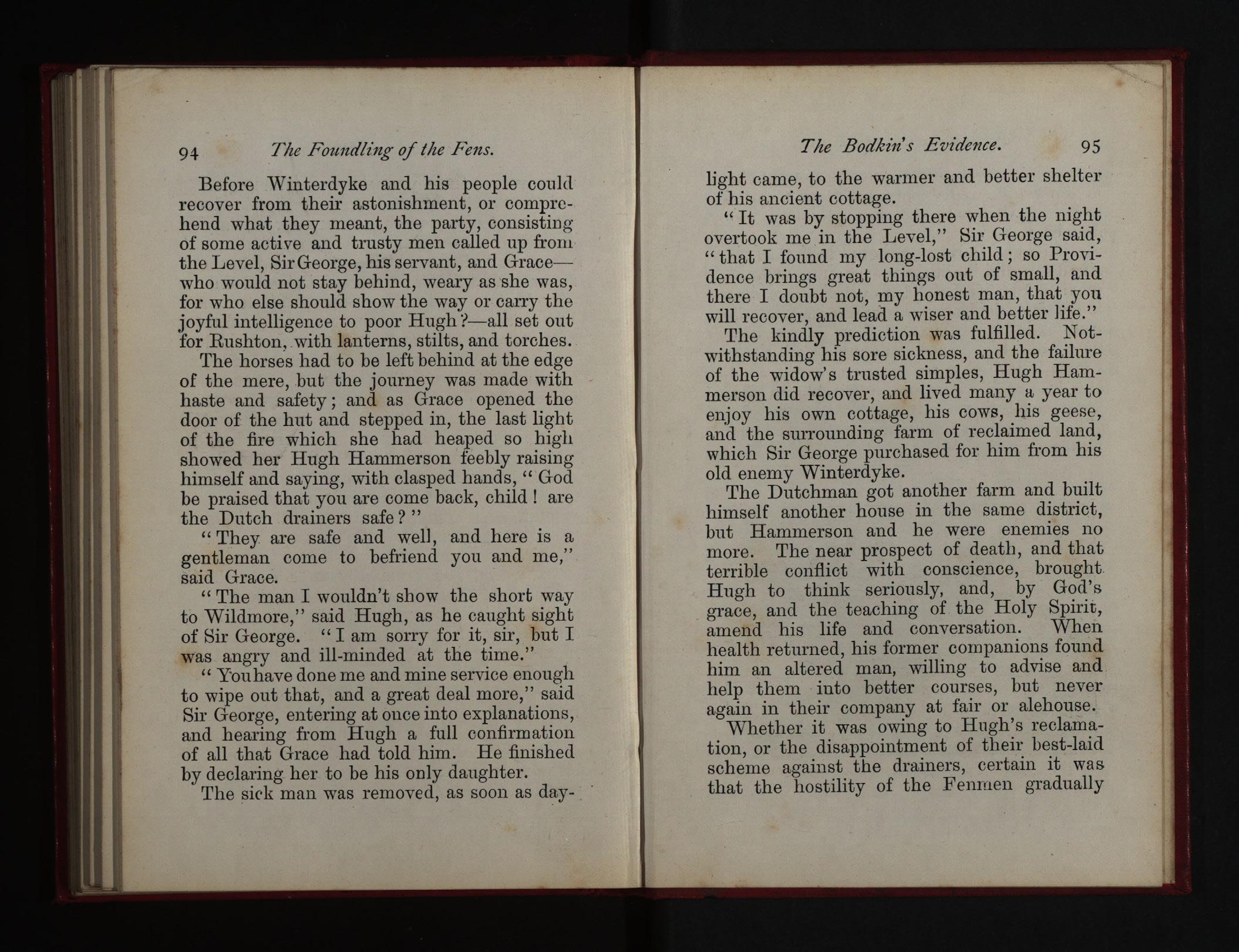
The Bodkin's Evidence. 95 light came, to the warmer and better shelter of his ancient cottage.
"It was by stopping there when the night overtook me in the Level," Sir Geol'ge said, "that I found my long-lost child; so Providence brings great things out of small, and there I doubt not, my honest man, that you will recover, and lead a wiser and better life."
The kindly prediction was fulfilled. N otwithstanding his sore sickness, and the failure of the widow's trnsted simples, Hugh Hammerson did recover, and lived many a. year to enjoy his own cottage, his cows, his geese, and the surrounding farm of reclaimed land, which Sir George purchased for him from his old enemy Winterdyke.
The Dutchman got another farm and built himself another house in the same district, but Hammerson and he were enemies no more. The near prospect of death, and that terrible conflict with conscience, brought Hugh to think serionsly, and, by God's grace, and the teaching of the Holy Spirit, amend his life and conversation. When health returned, his former companions found him an altered man, willing to advise and help them into better courses, but never again in their company at fair or alehouse.
Whether it was owing to Hugh's reclamation, or the disappointment of their best-laid scheme against the drainers, certain it was that the hostility of the Fenmen gradually
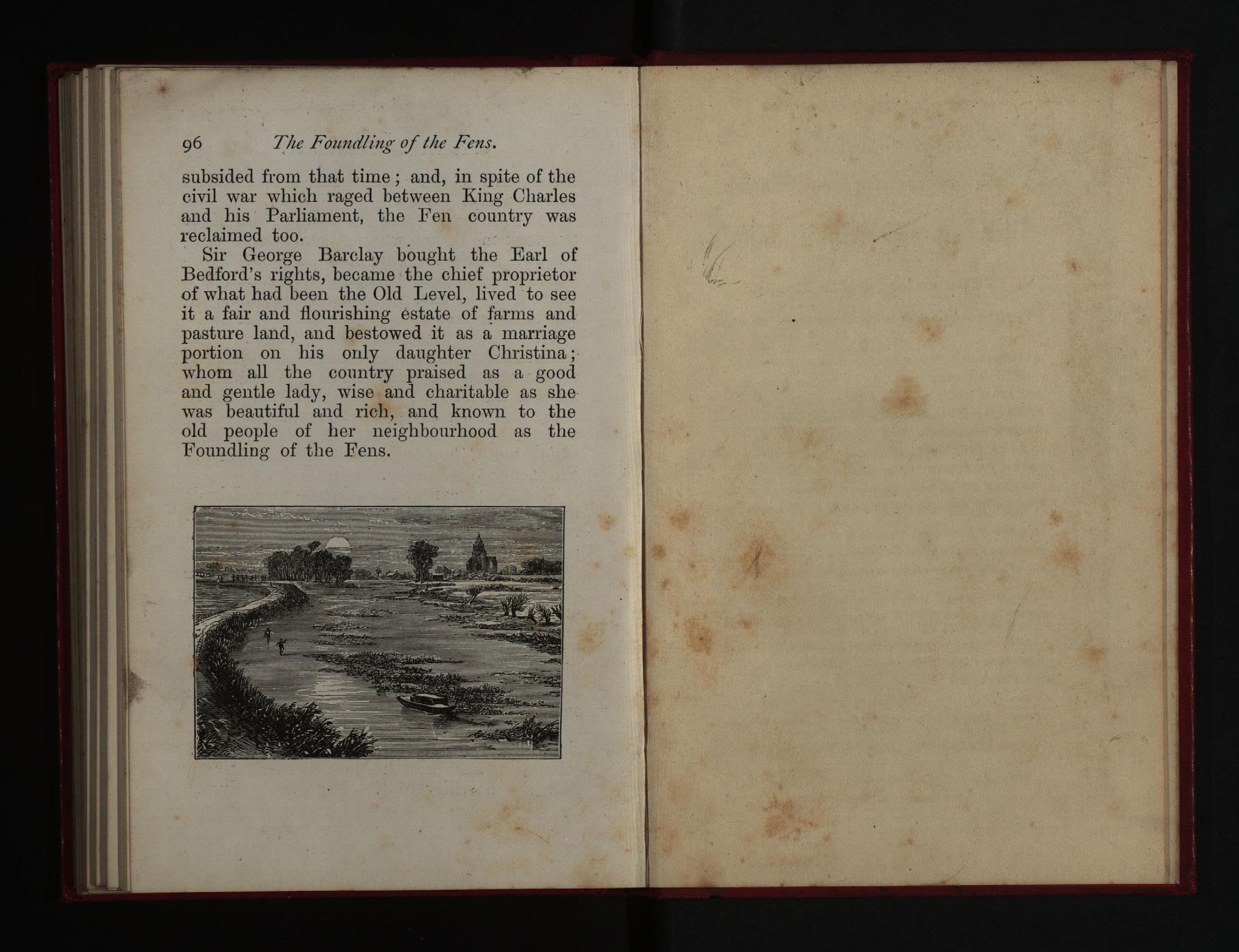
96 The FOlt1tdhng- of the Fens. subsided from that time; and, in spite of the civil war which raged between King Charles and his Parliament, the Fen country was reclaimed too.
Sir George Barclay bought the Earl of Bedford's rights, became the chief proprietor of what had been the Old Level, lived to see it a fair and flourishing estate of farms and pasture land, and bestowed it as a maniage portion on his only daughter Christina; whom all the country praised as a good and gentle lady, wise and charitable as she was beautiful and rich, and known to the old people of her neighbourhood as the Foundling of the Fens.
EIGHT SHILLINGS each, in Handsome Cloth, gilt edg<!s.
A USTBA.LIAN PICTURES. By HOWARD W,LLOUGHBY. 8s.
OANADIAN PIOTURES. By the MARQUIS OF LORNE. 8s
ENC.T.ISH PIOTURES. By S. G. GREEN. D.D. 8s
FRENOH PICTURES. By S. G. GREEN. D.D. 8s.
GREEK PIOTURES. By]. P MAHAFFY. M.A. 85.
INDIAN PICTURES. By W,LLlAM URWICK. M.A. 8s.
IRISH PICTURES. By RICHARD LoVETT. M.A. 8s
ITALIAN PIOTURES. By SAMUEL MANNING LL.D. 8s.
THE LAND OF THE PHARAOHS. By SAMUEL MANNING, LL.D. 8s.
LONDON PIOTURES. By R,CHARD LOVETT. M.A. 8s.
NORWEGIAN PICTURES. By R,CHARD LoVETT, M.A. 85.
PIOTrrBES FROJ)1 BIBLE LA NIJS. Edited by S. G. GREEN. D.D. 8•.
PIOTURES FROM HOLLAND. By R. LoVETT, M.A. 8s.
PIOTUR£S FROM THE GERMANFATIlERLAND. By S G. GREEN. D.D 85.
RU8SIAA- PIOTURES. By THOMAS MICHELL, C.B. 85
800TTISH PICTURES. By S. G. GREEN. D.D. 8s.
SEA PICTURES. By ]AMES MACAULAY. MD. 85.
SWISS PICTURES. With IllustratIOns by E. WHVMPER. 8s.
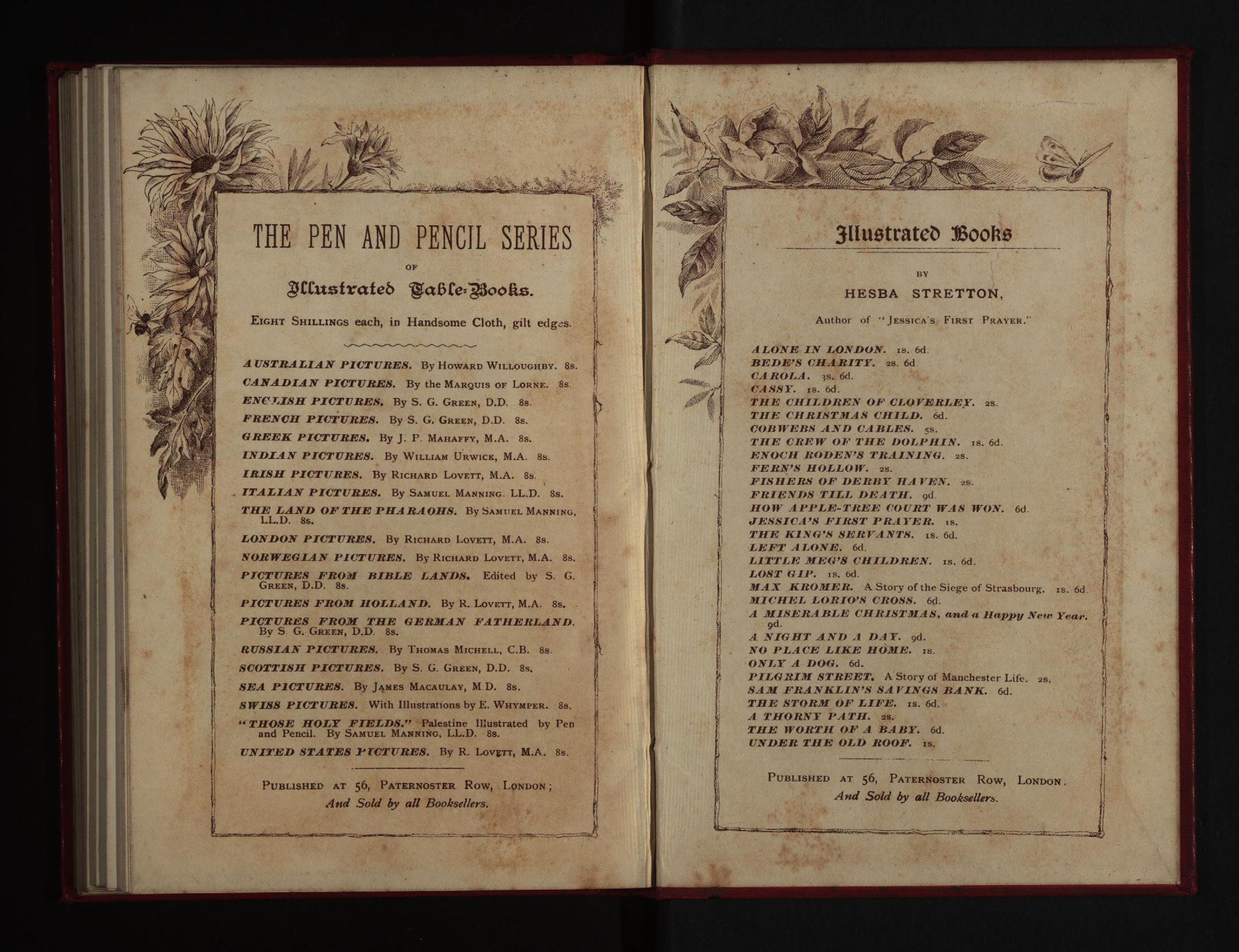
BY HESBA STRETTON.
Author of .. JESSICA!S PRAYER ."
ALONE IN LONIJON. Is.6d BEnE'S OHA RITY. 28. 6d CA RO I.A 18. 6d. CA '''.SY. IS. 6d. TILE OHILDREN 01<' OI.OVERl.E,Y • s. THE f'HRISTIJIAS CIllI.D. 6d. OOBwEB ,., AND CABLES. ss. THE CREW 01<' THE DOI.PHIN. Is.6d. F.NOCH RODEN'S TRAJNING. 25. FEIlN',t; HOLLOW FISHERS OF nEIlllY HA rEN. 2S. FRIENDS TILL .I)}<:ATH. 9d HOW iJPPLE-TREJ<J ('OUR7' WAS WON. 6d JESSIOA'S FIRST PR.IYER. IS. THE KING'.'1 8ERVANTH. ls.6d. LEFT AI.ONE. 6d
LITTLE MEa's C.llll.DREN. Is.6d. LOST IS, od
M.4.X KR01IJ.Ell. A StOl"y of the Siege of Strasbourg. IS. 6d MICIlEI. LORIO'S CROSfi. 6d.
If MISERABLE CHRISTIJIAfi, ana ft Ilnppy New YeaI'. 9 d
u
"THOSE HOLY FIELDS." Palestine U:ustrated by Pen P and Pencil. By SAMUEL MANNING, LL.D. 8s. f \
A. NIGHT .AND A nAY. 9d. NO PL.4CE LIKE HOME. IS ONLY A DOG. 6d. PILGRIM STREET. A Story of Manchester Life. 2S. FRANKLIN'S SA VING.S B.ANK. 6d. THE STORM OF LII"E. IS. 6d. A THORNY PATH• • s. THE WORTH 0.1/ A BABY. 6d. UNDER THE OI.D ROOF. IS.
1 PUBLISHED AT 56, PATERNOSTER Row, LONDON" ; I' UNITED STATES :l'ICTURES. By R. M.A. JS
L And':"l>y
PUBLISHED AT 56, PATERNOSTER Row, LONDON. And Sold by all BookSlller,.
